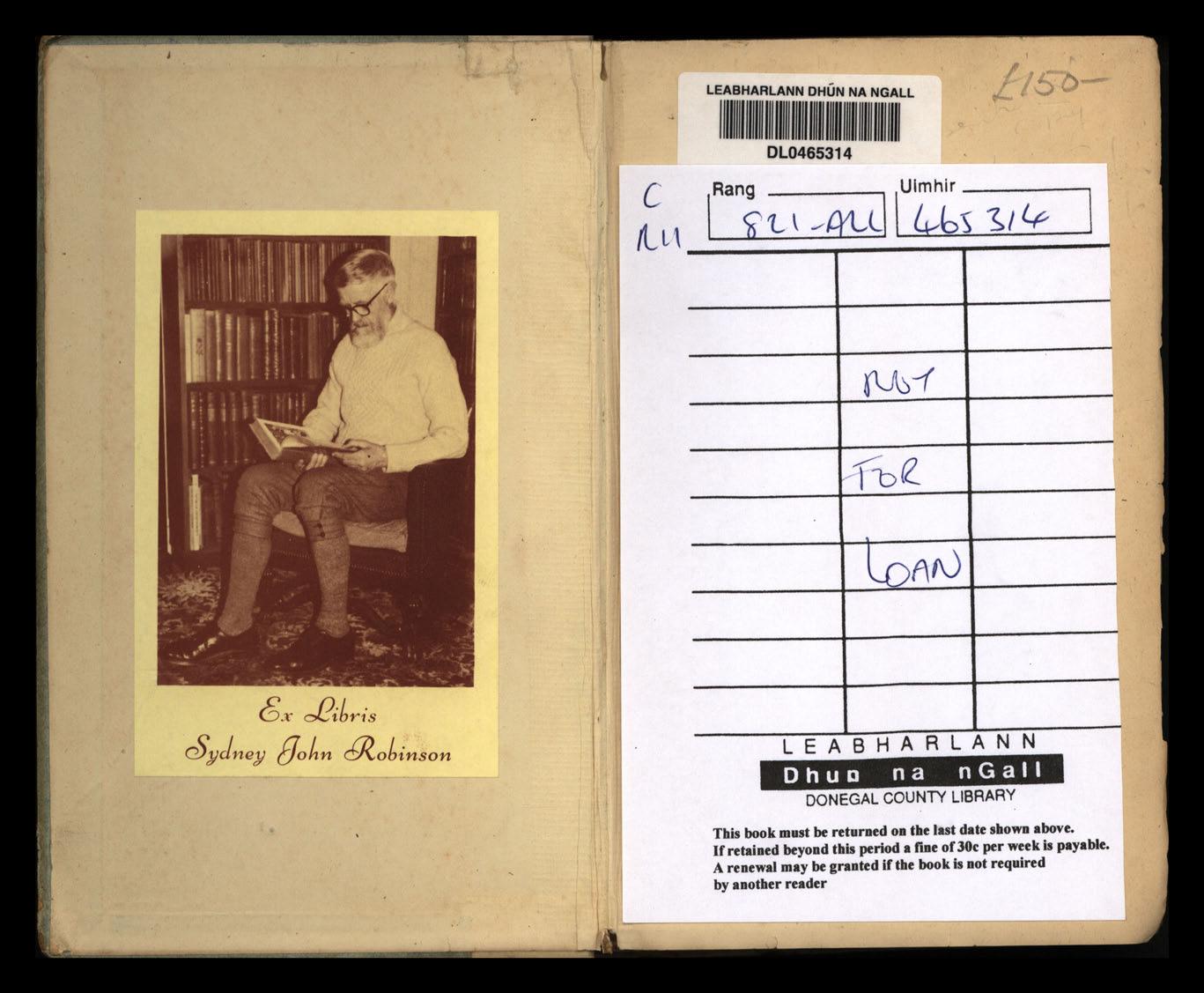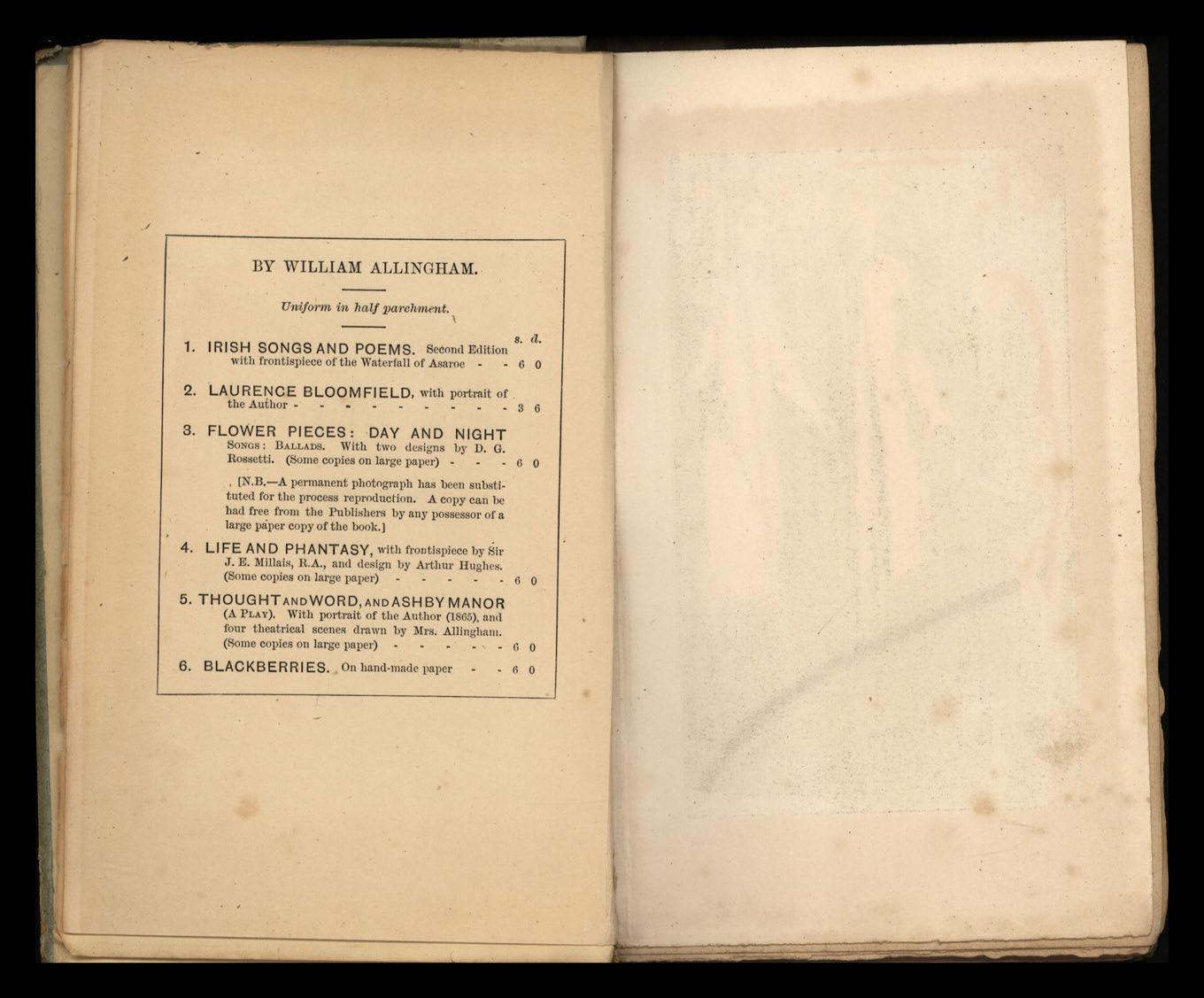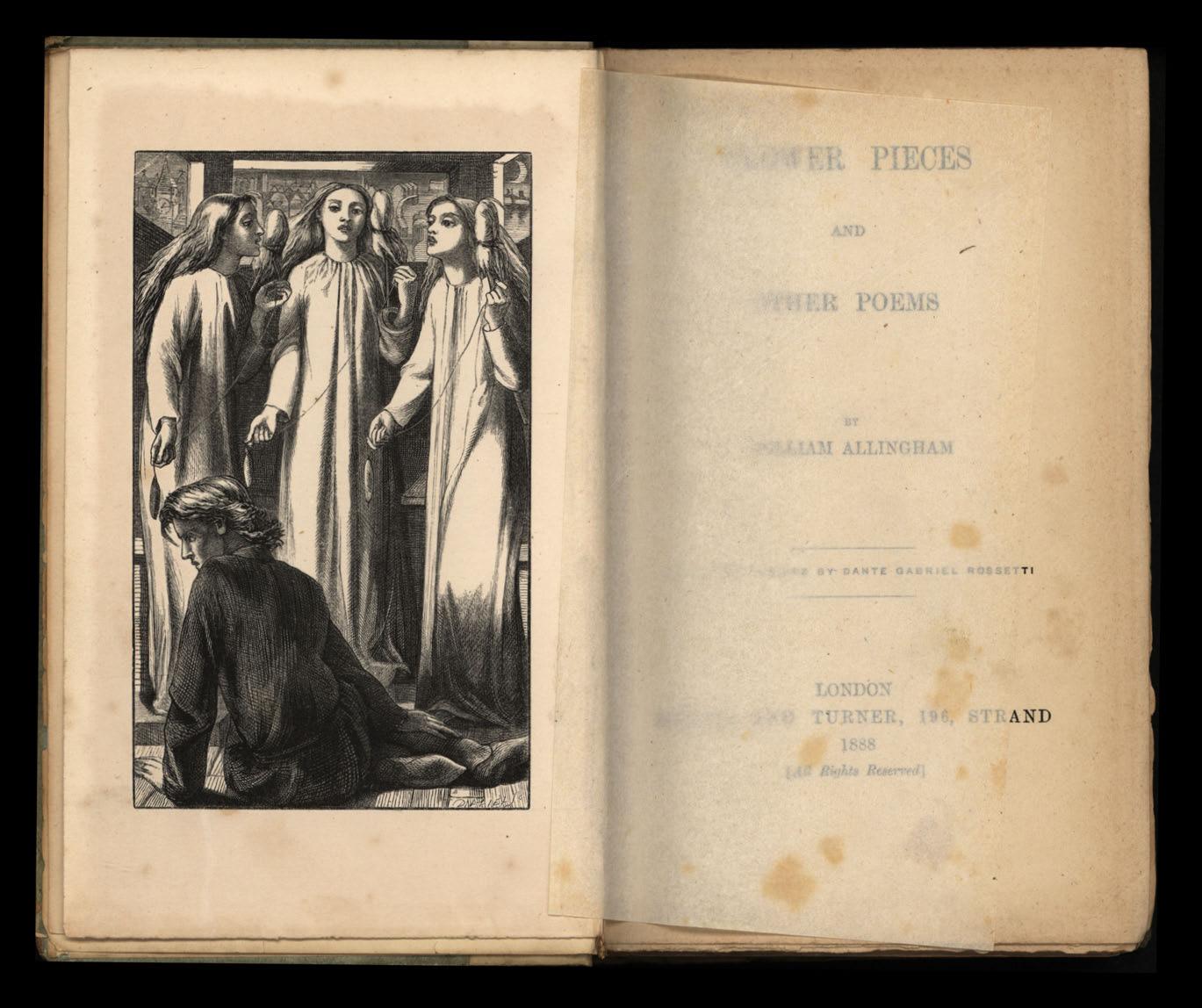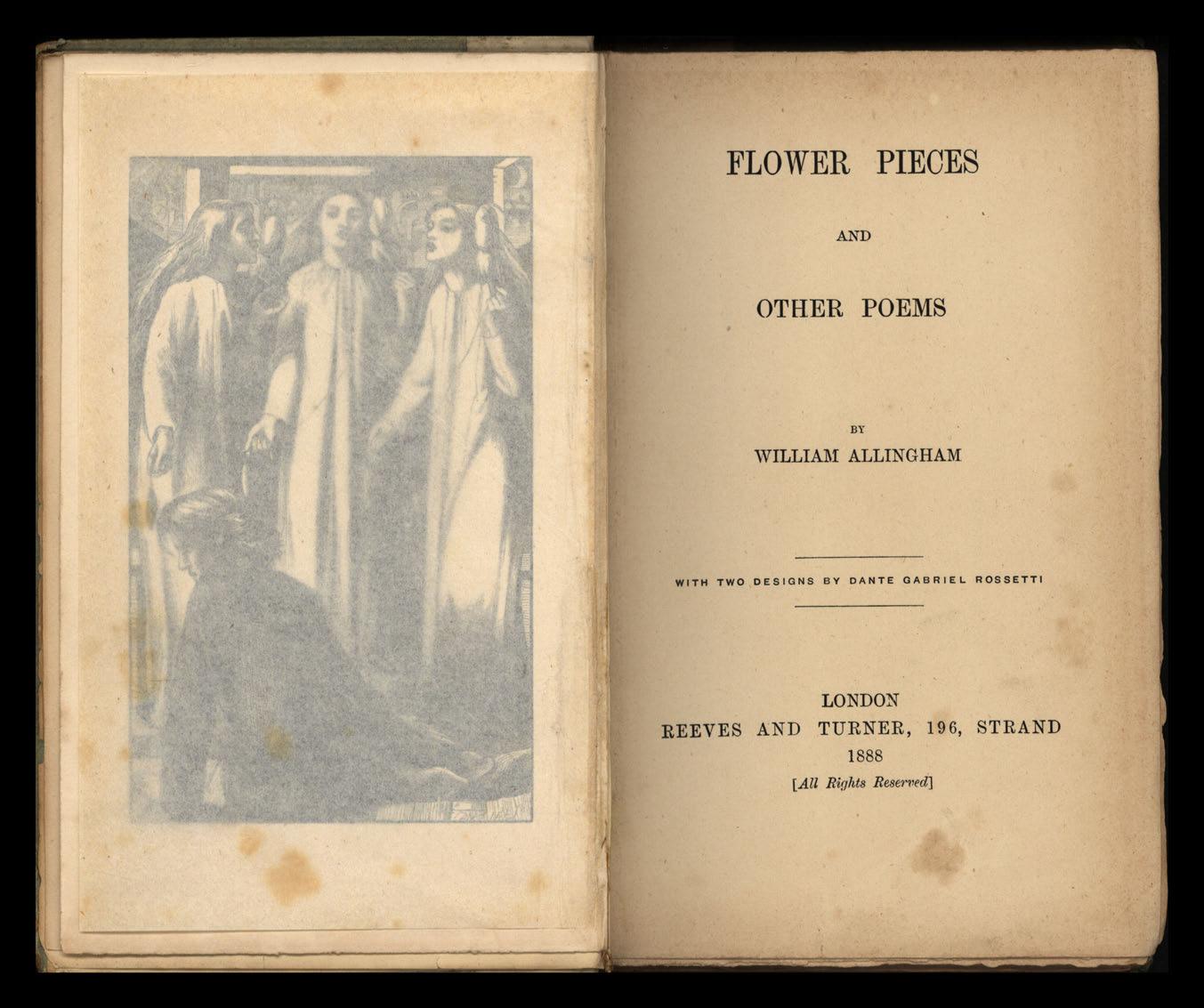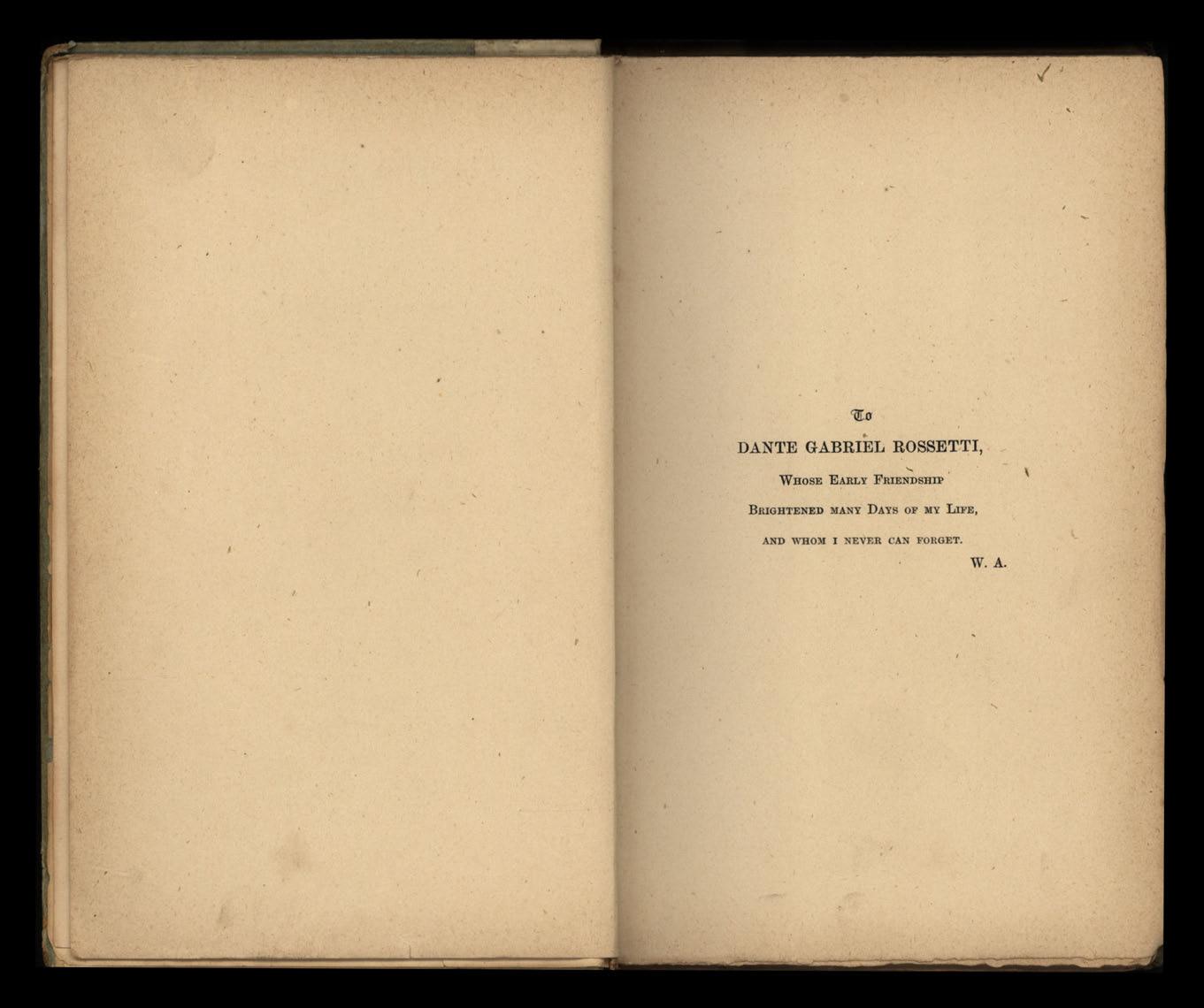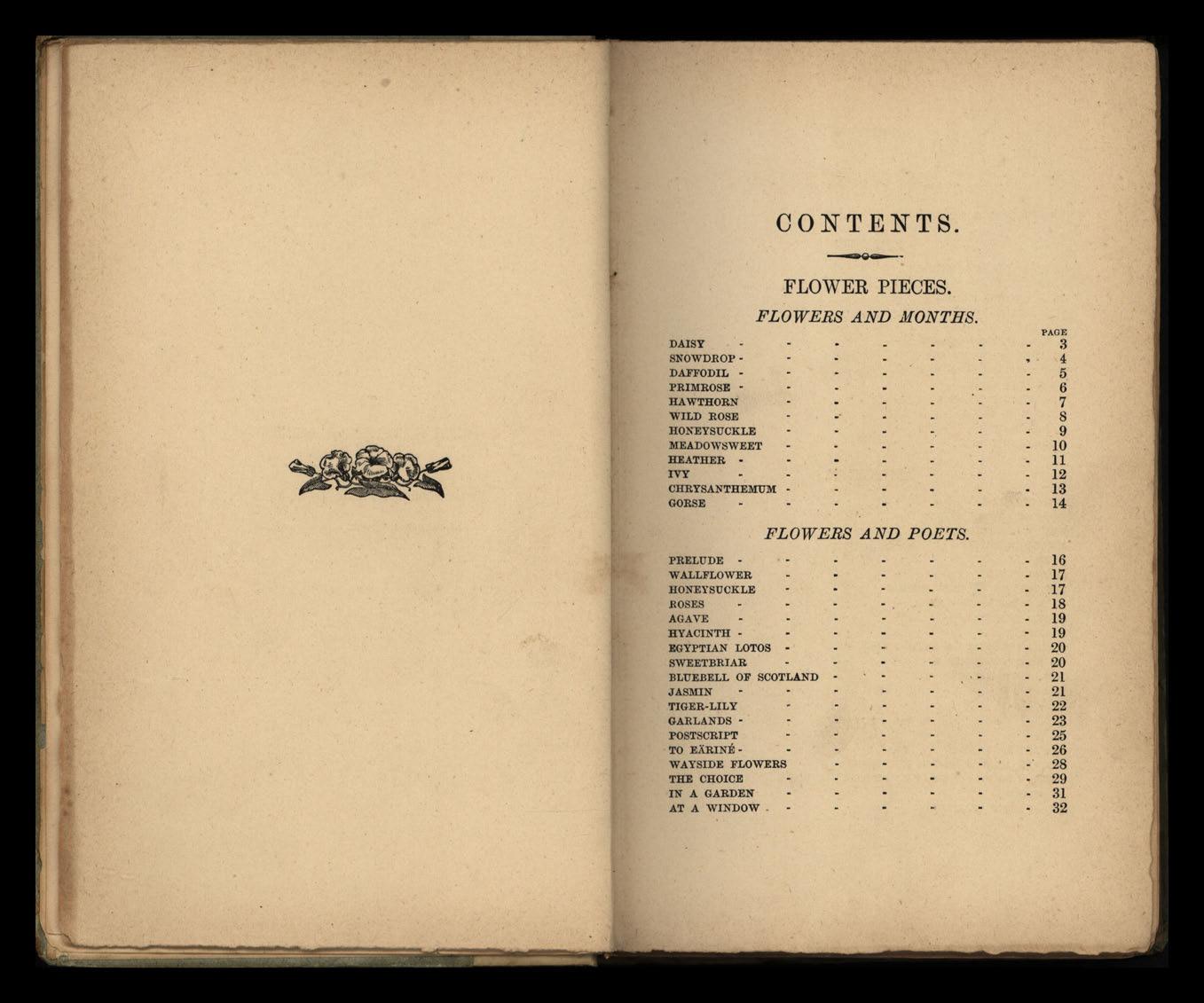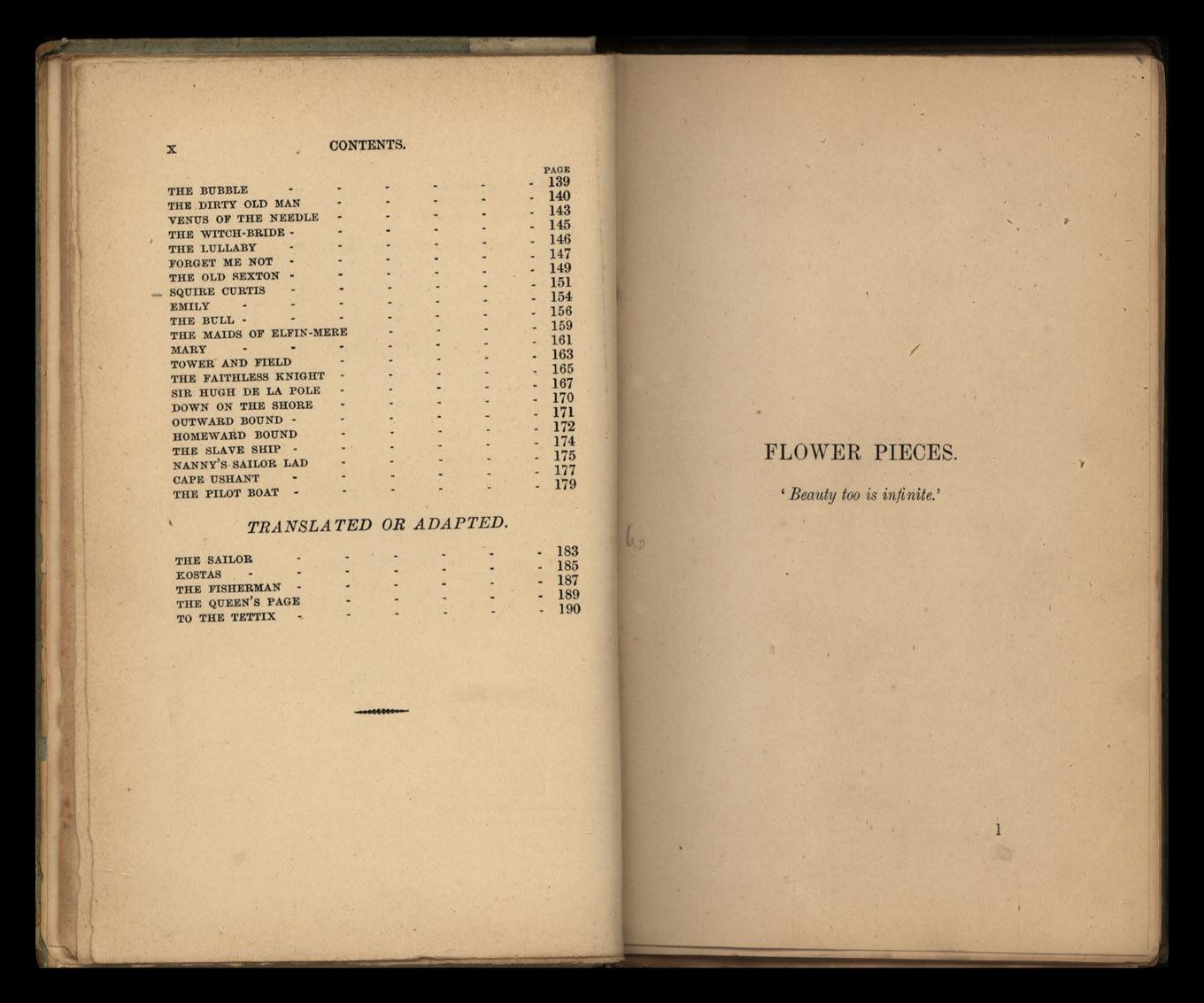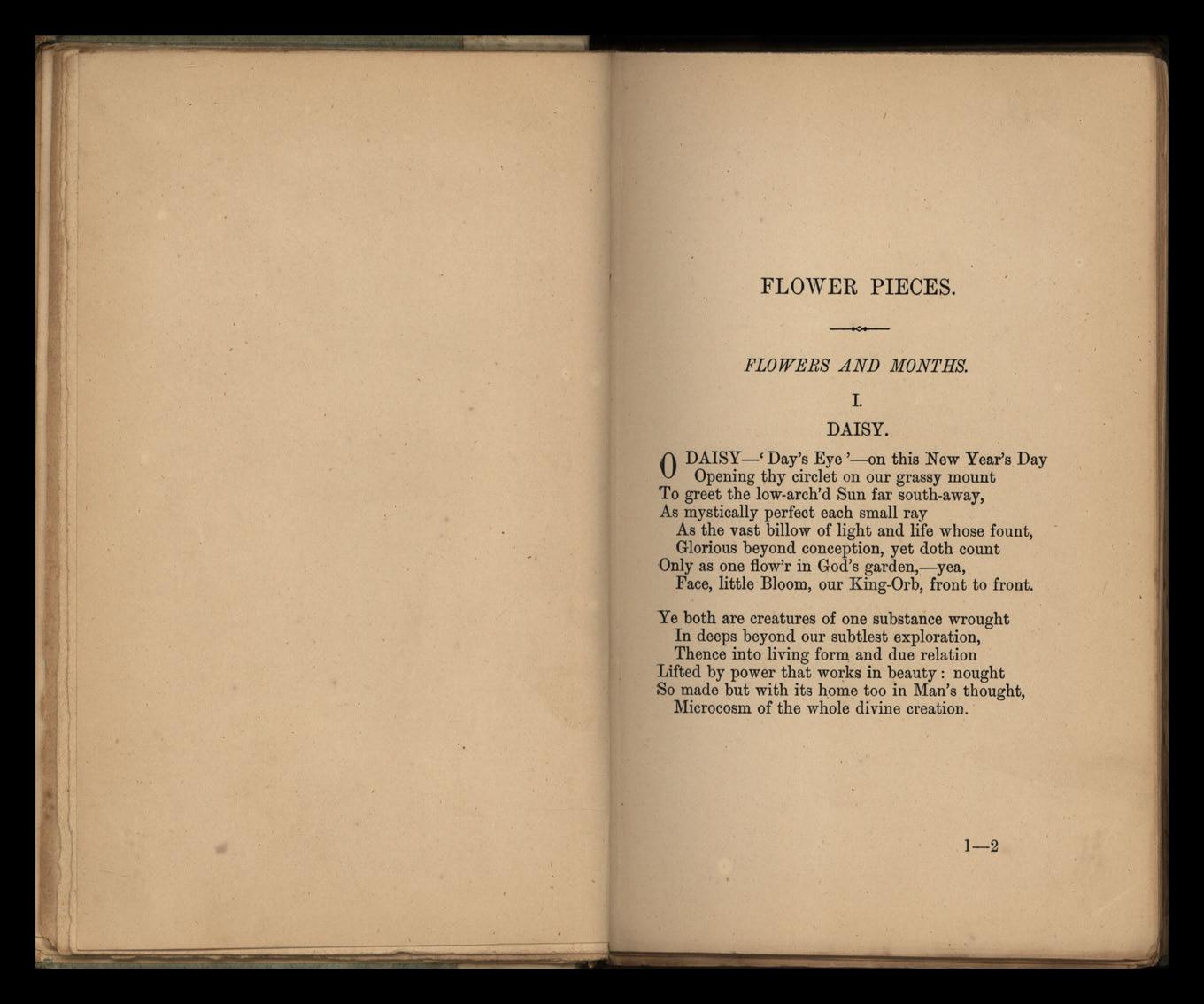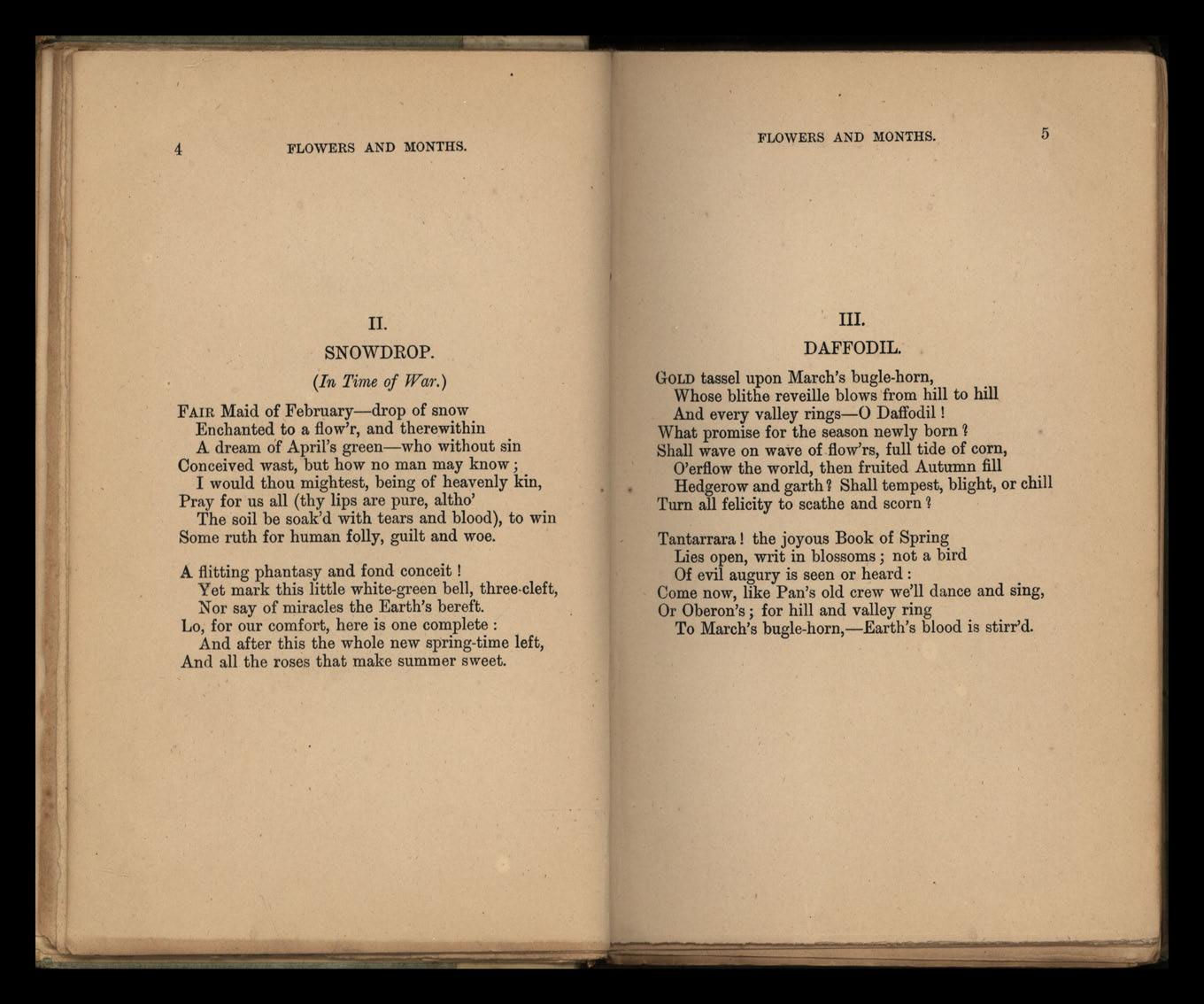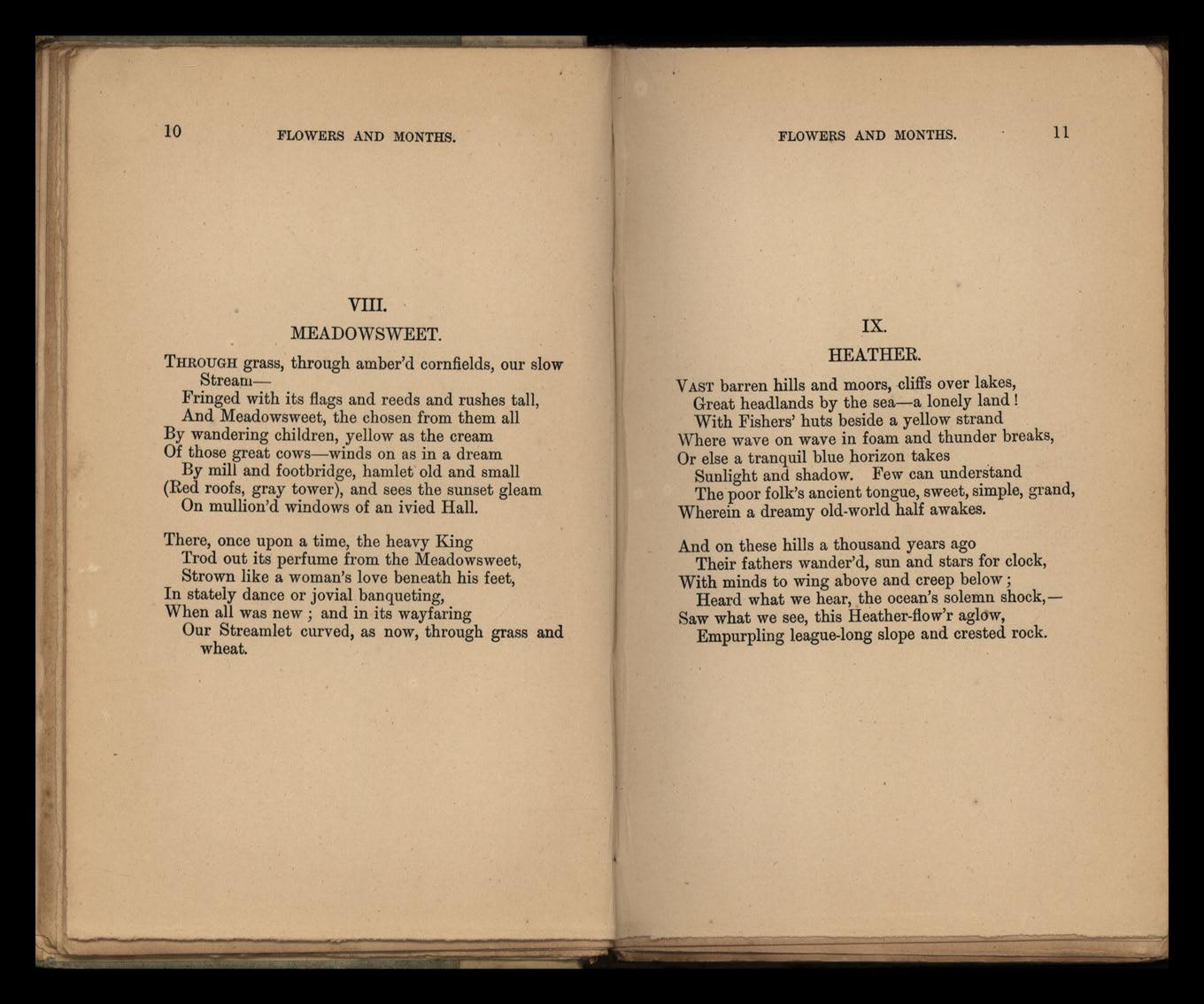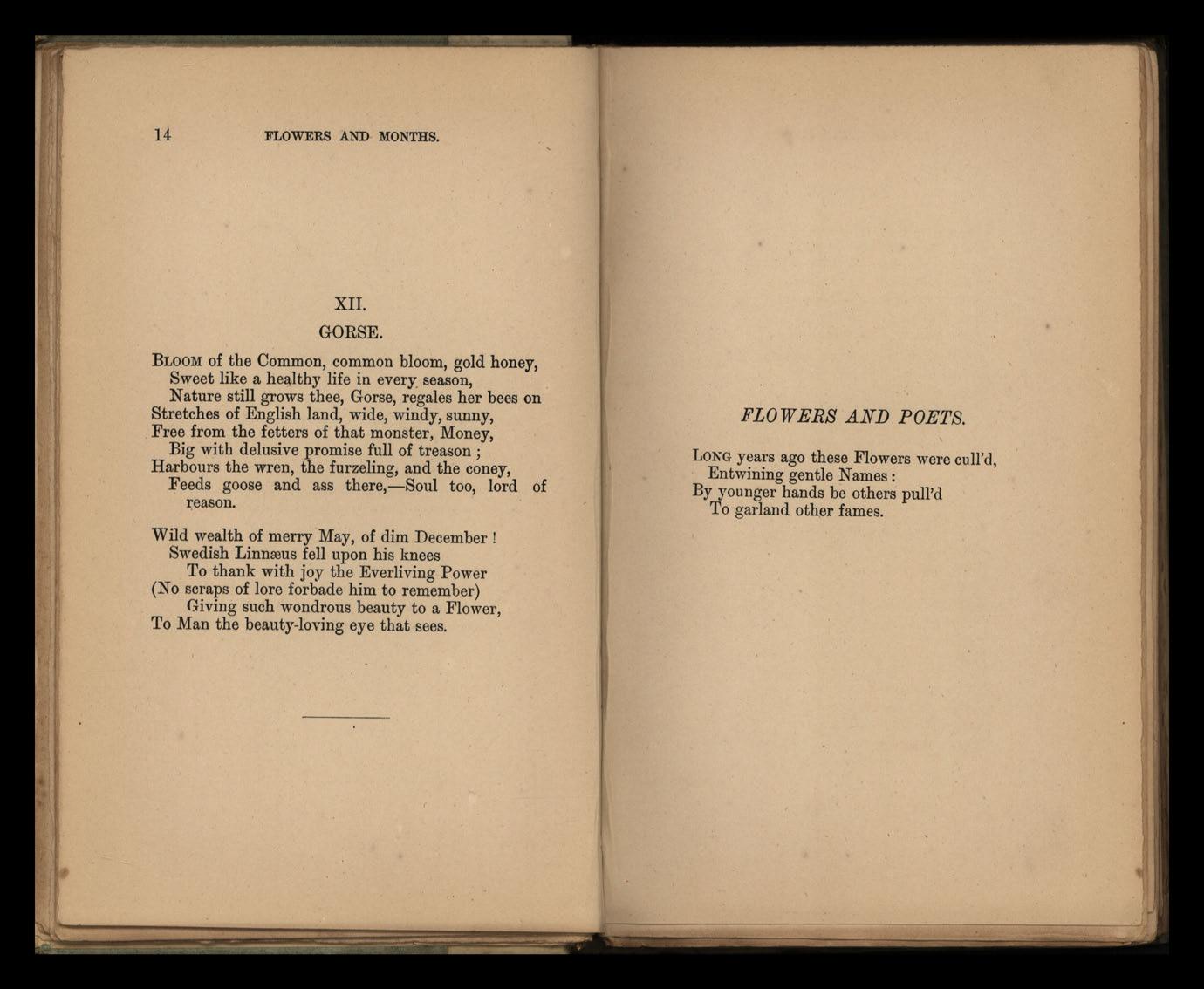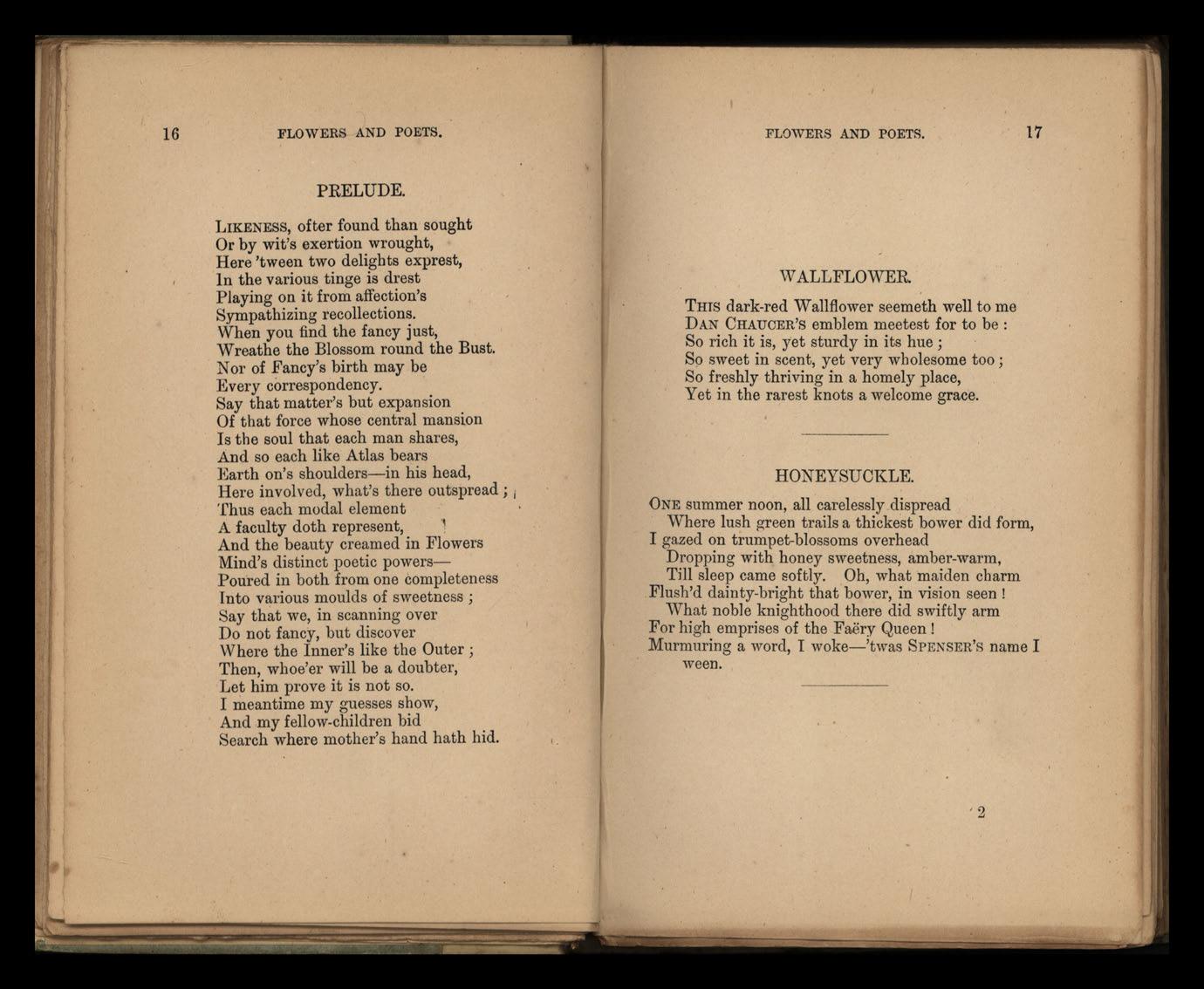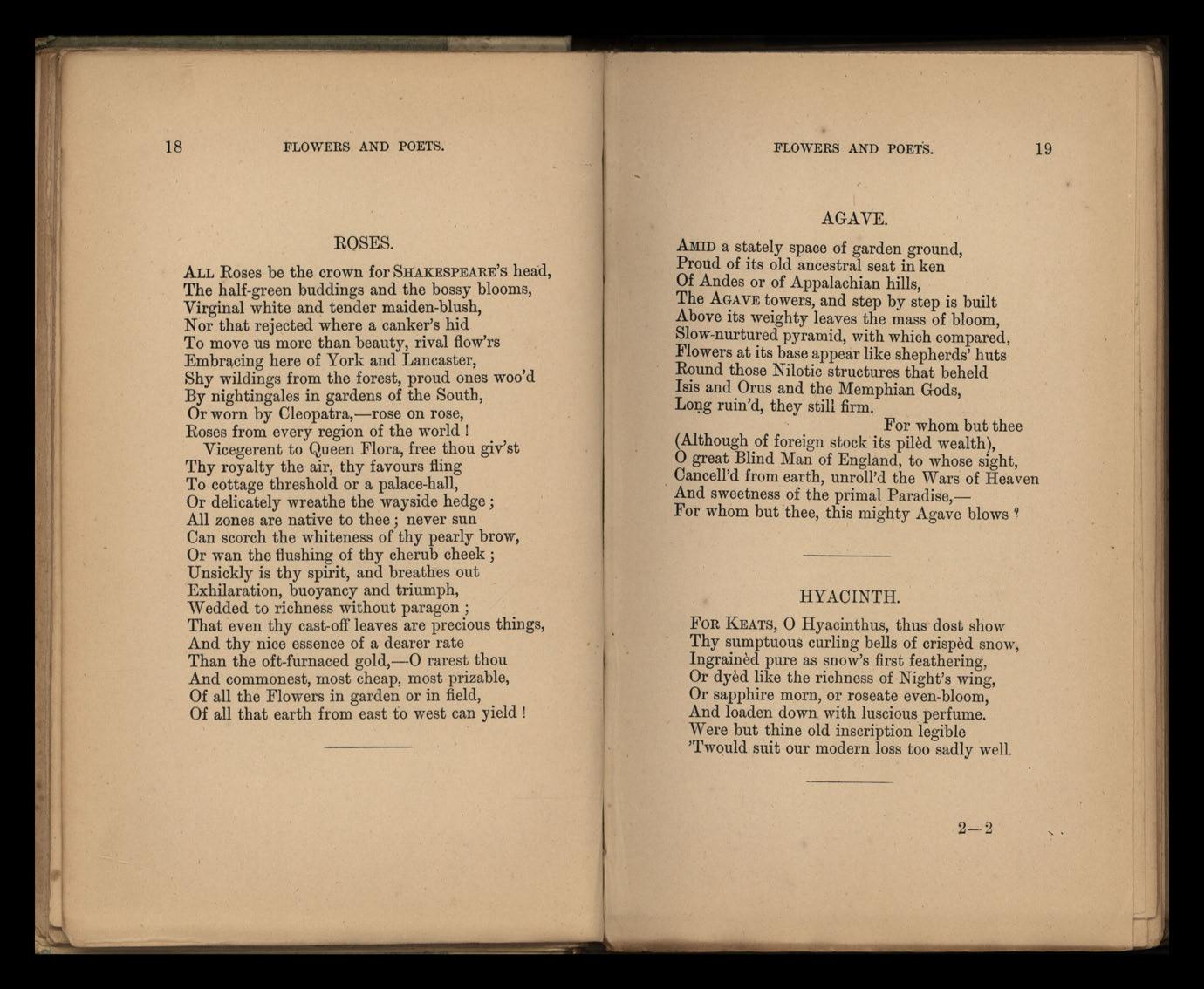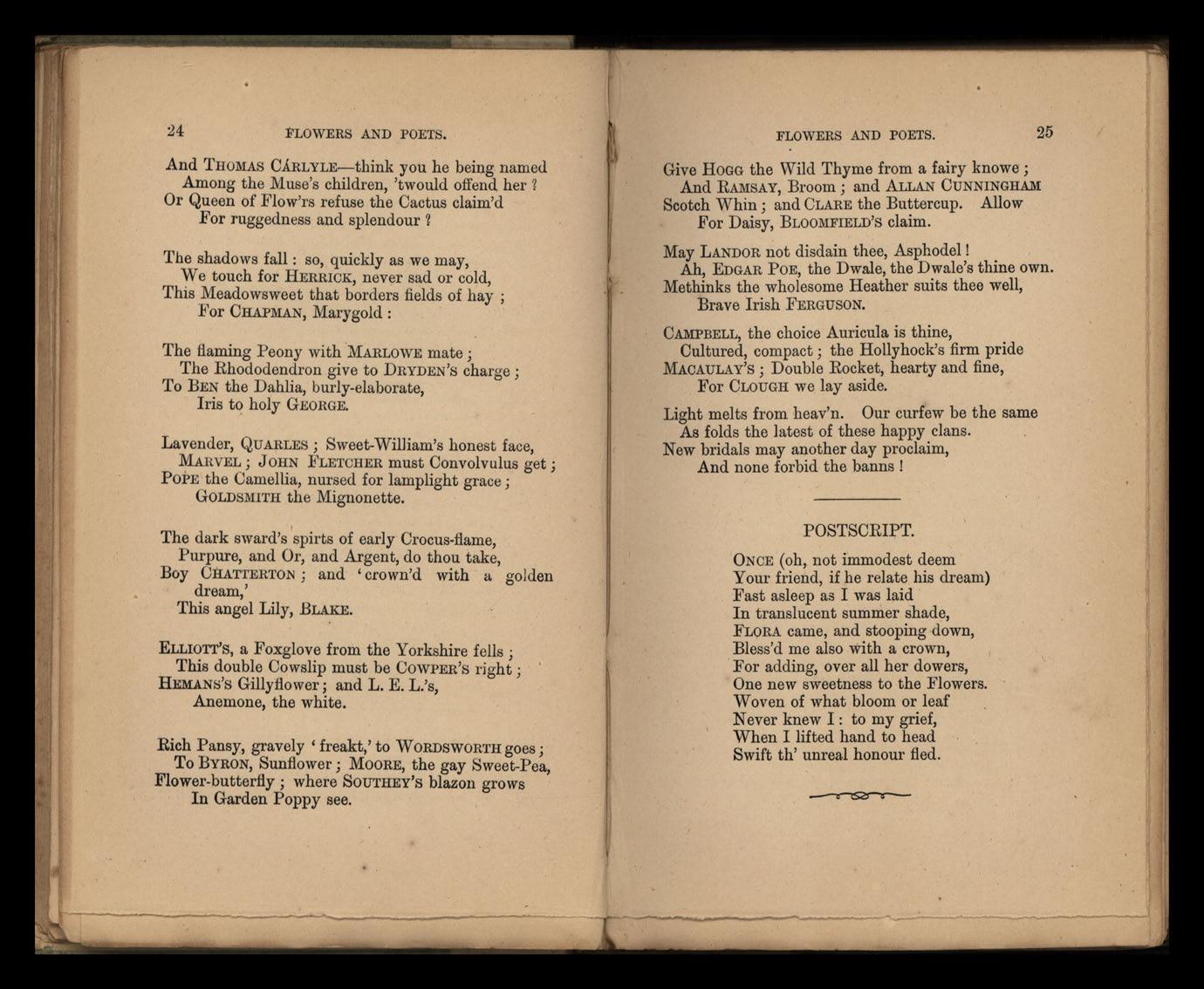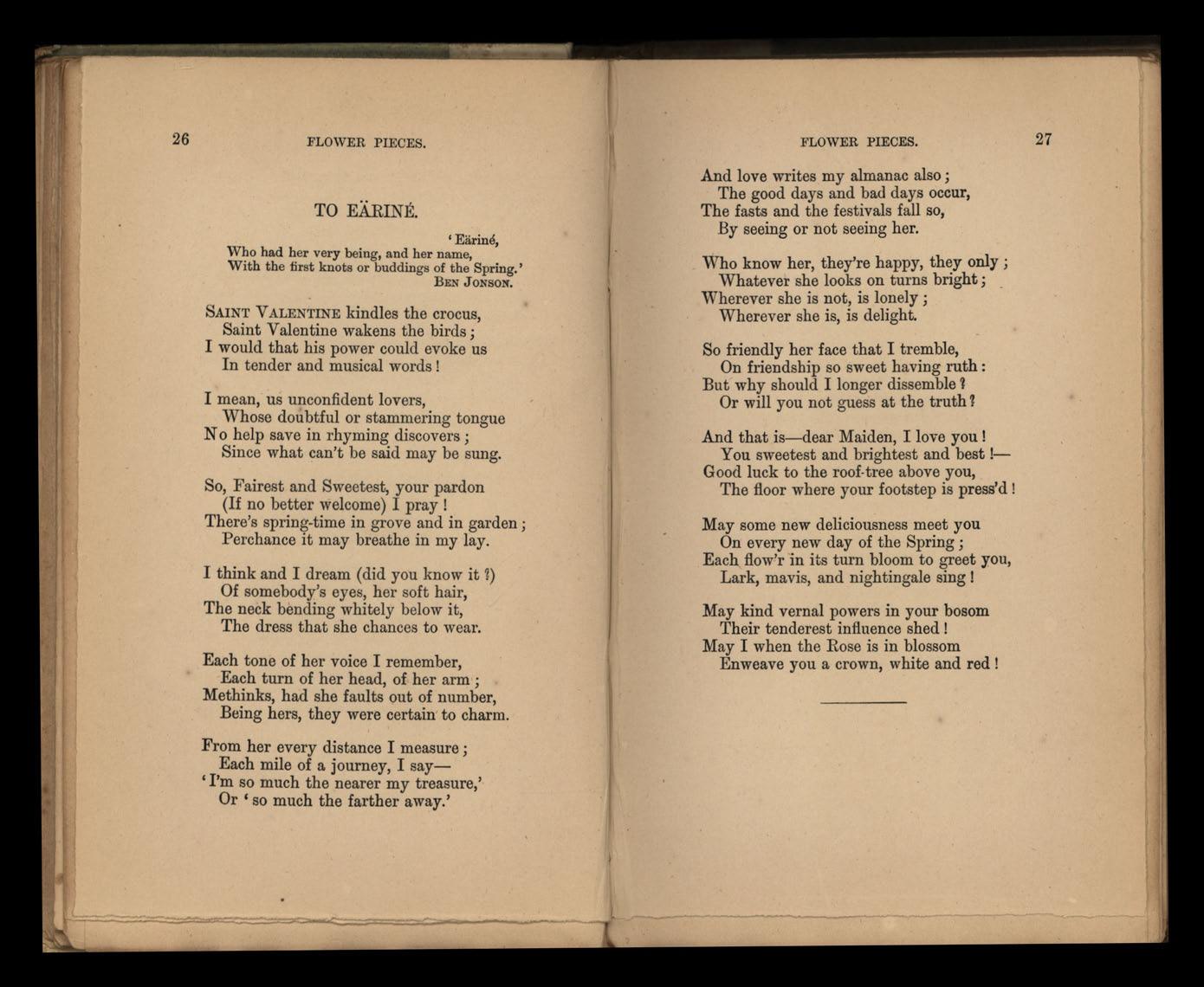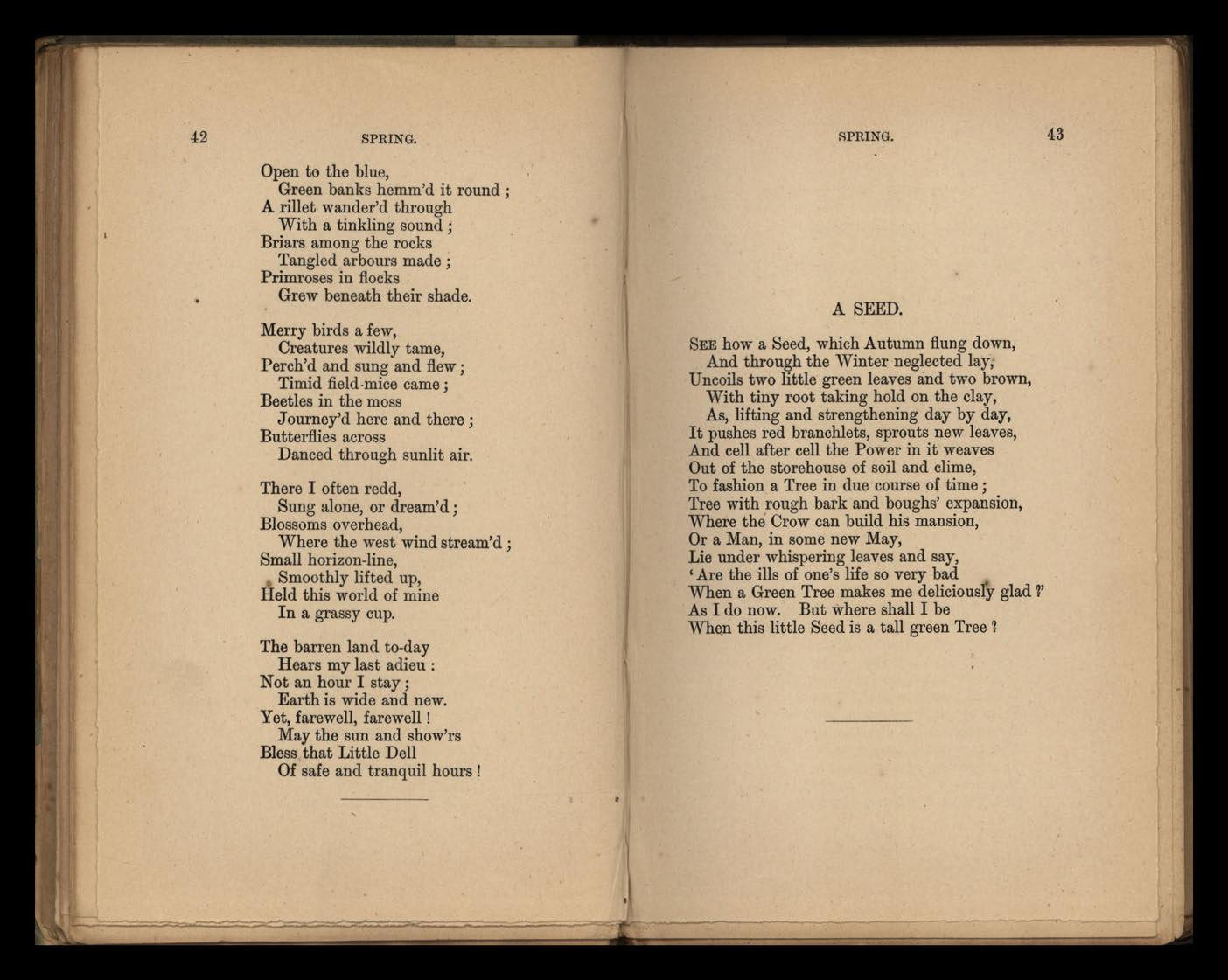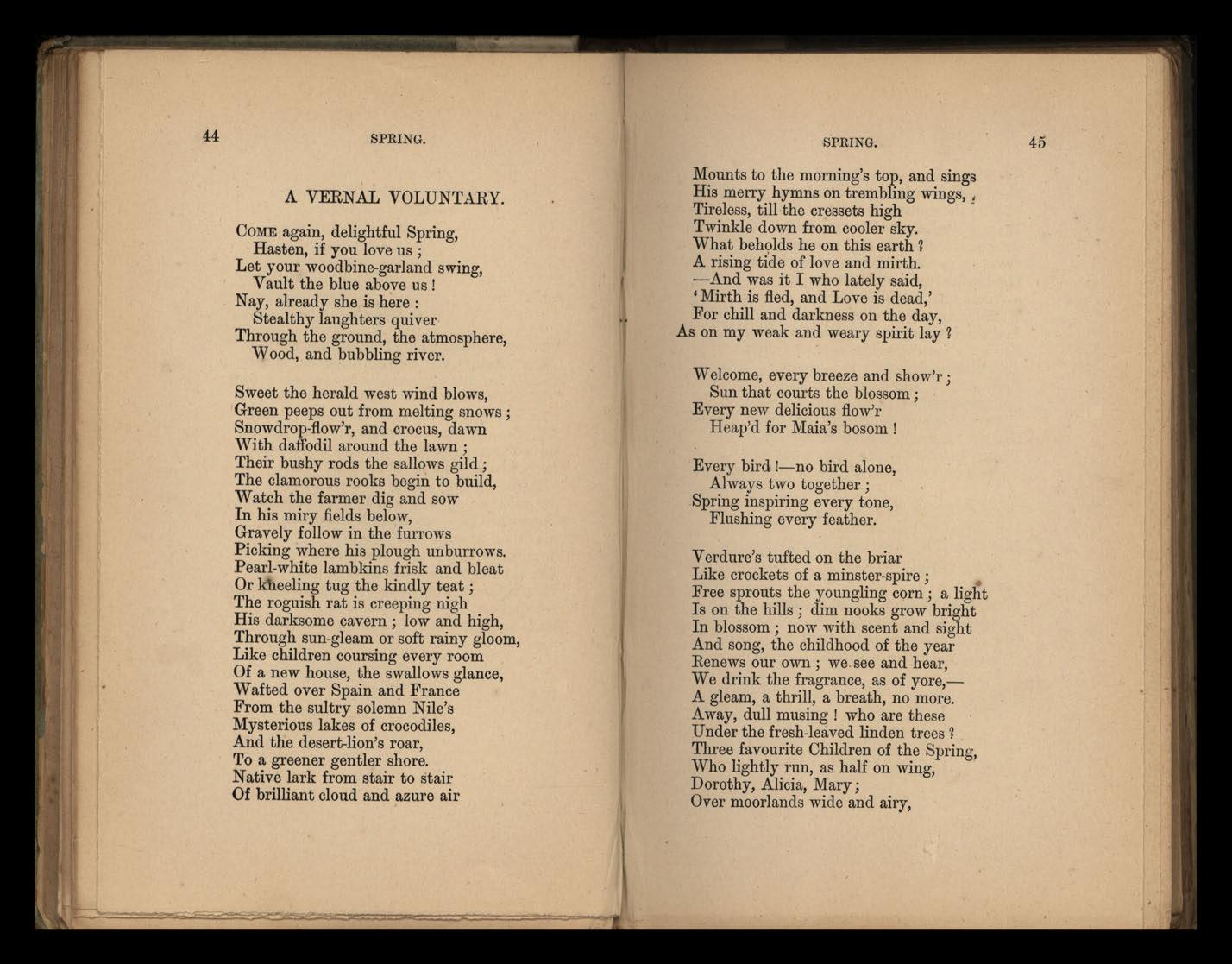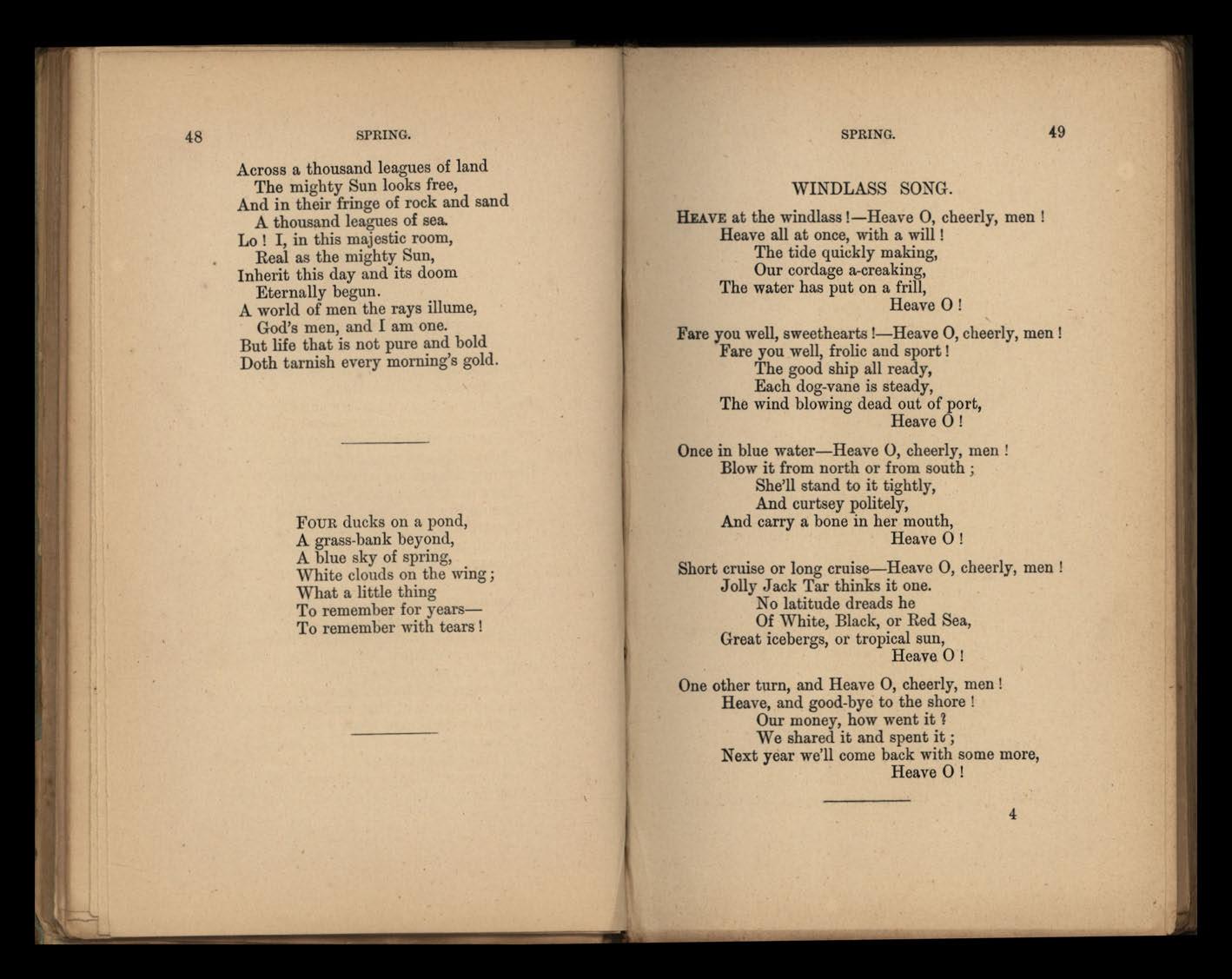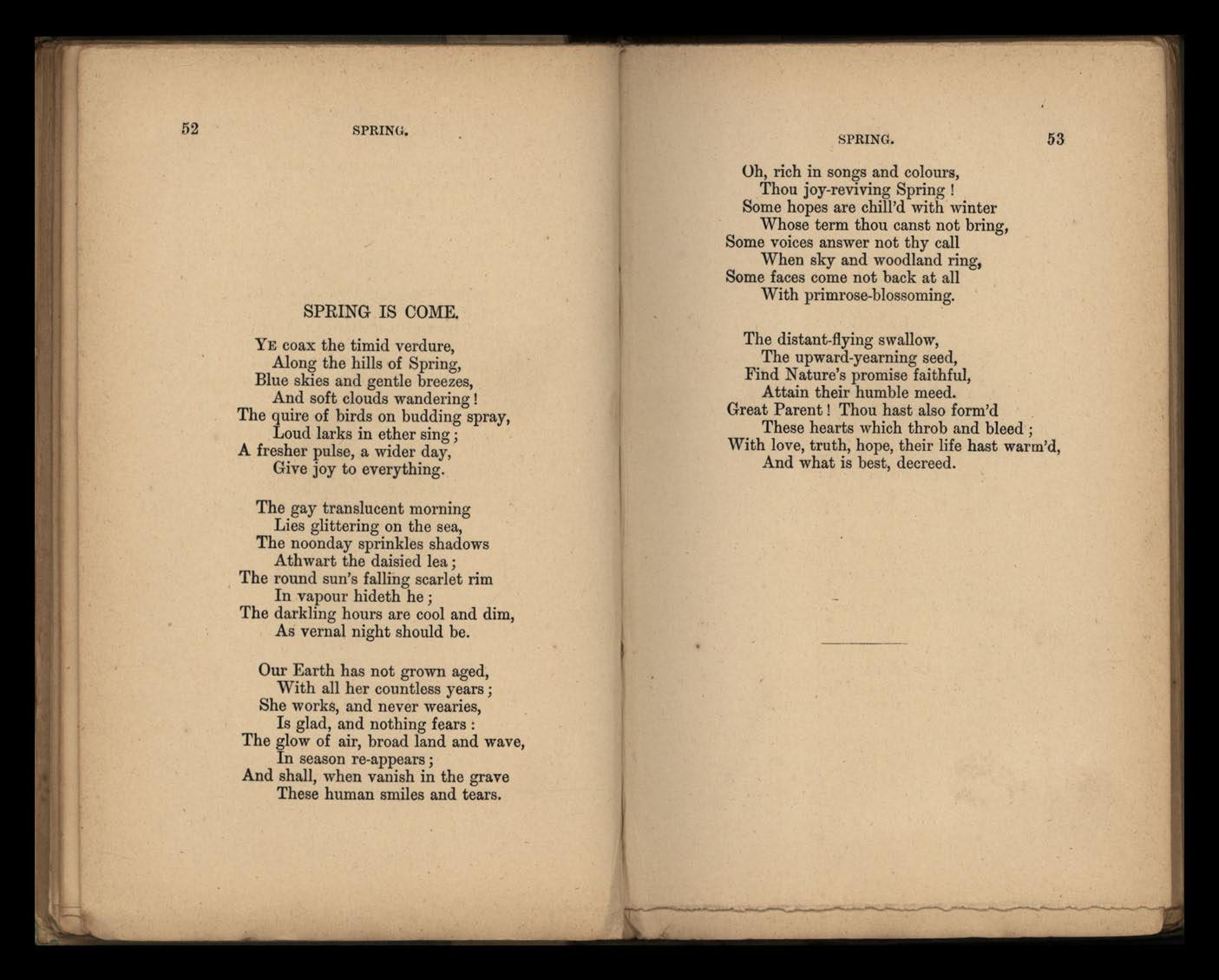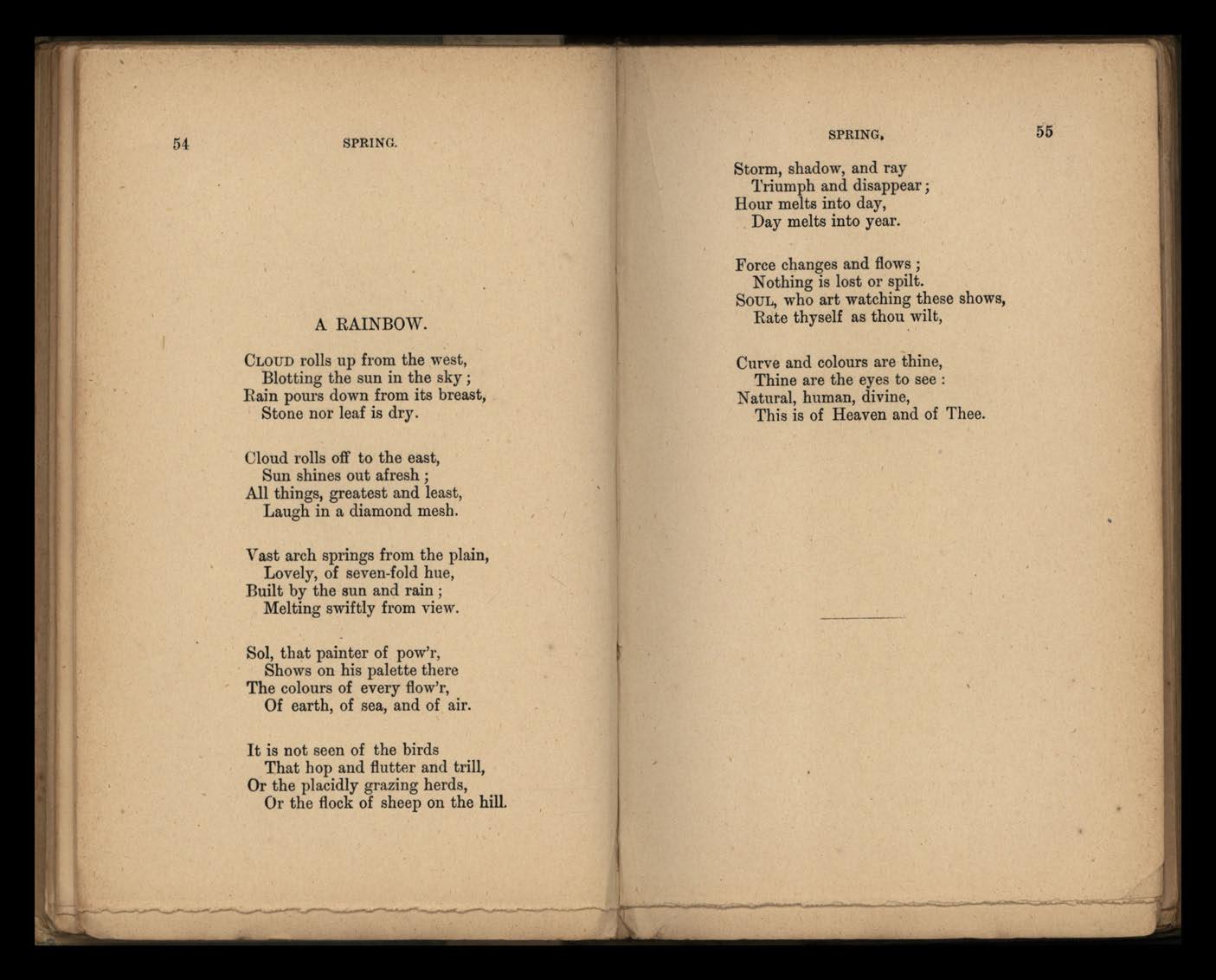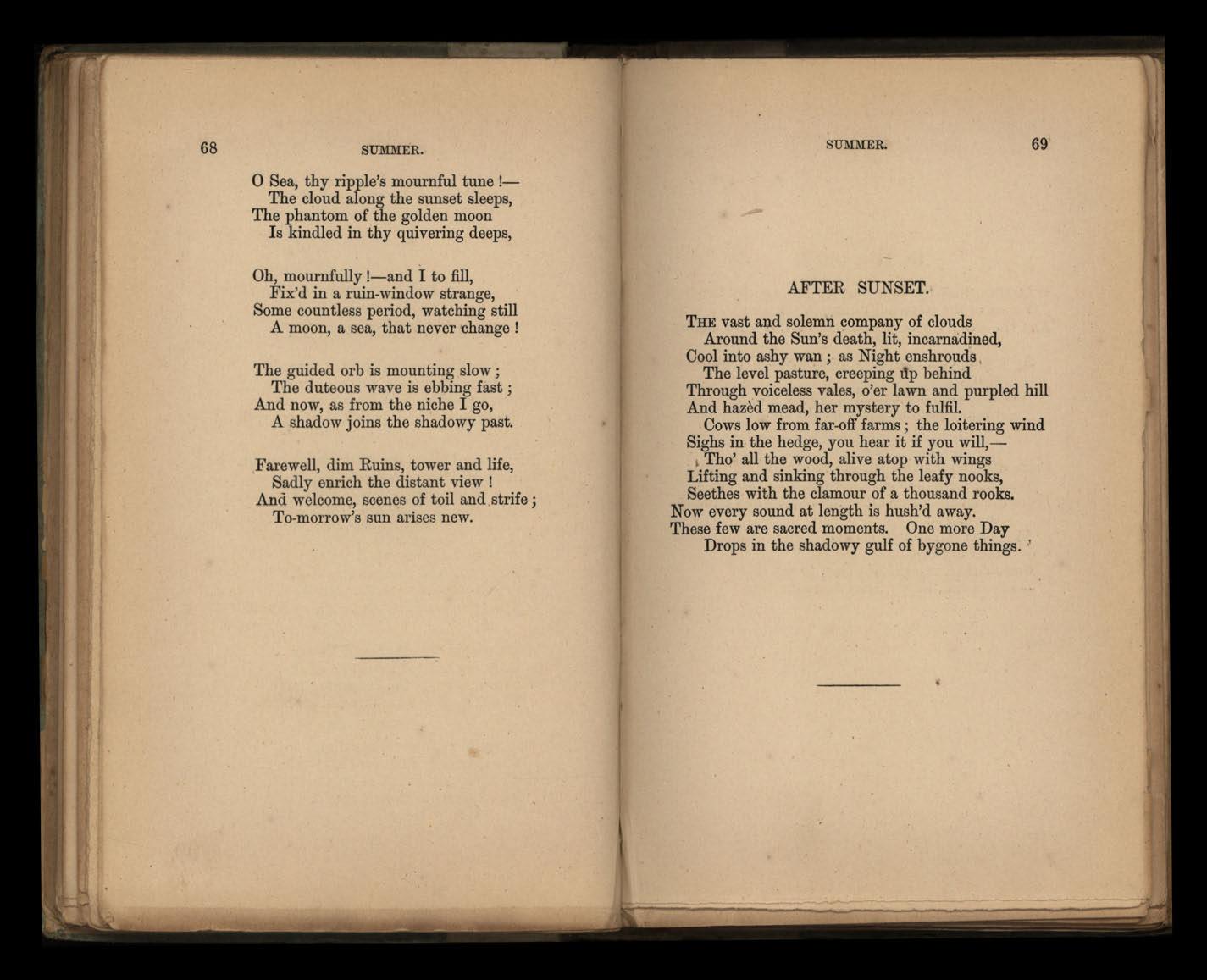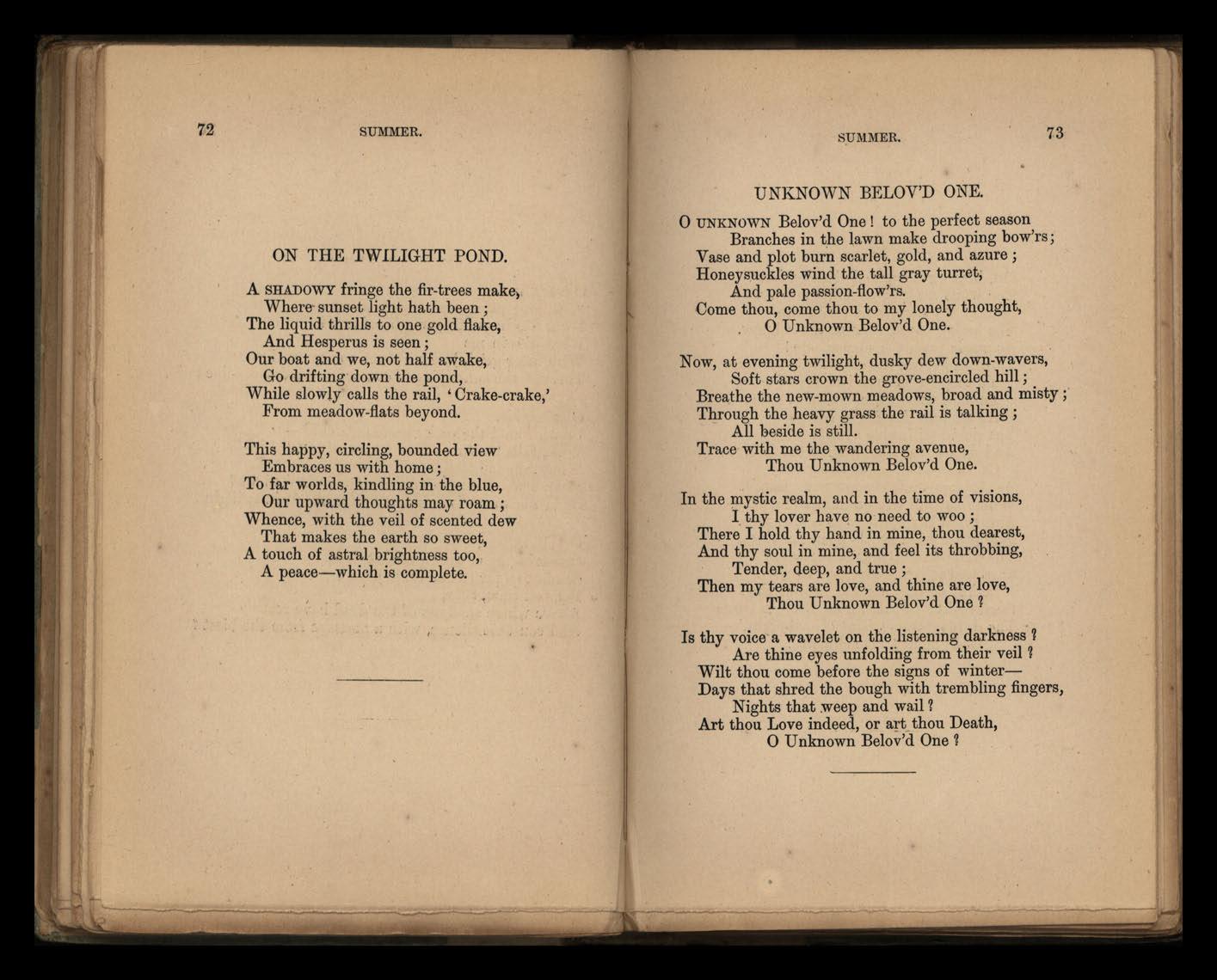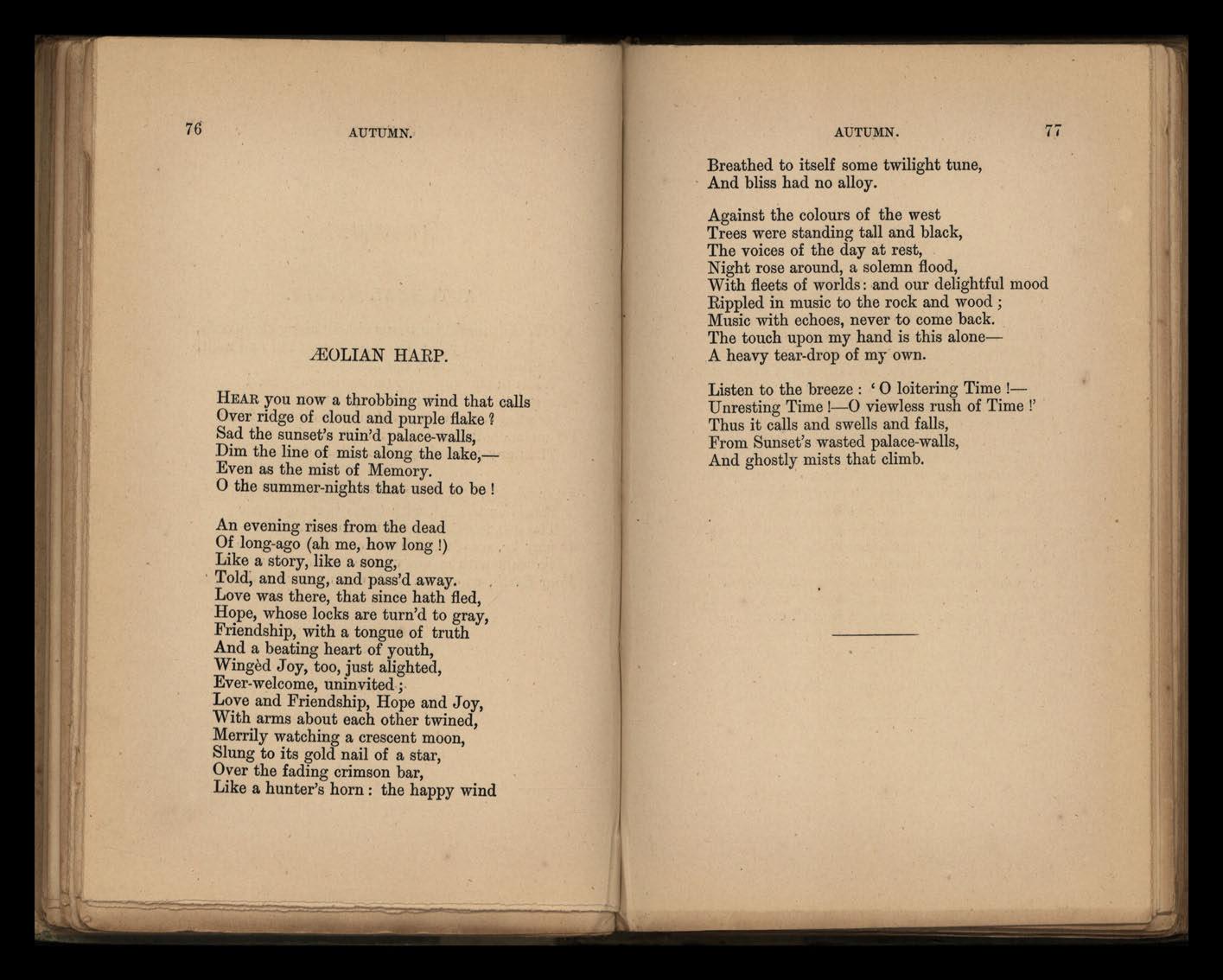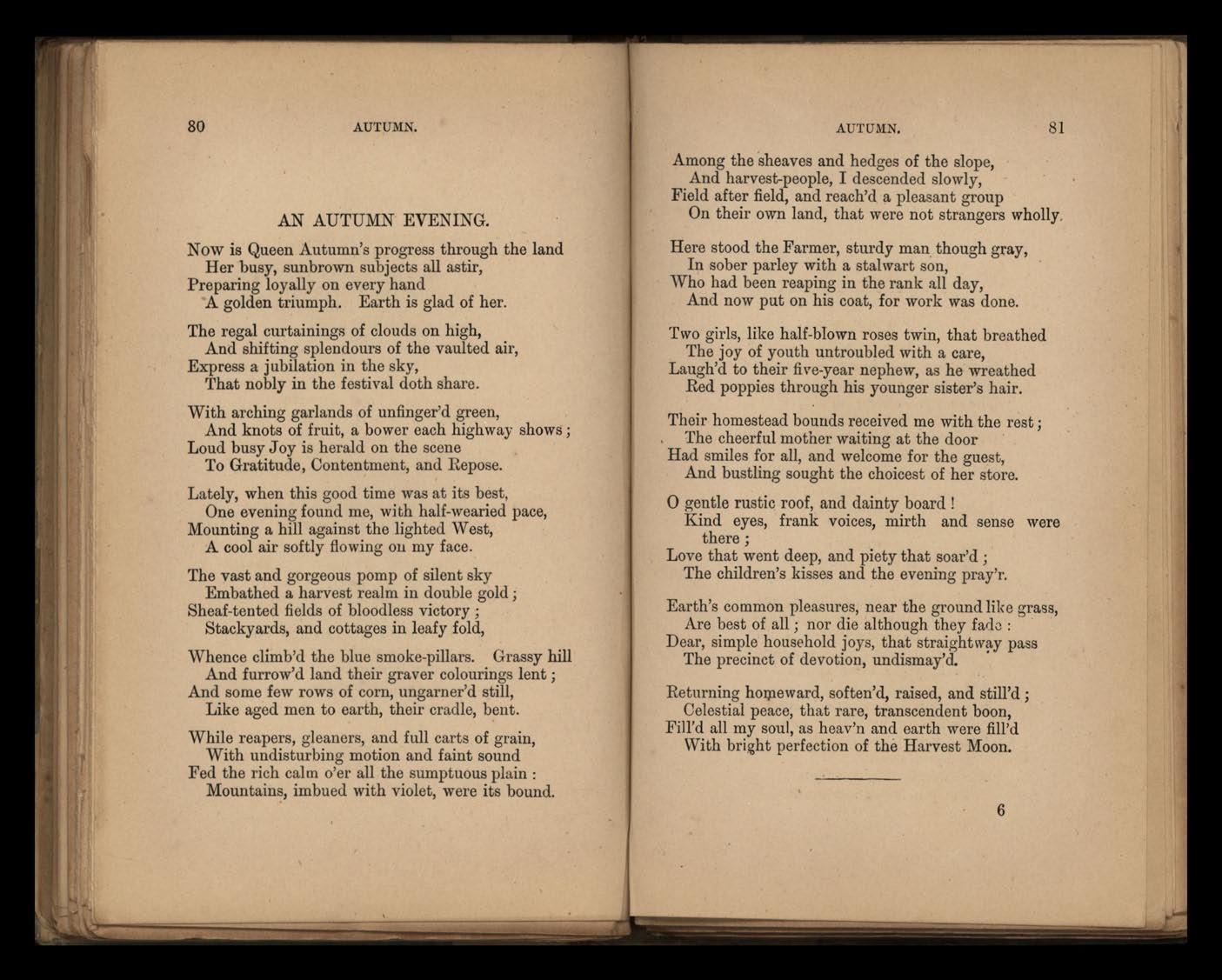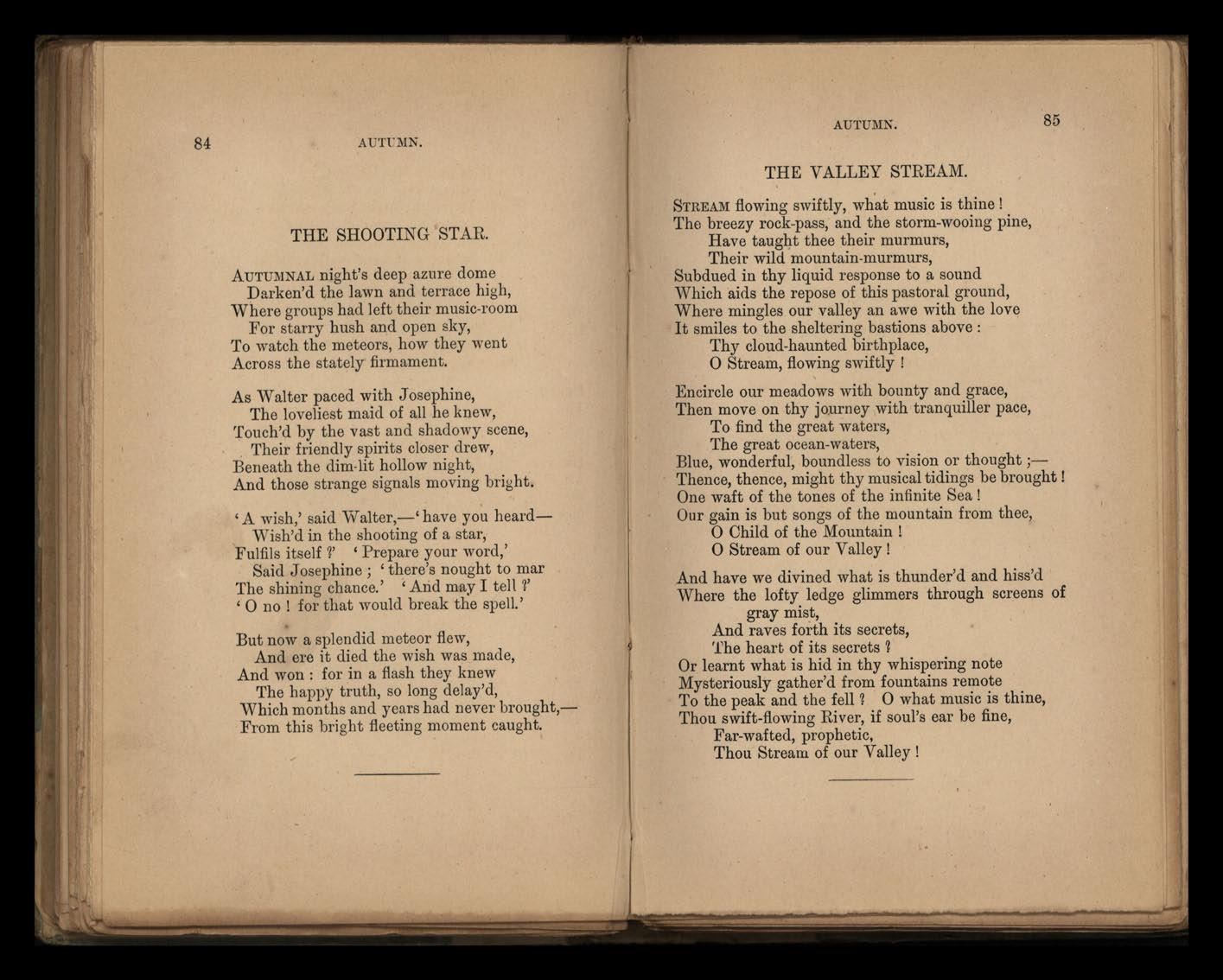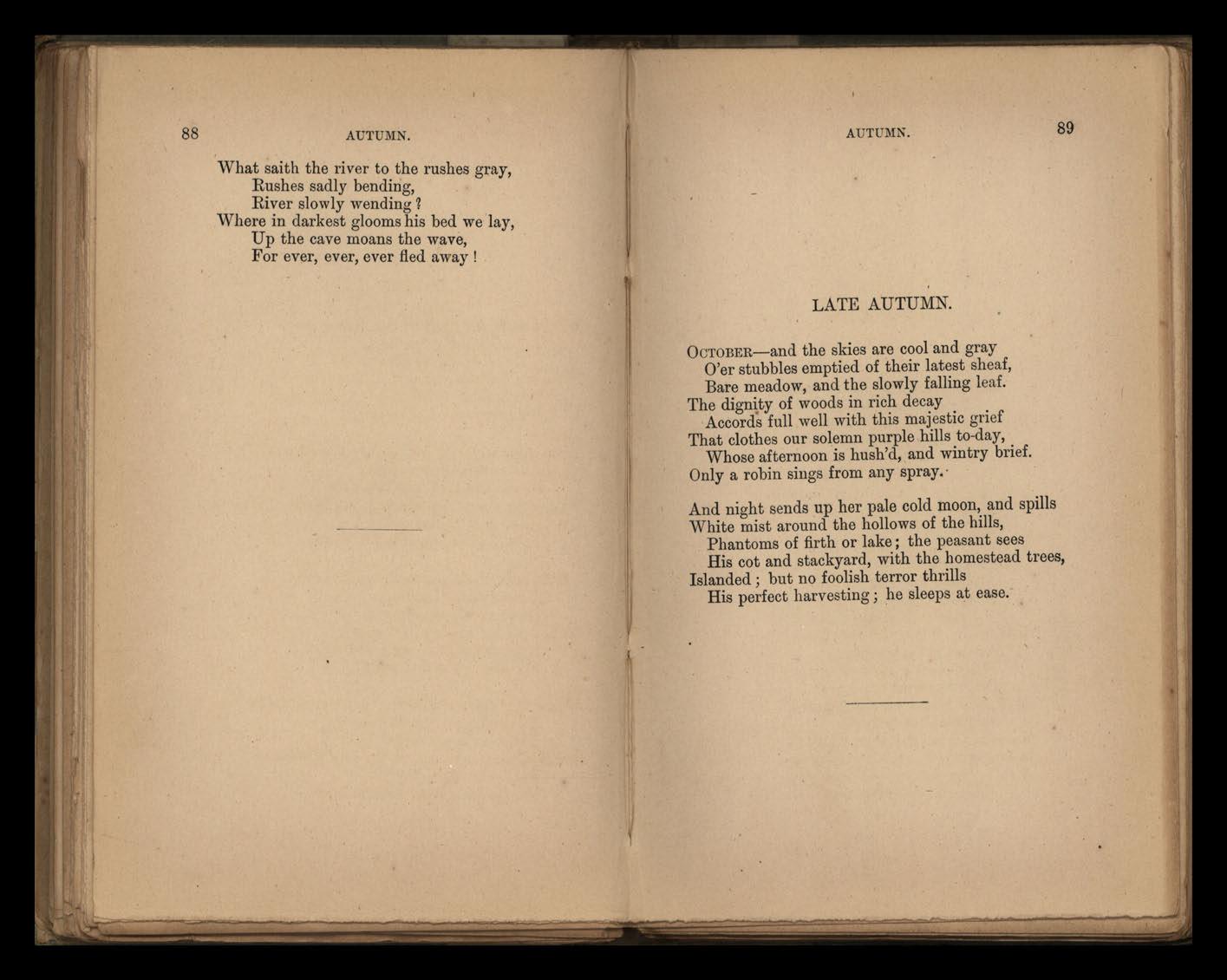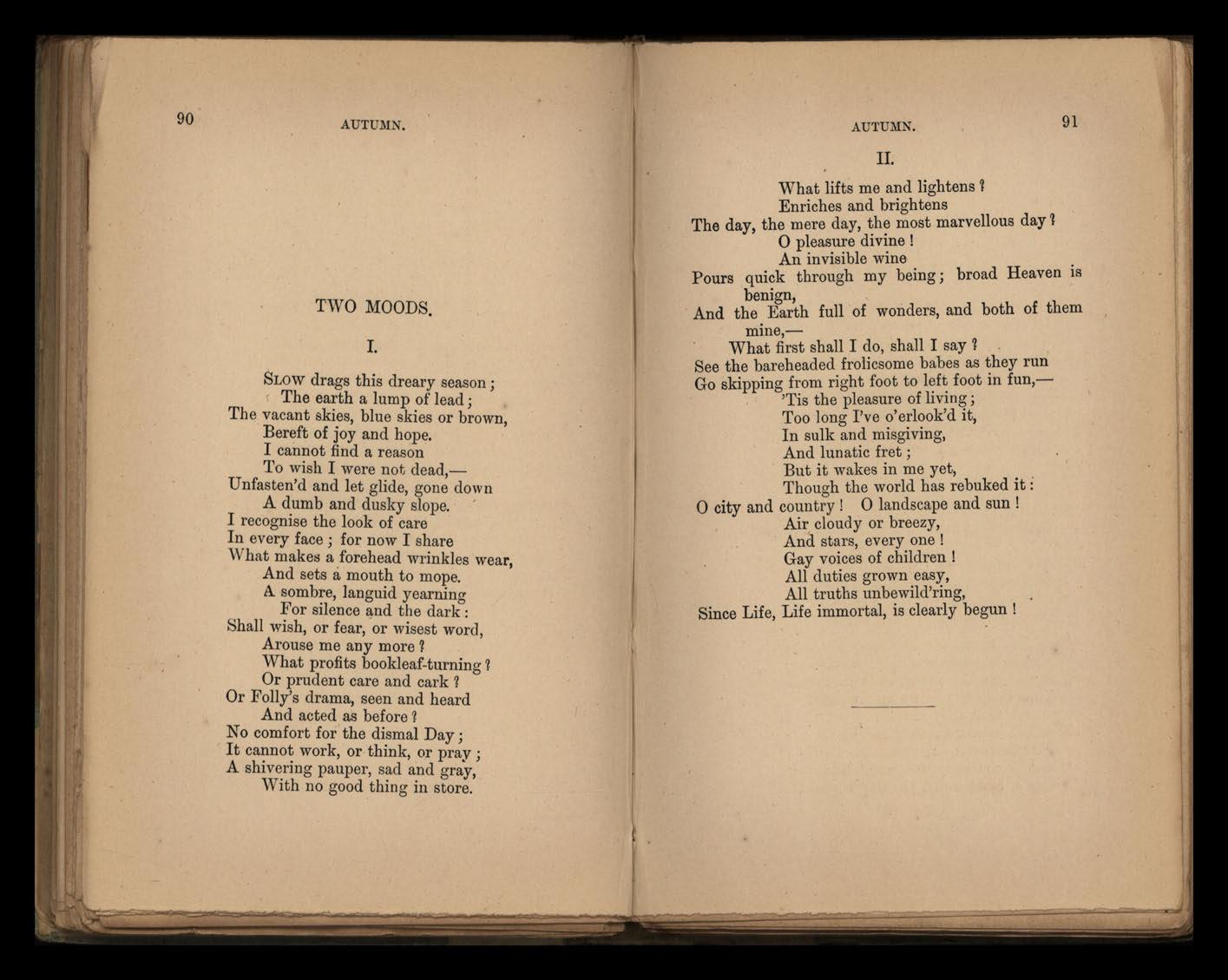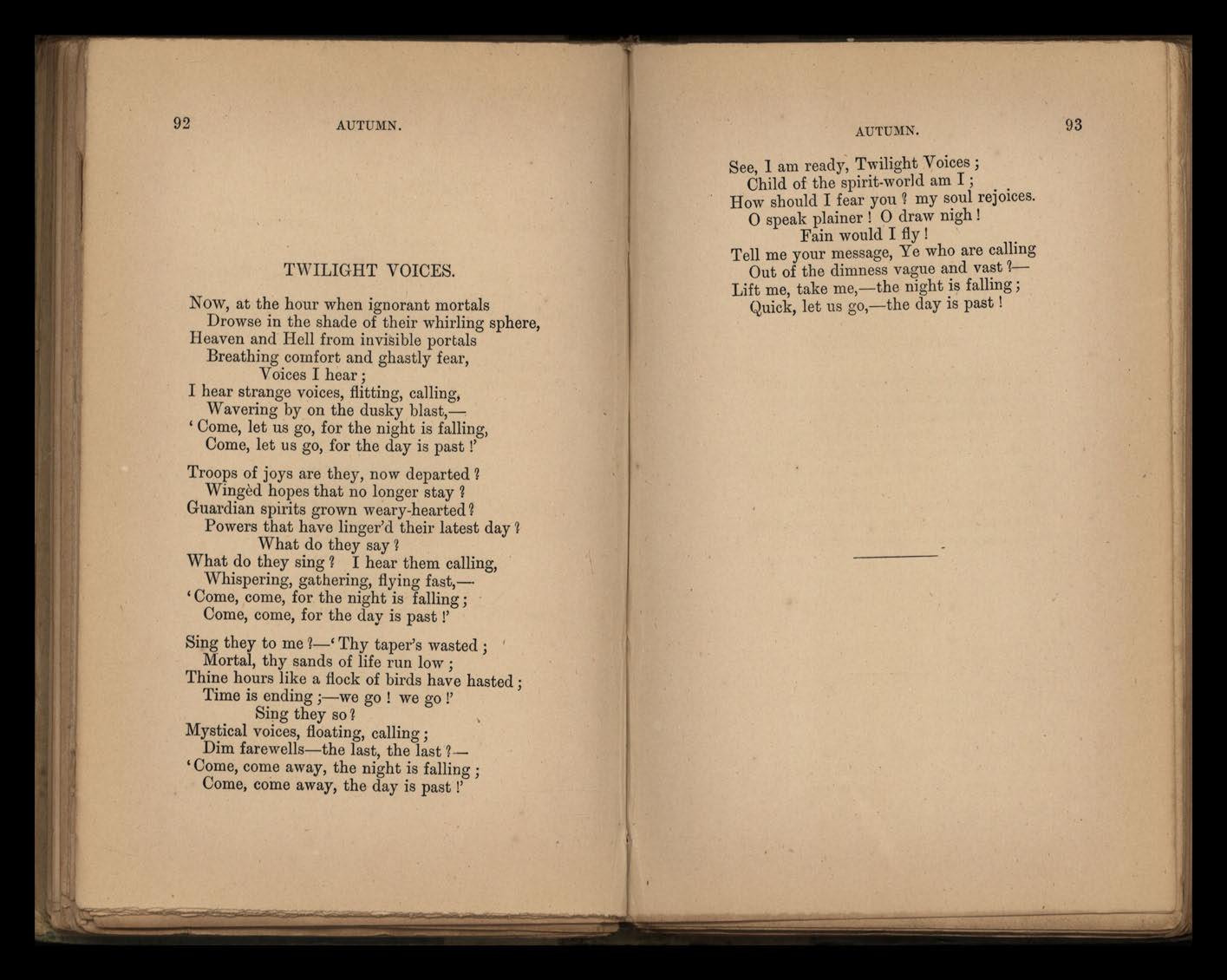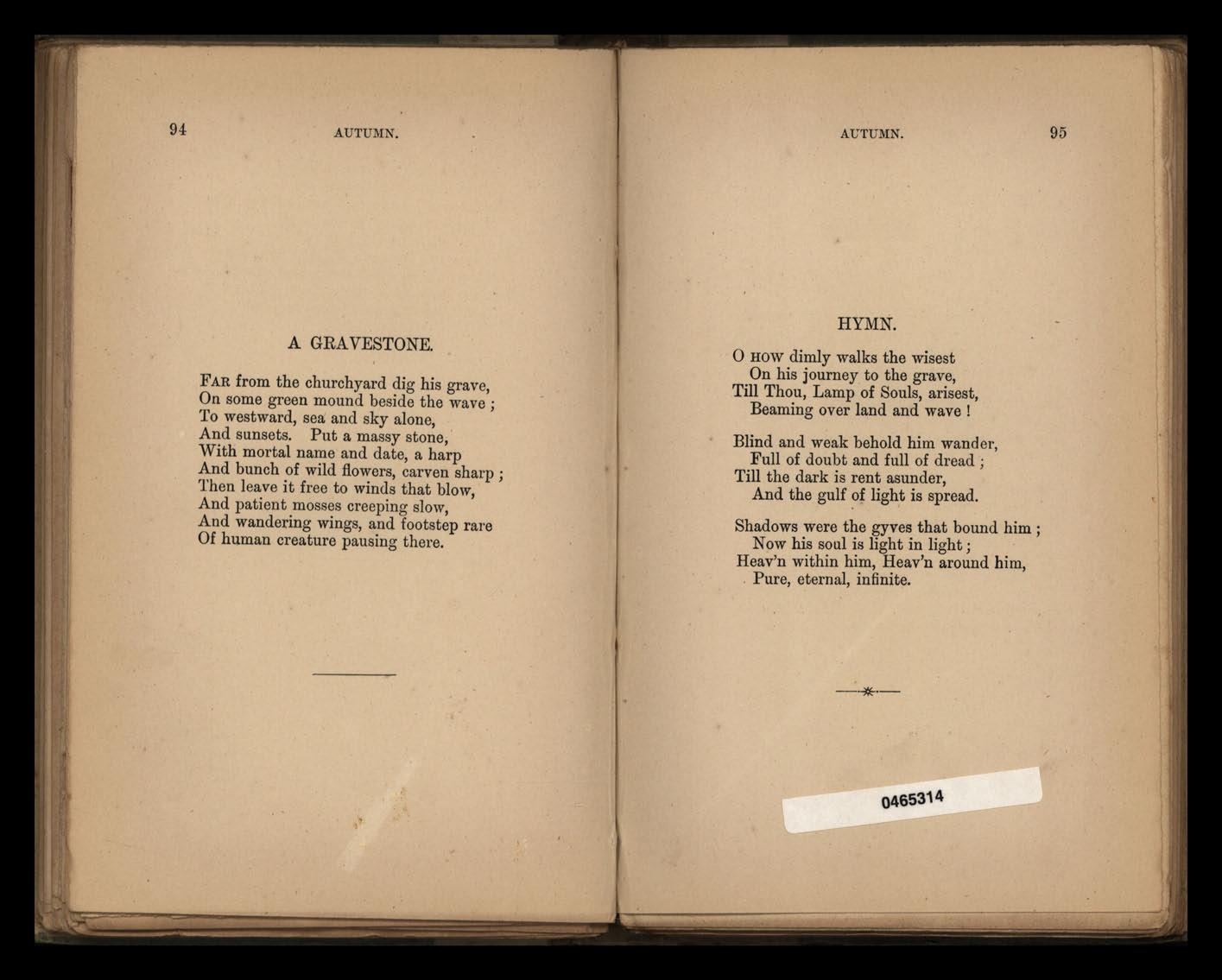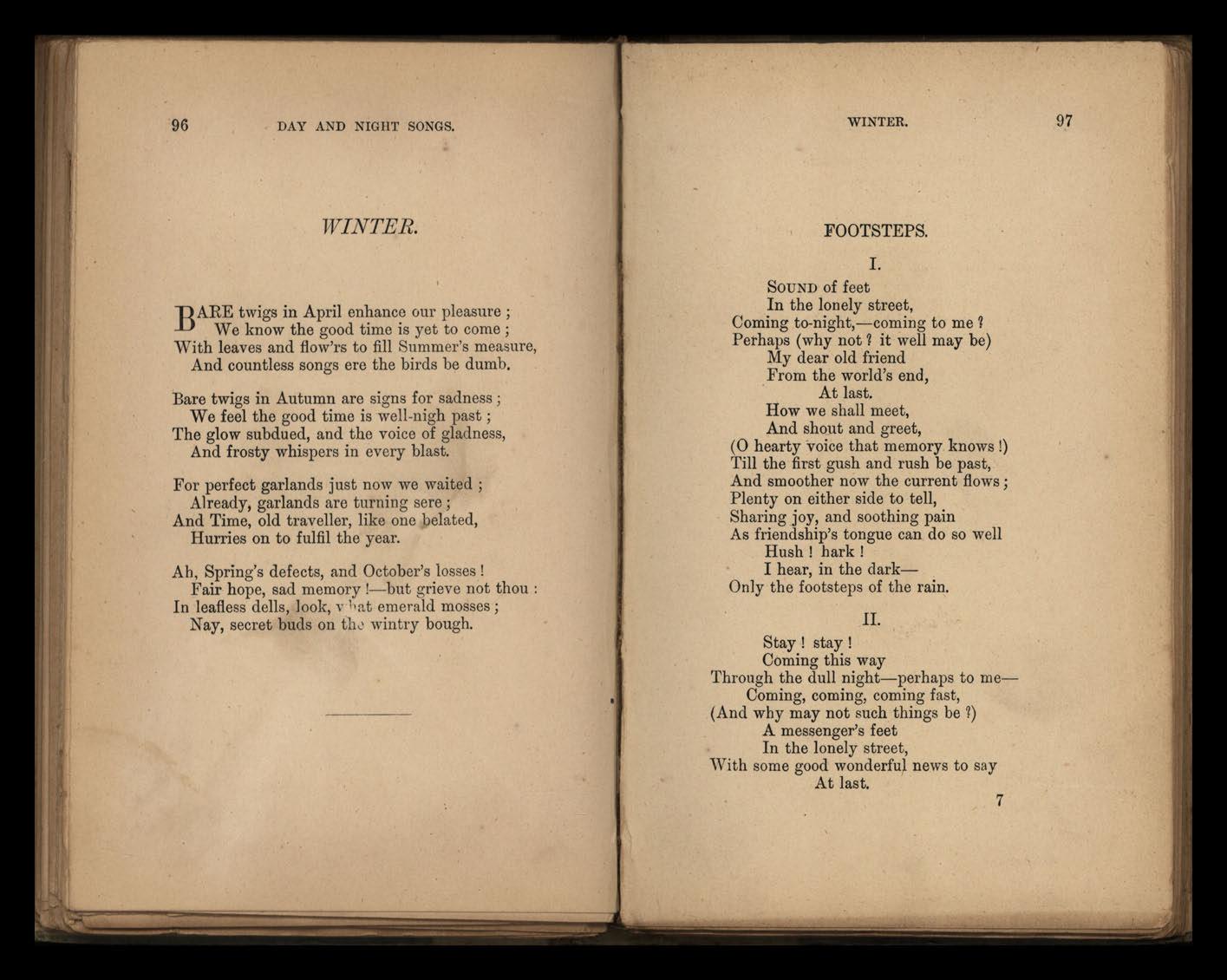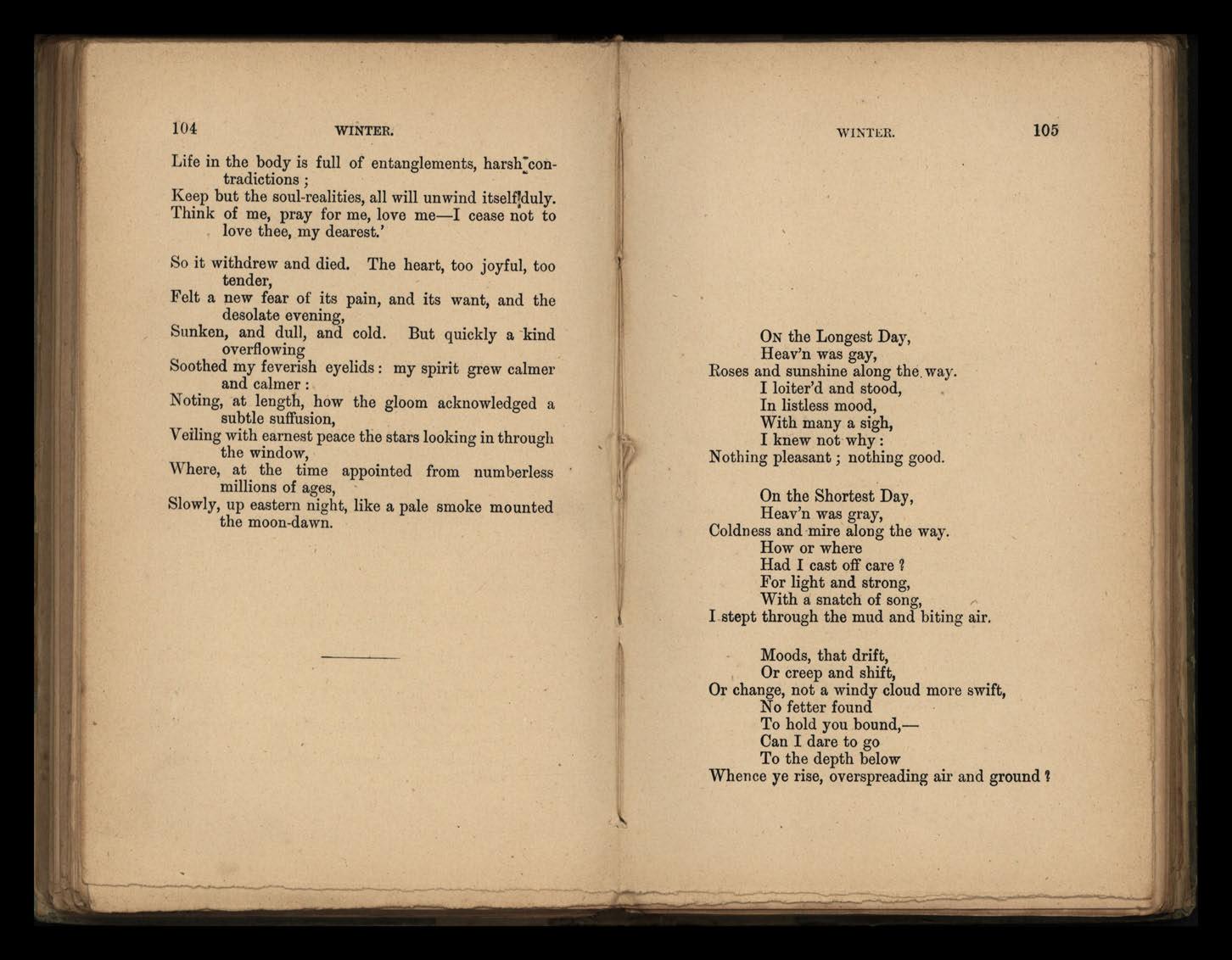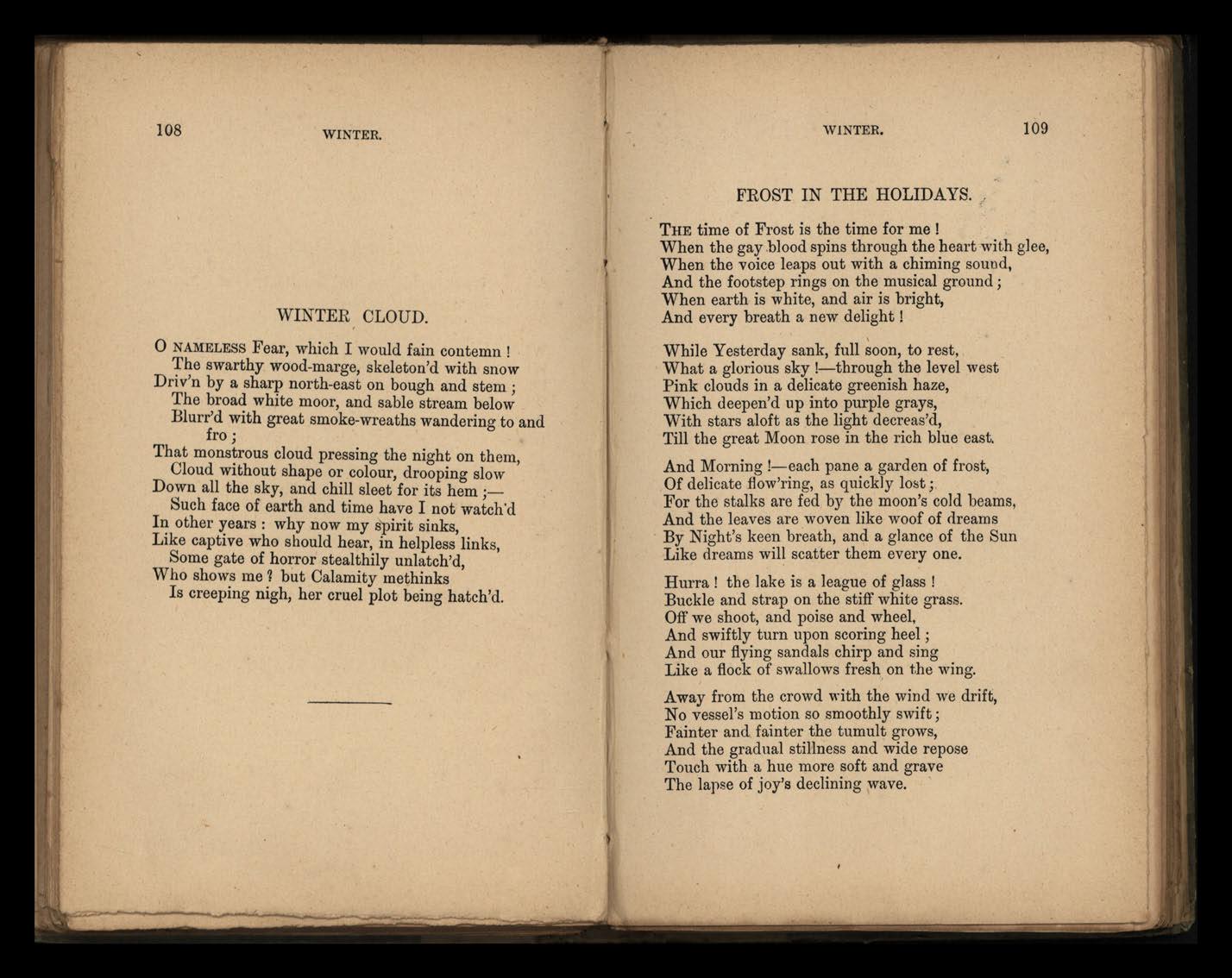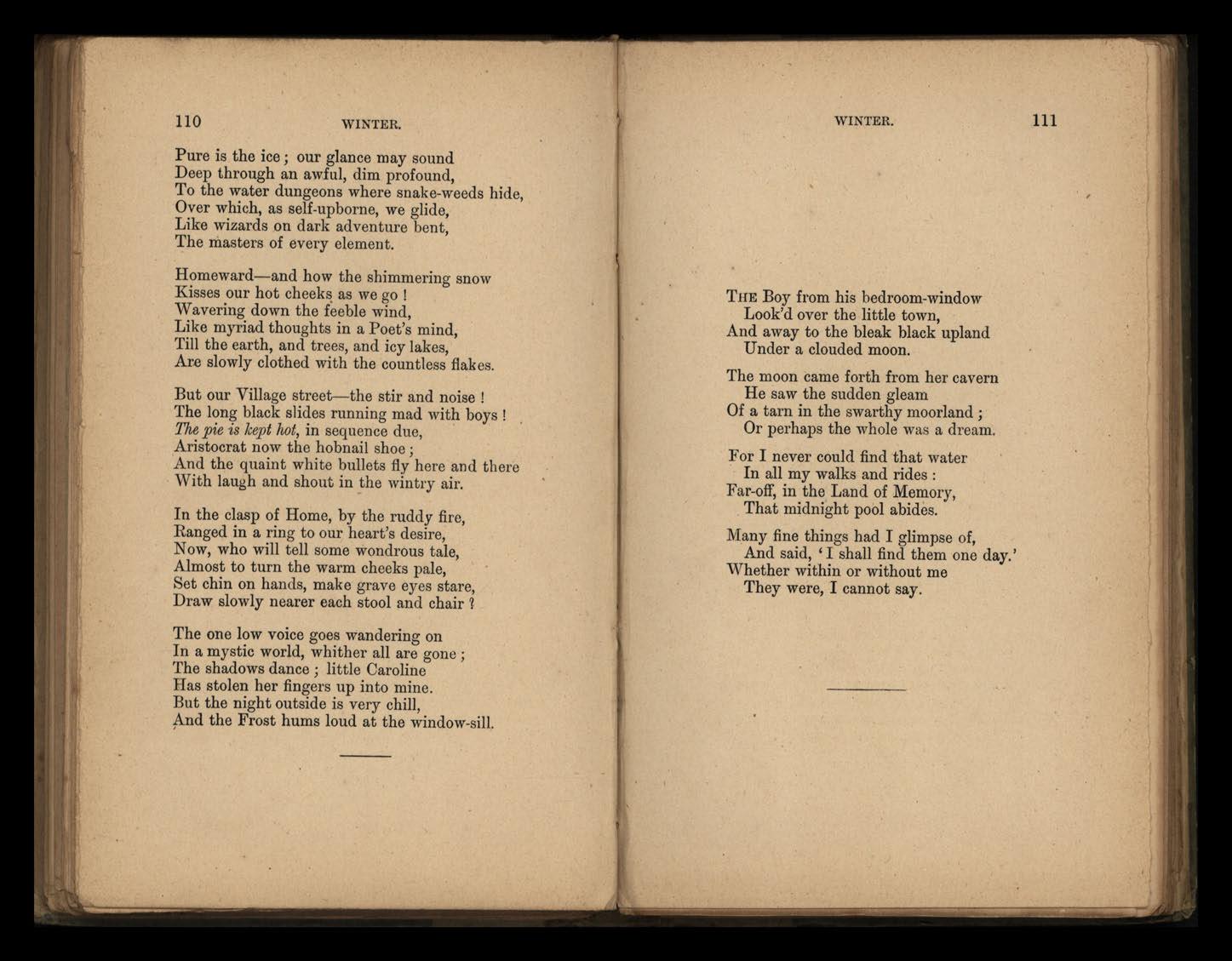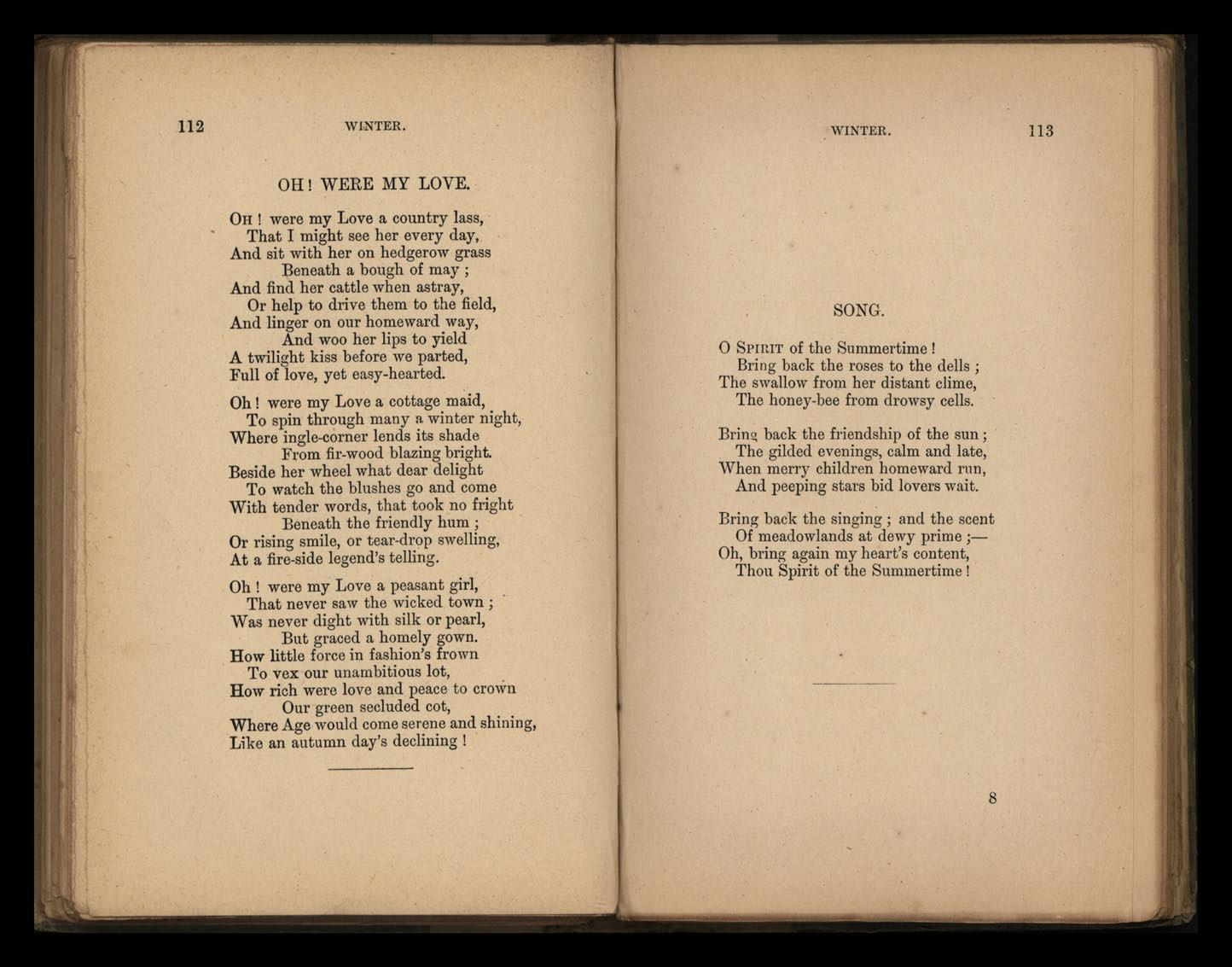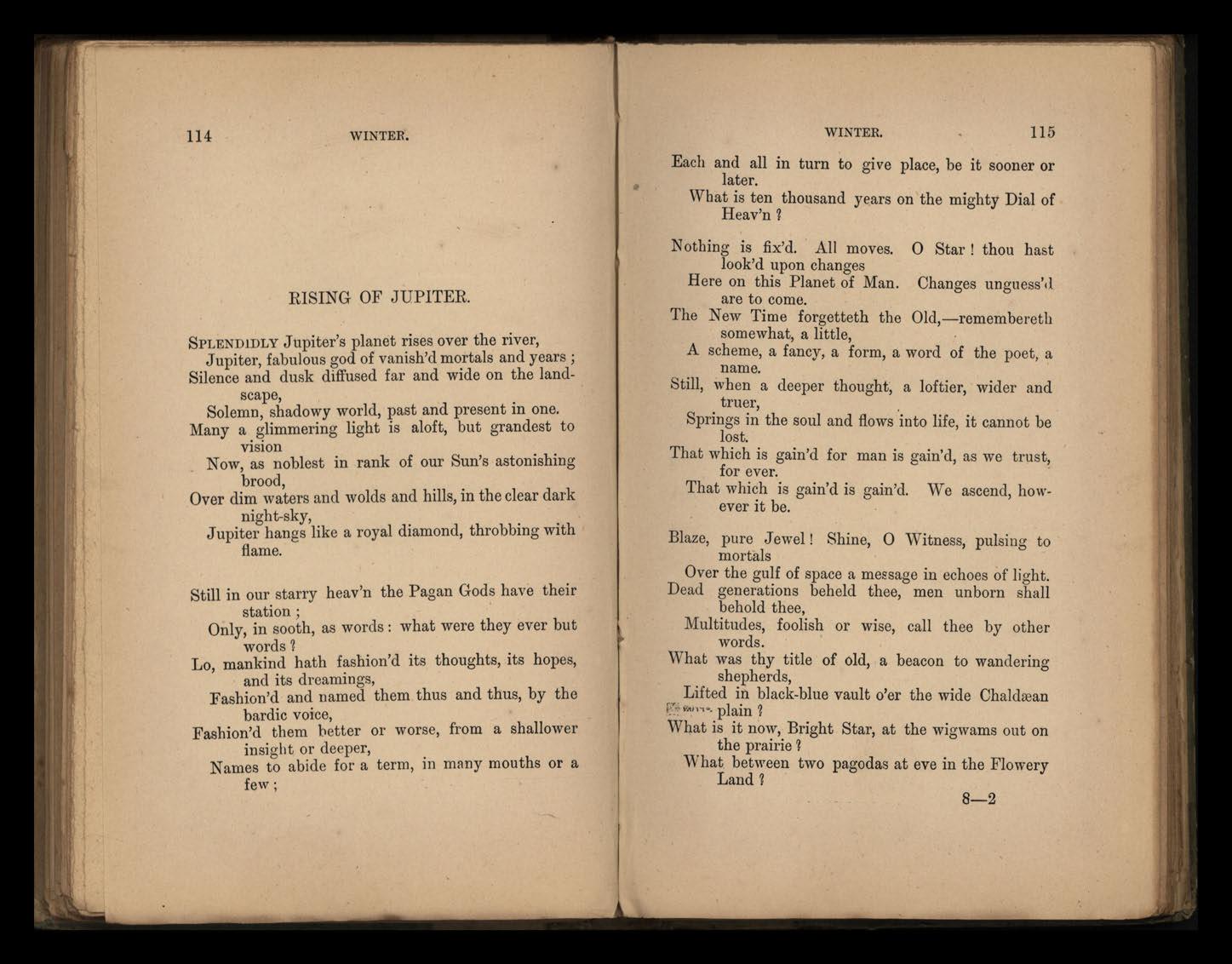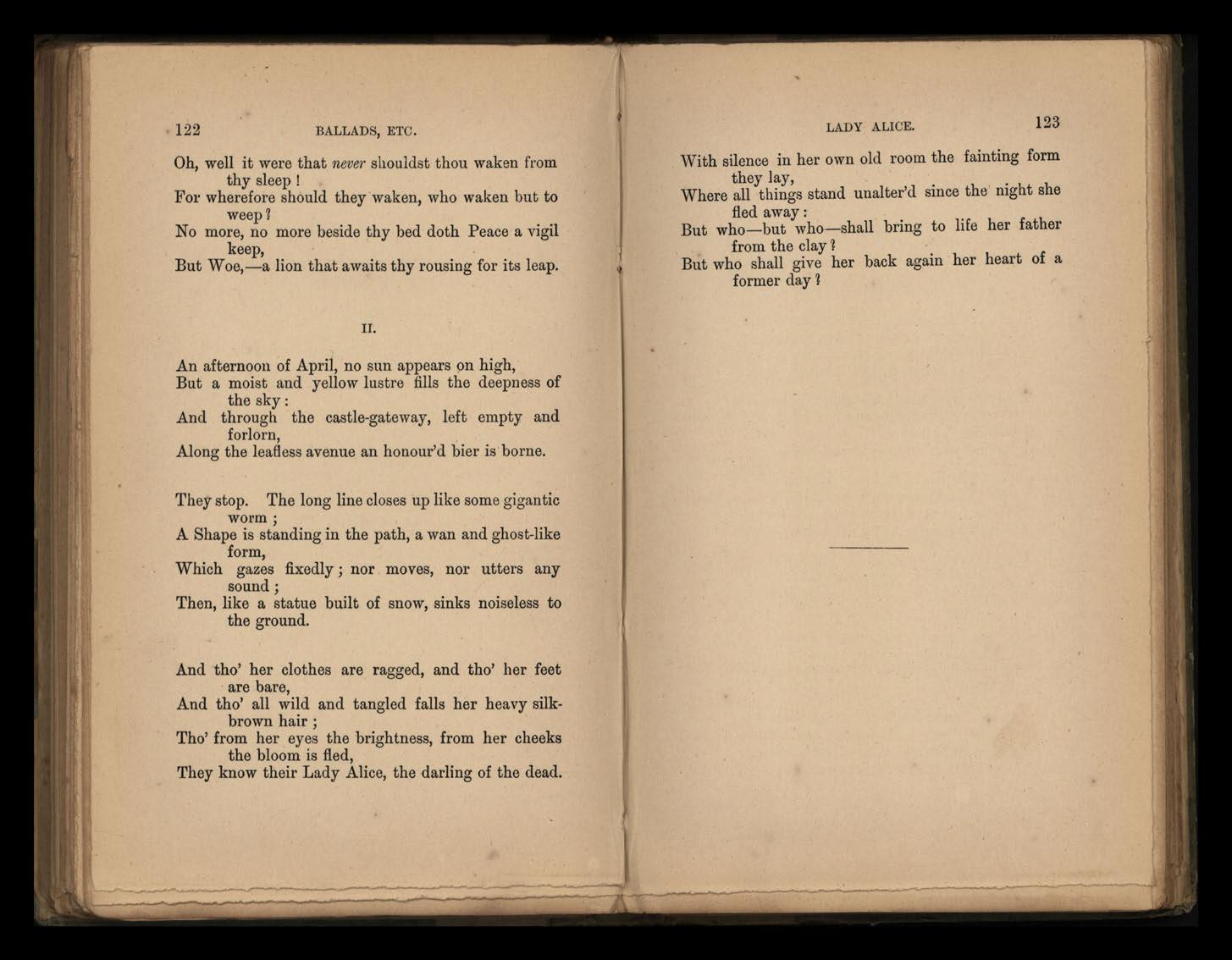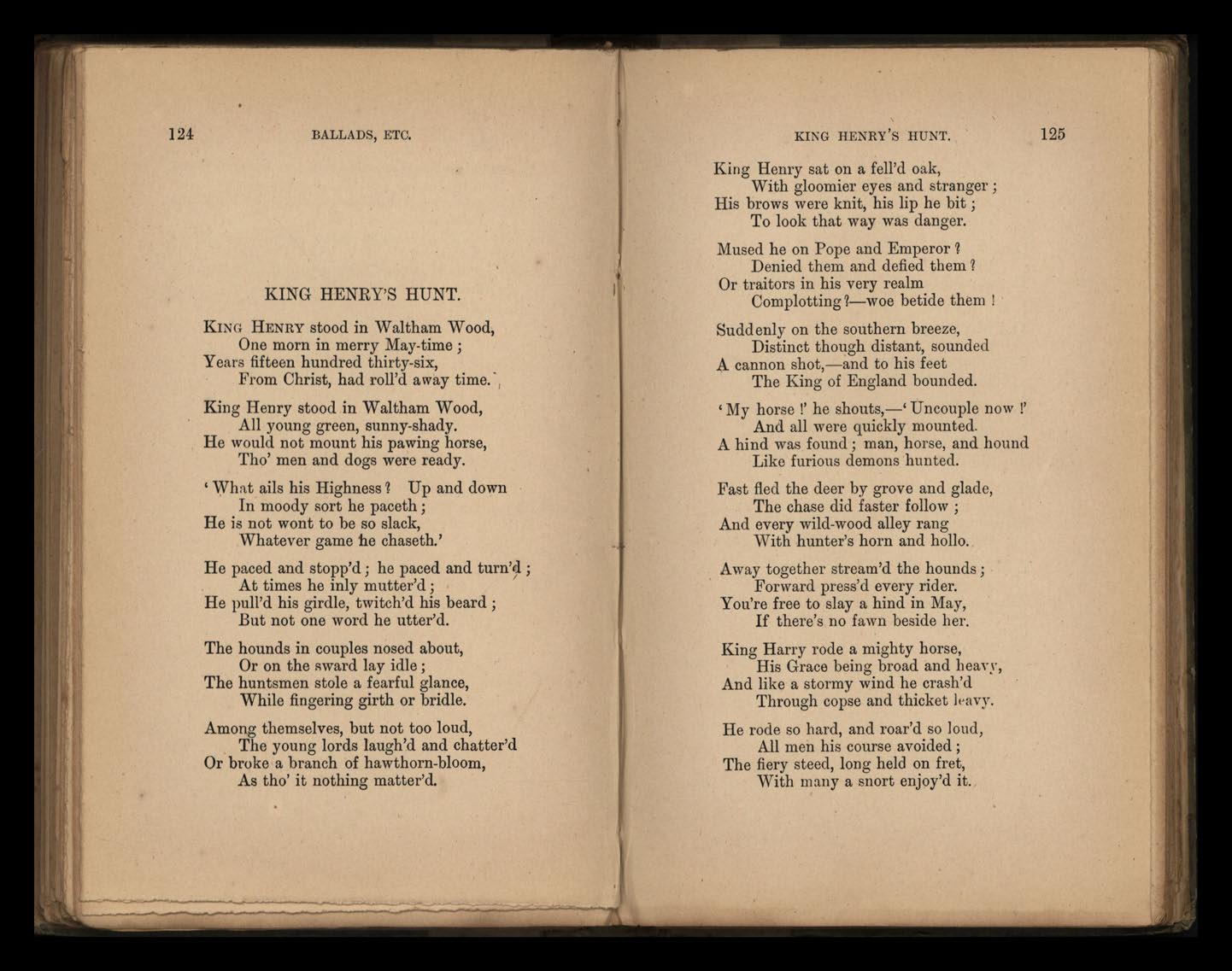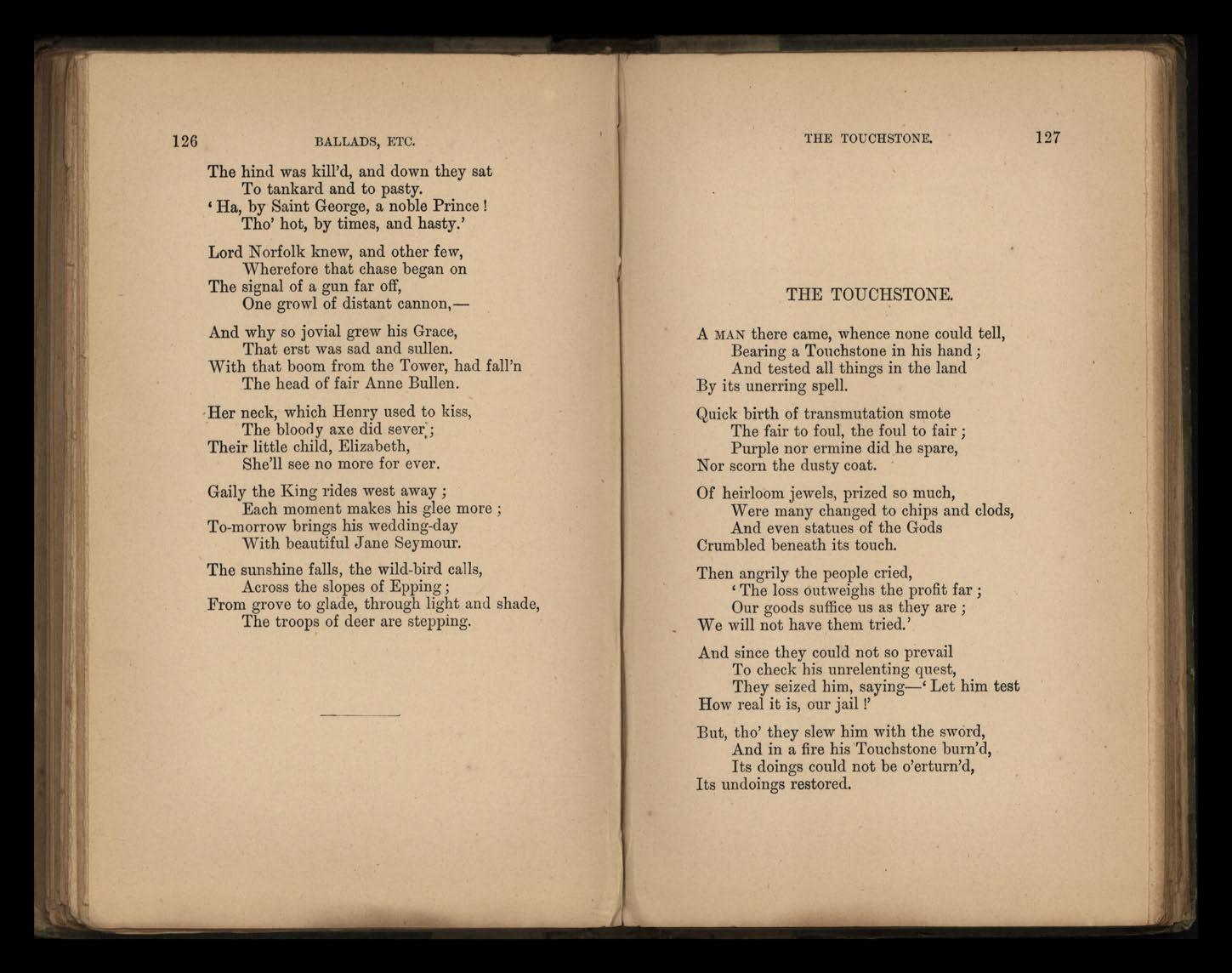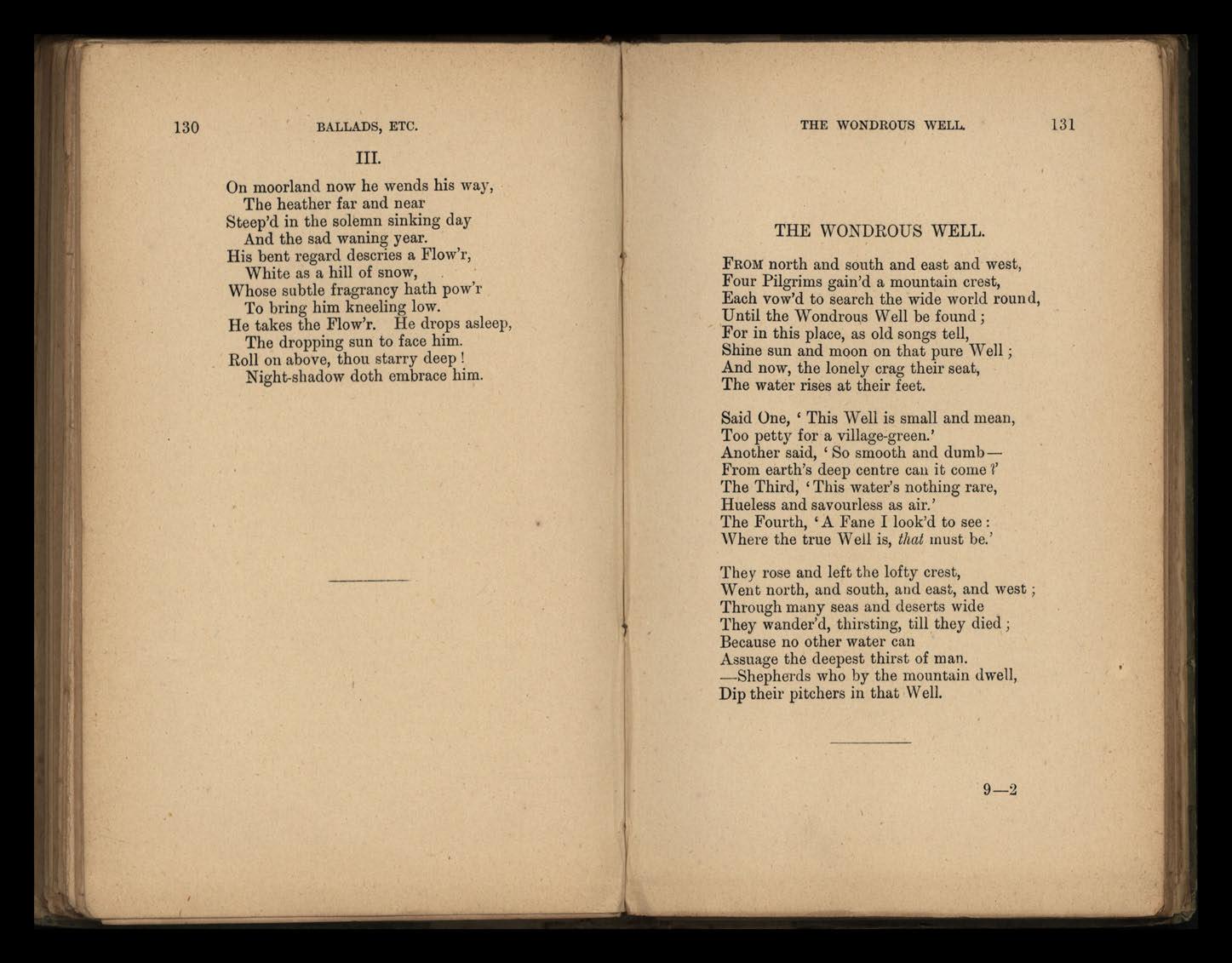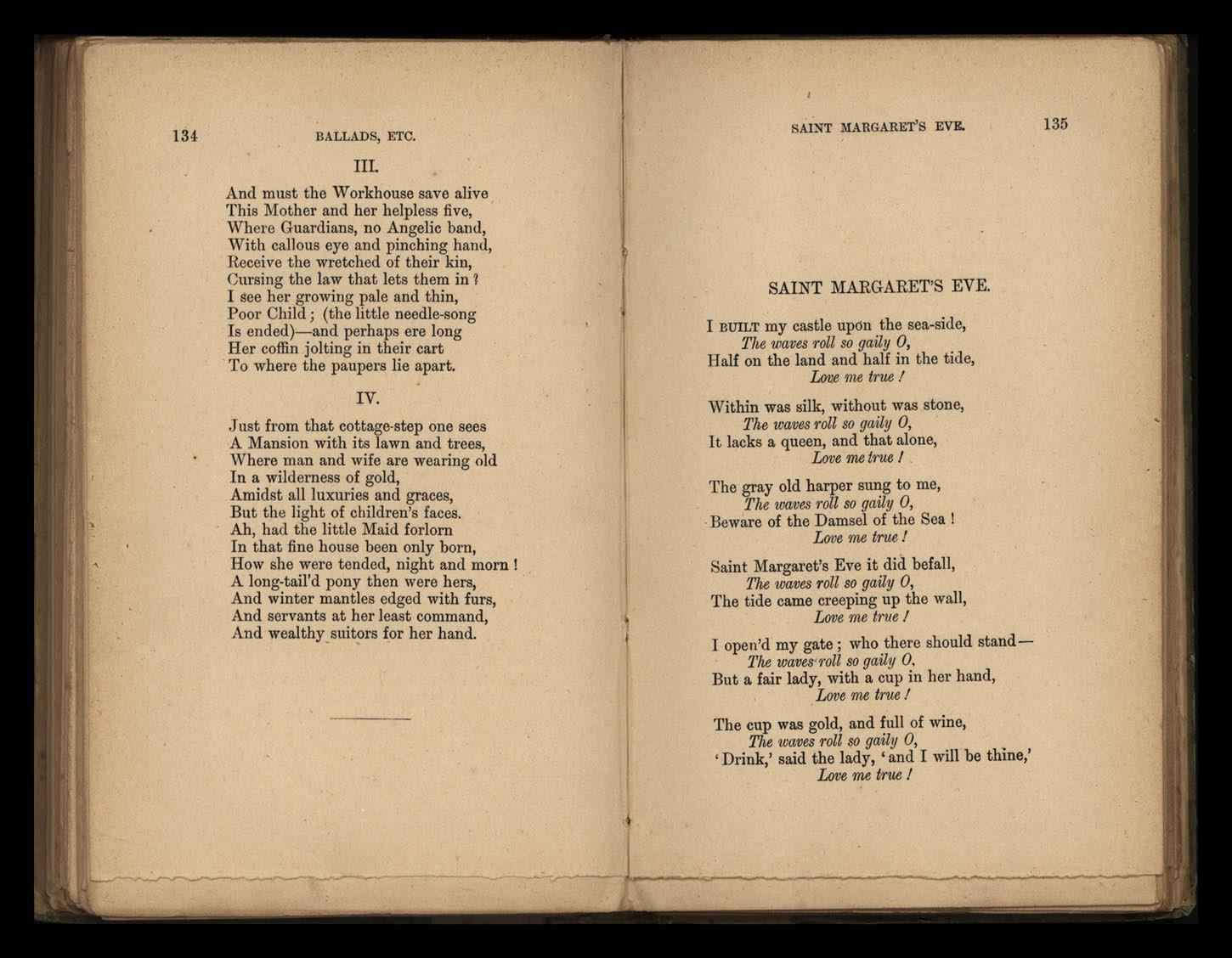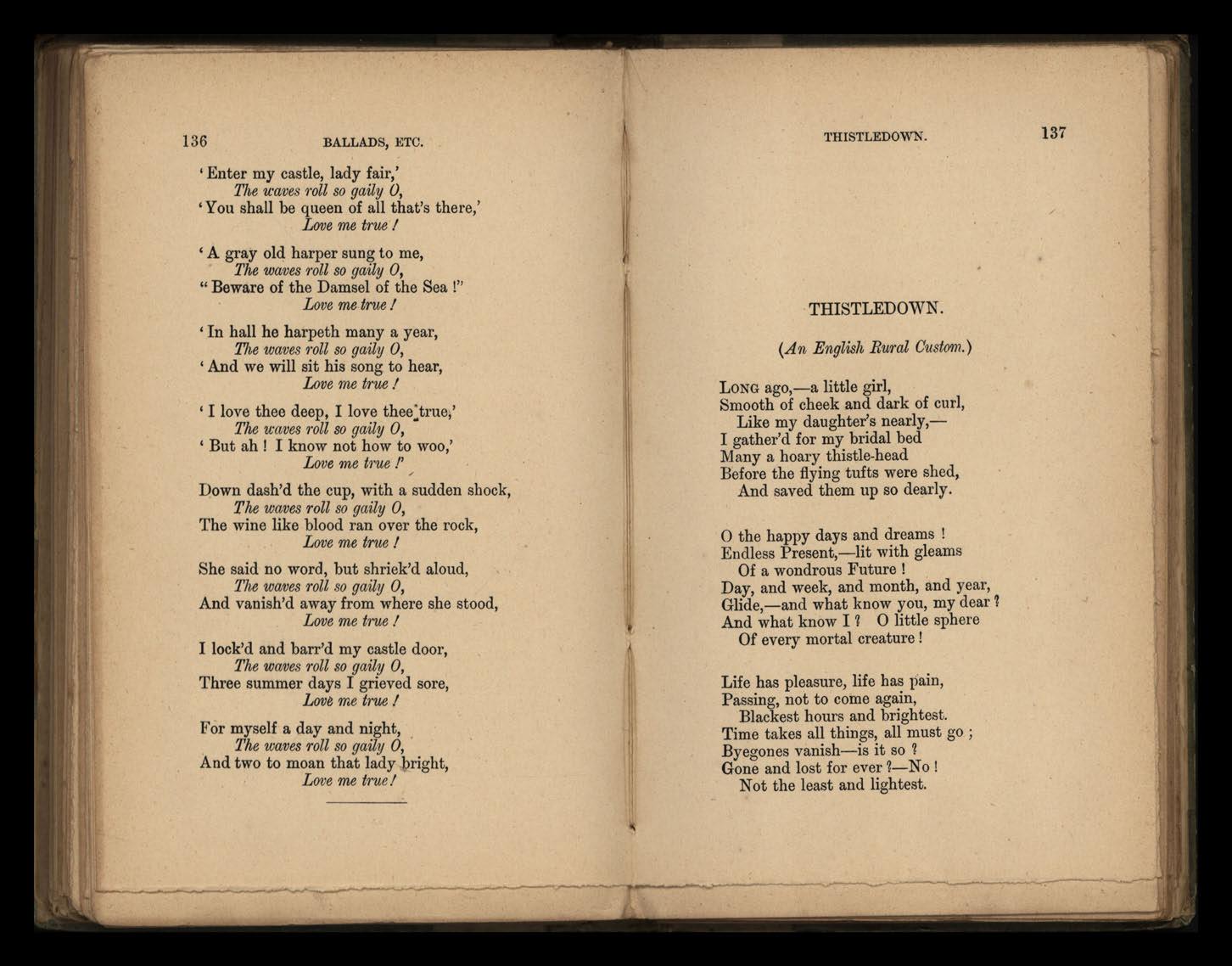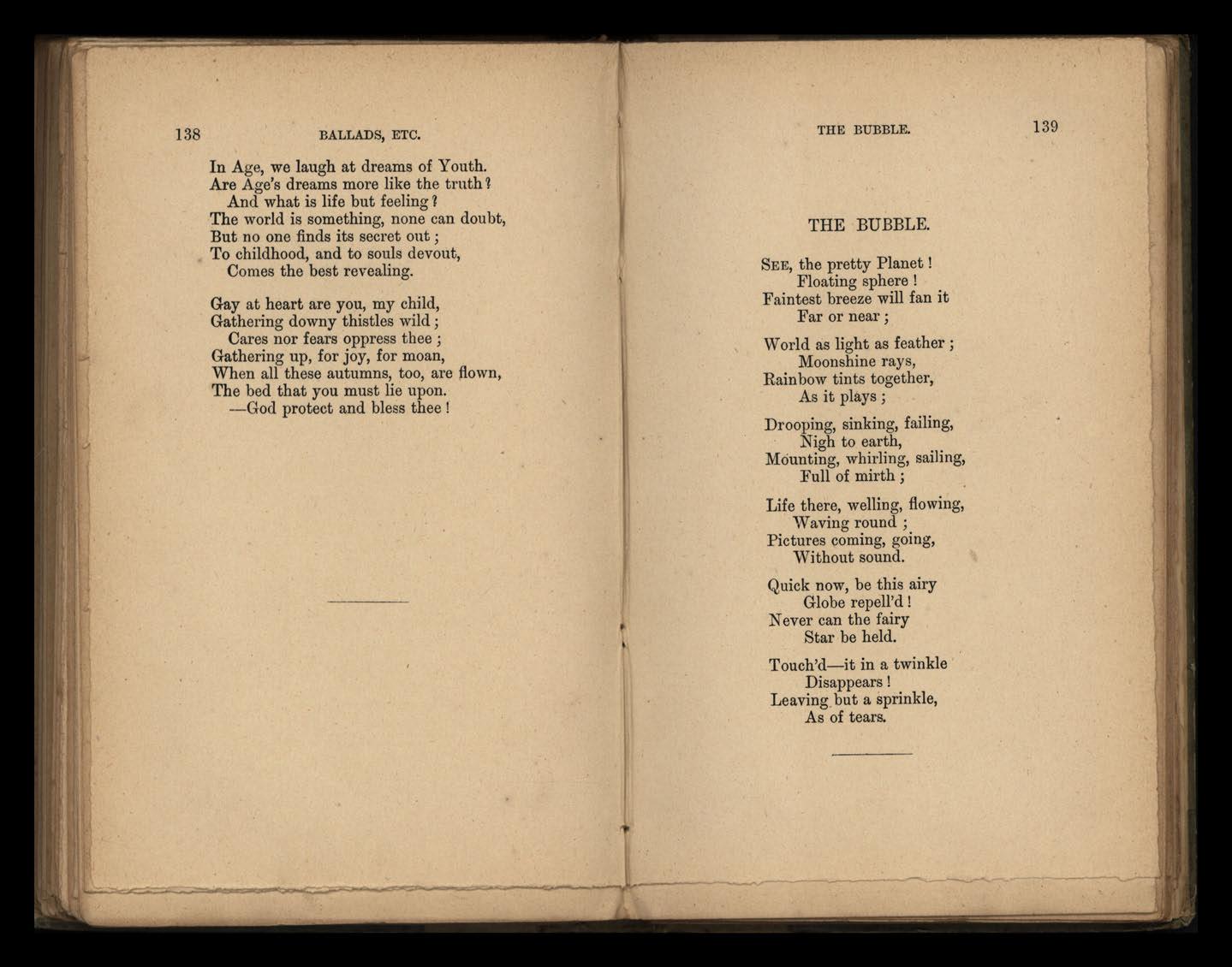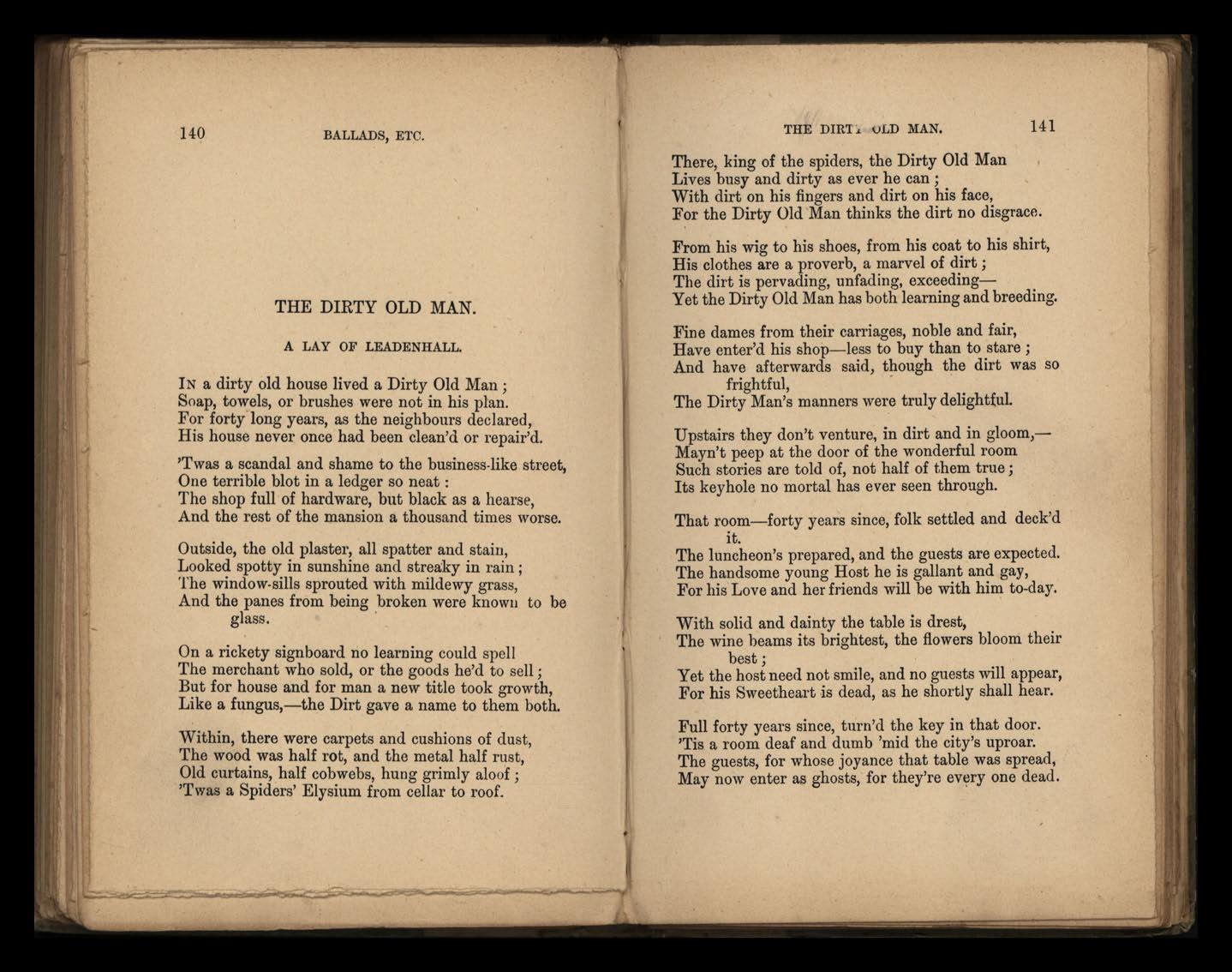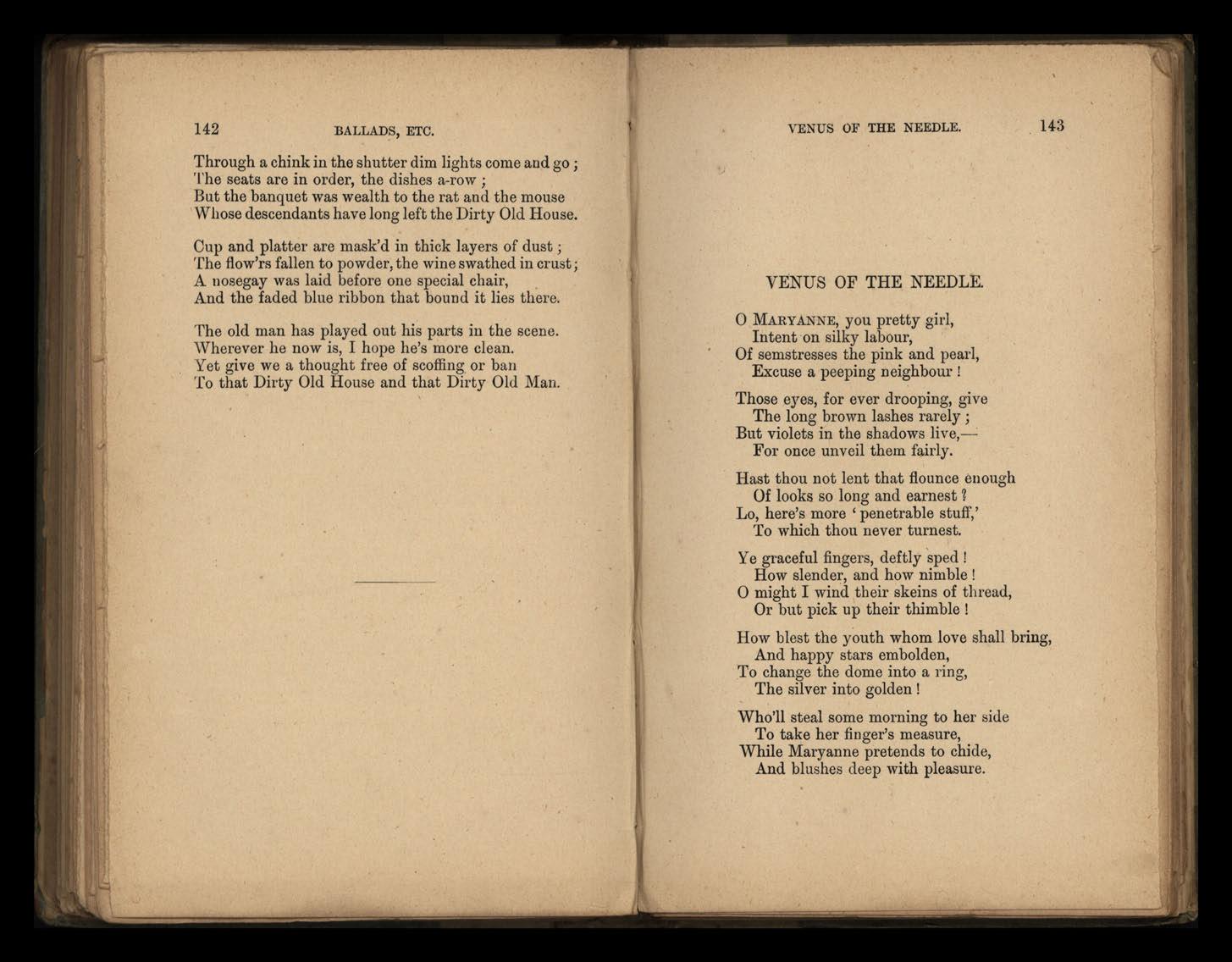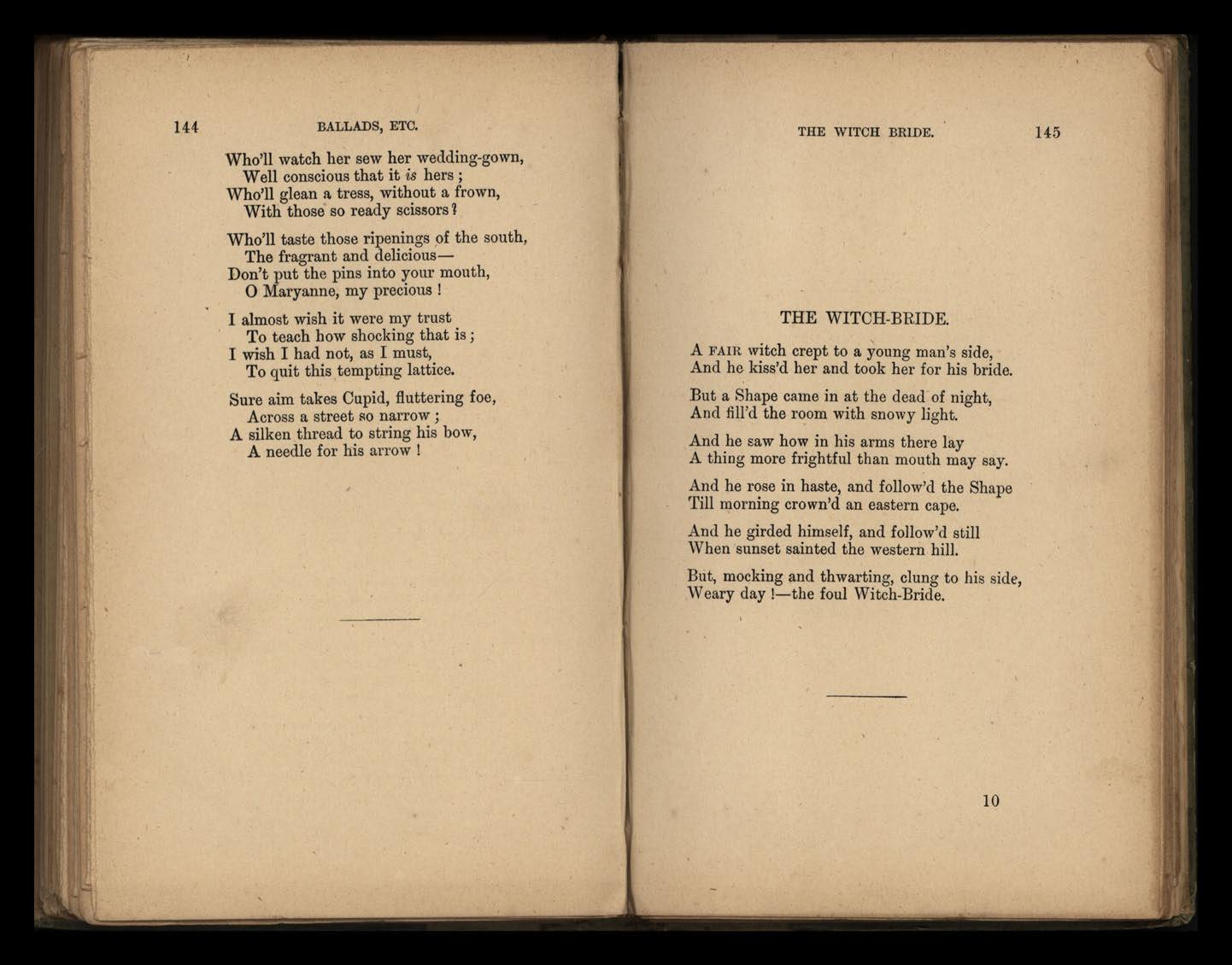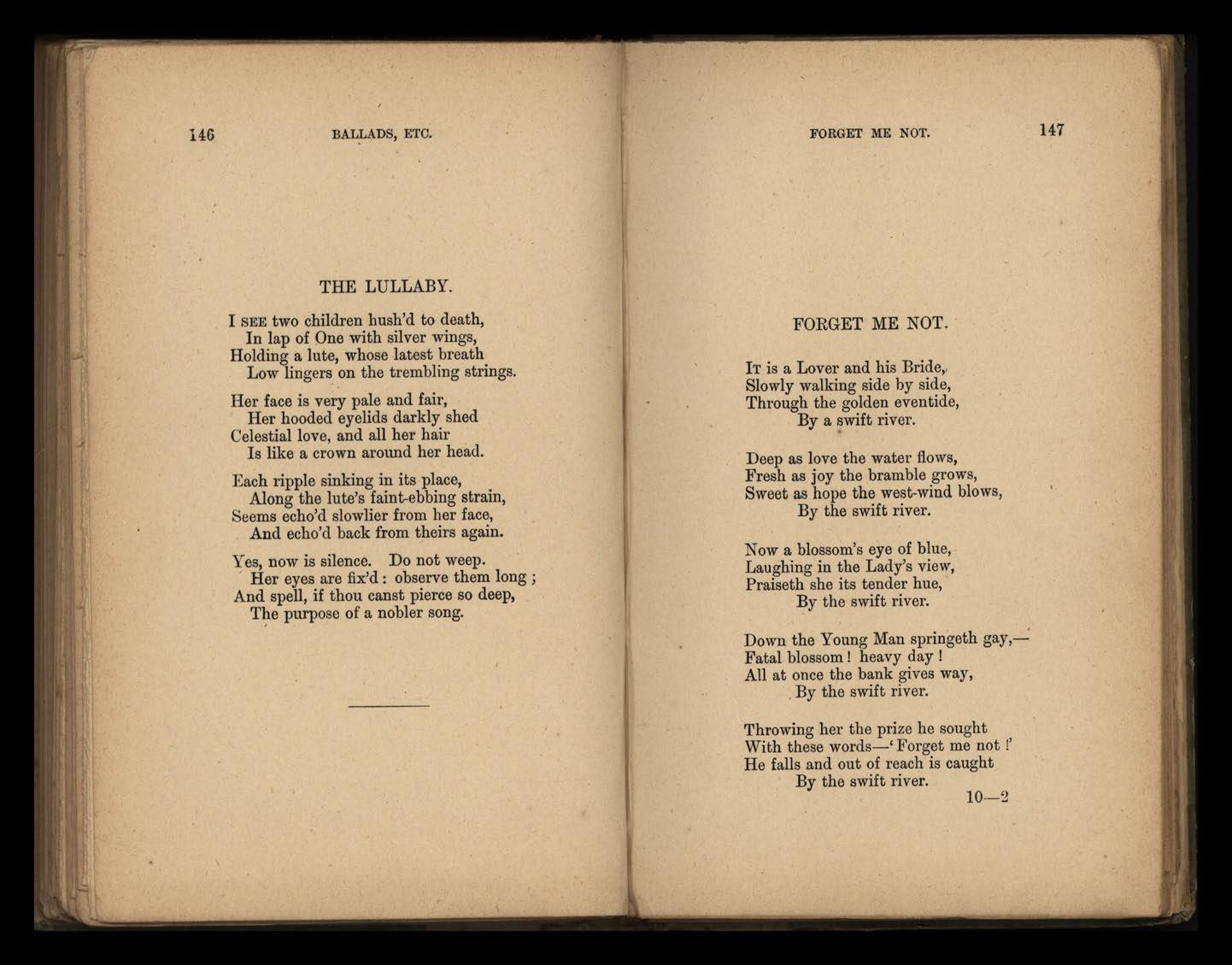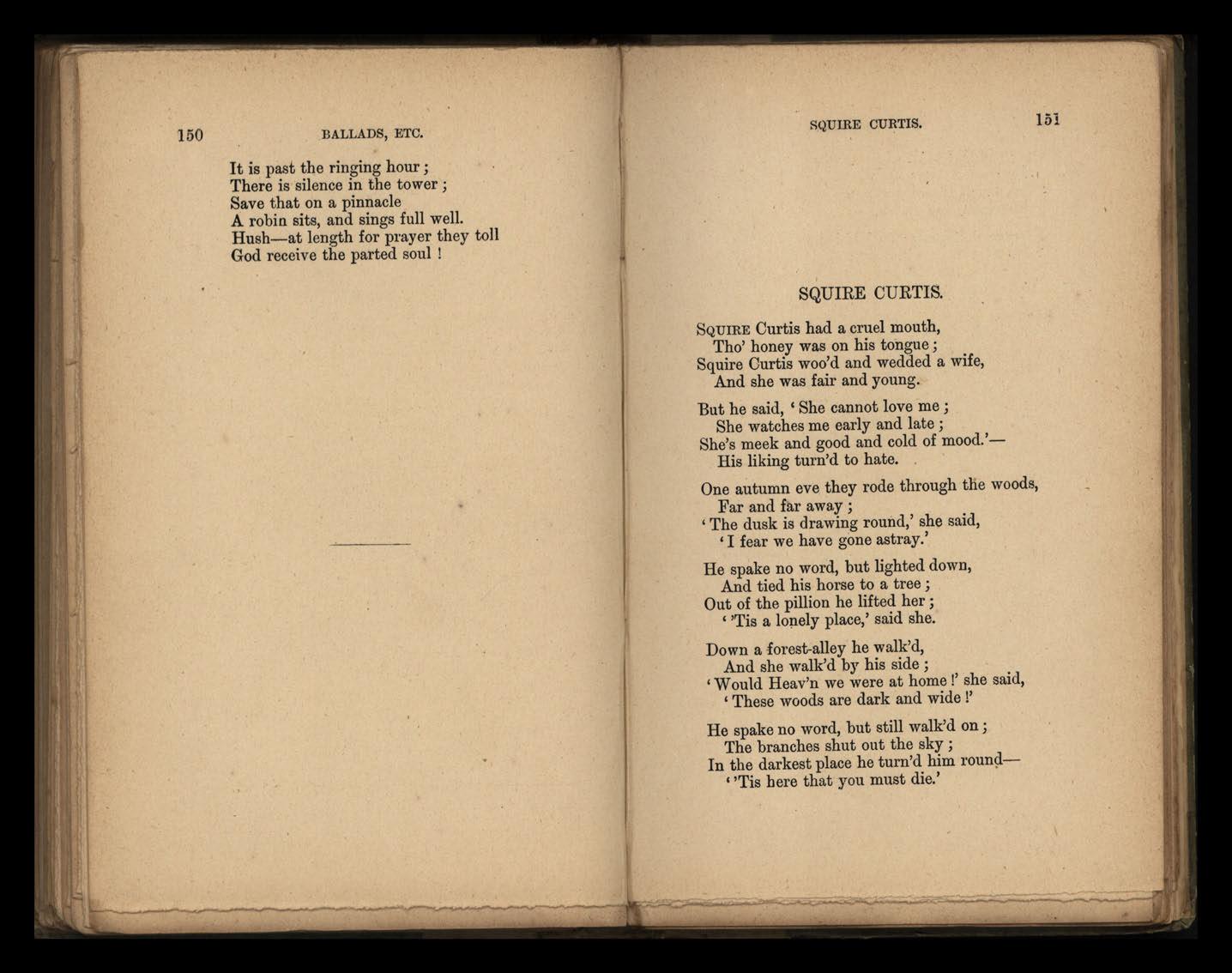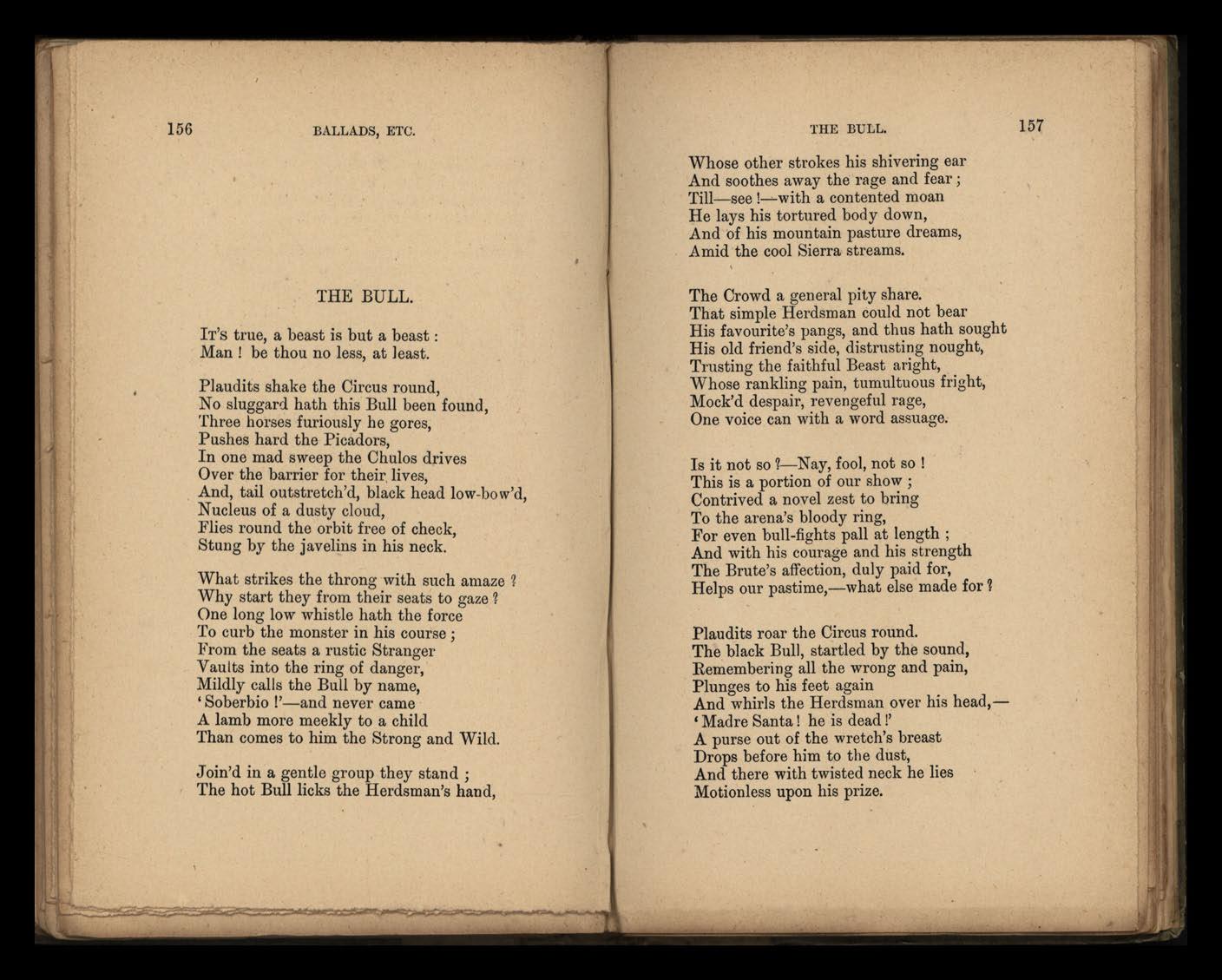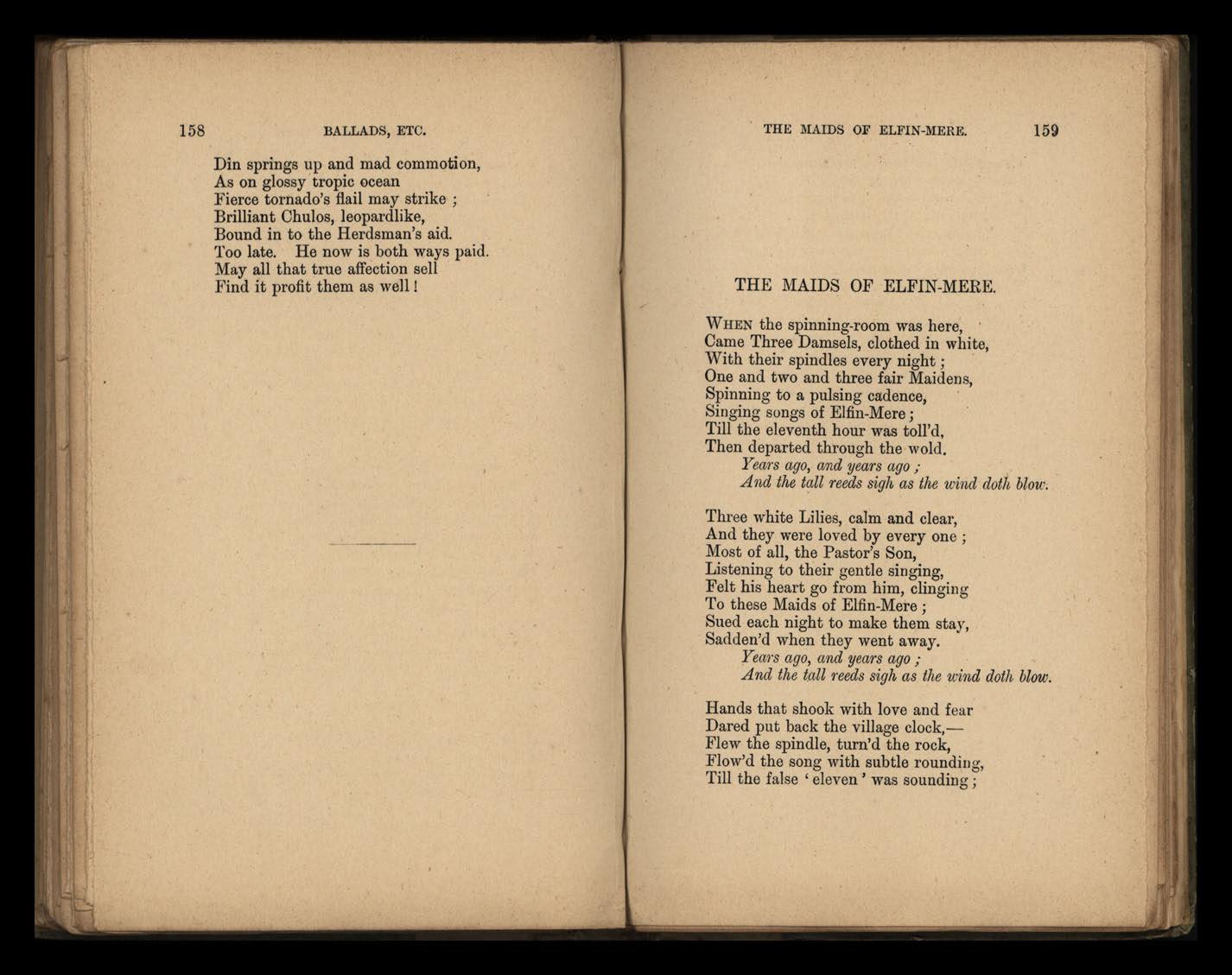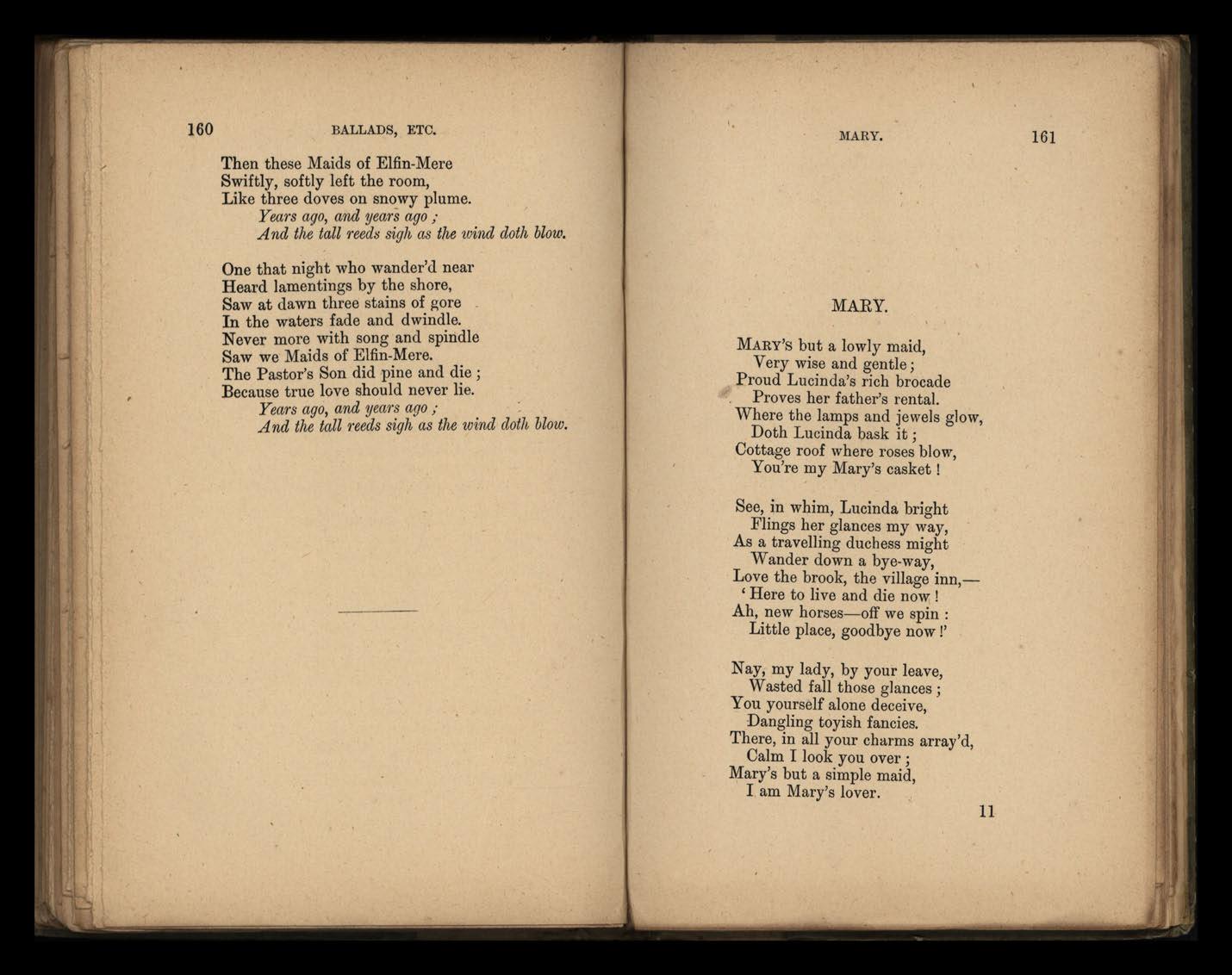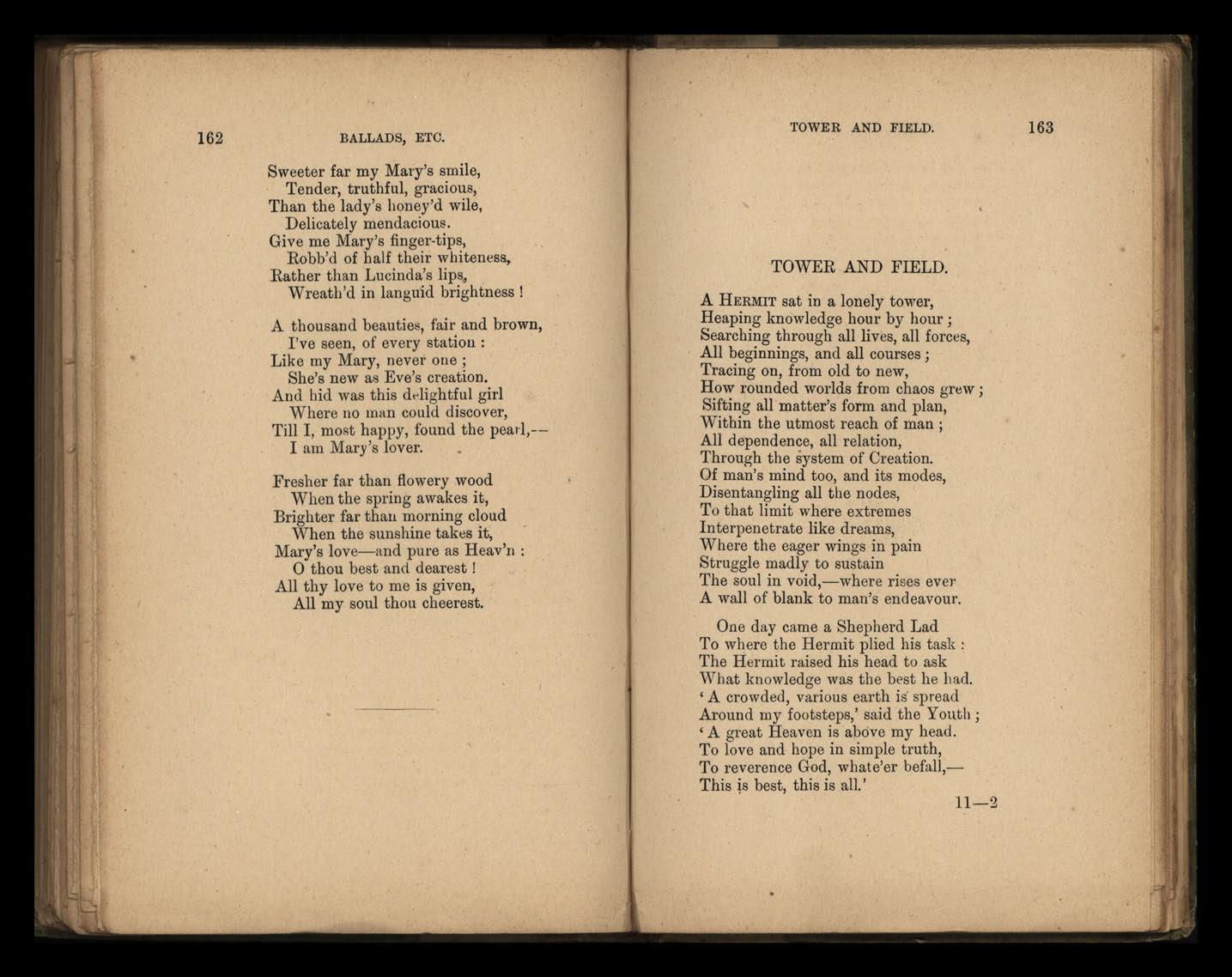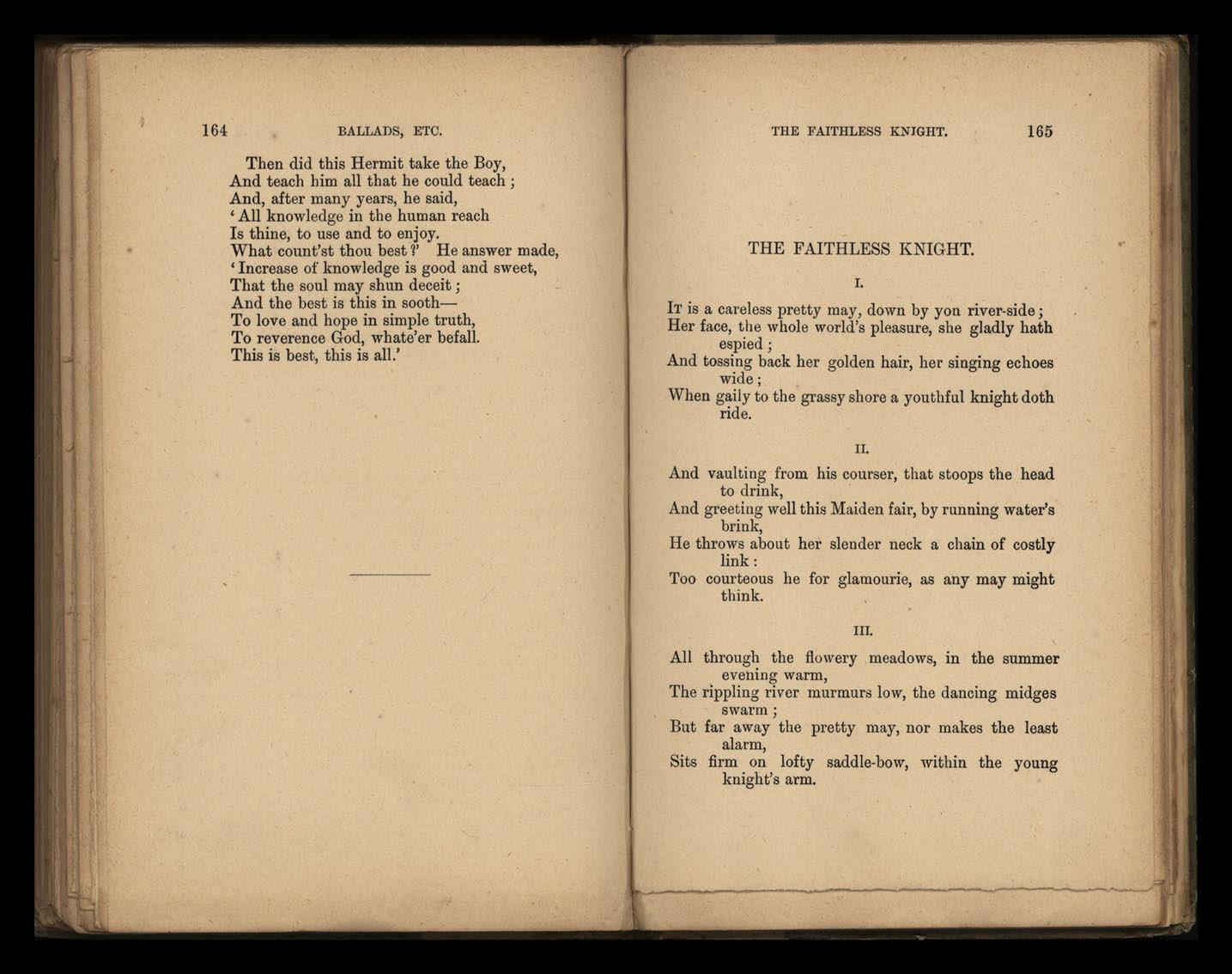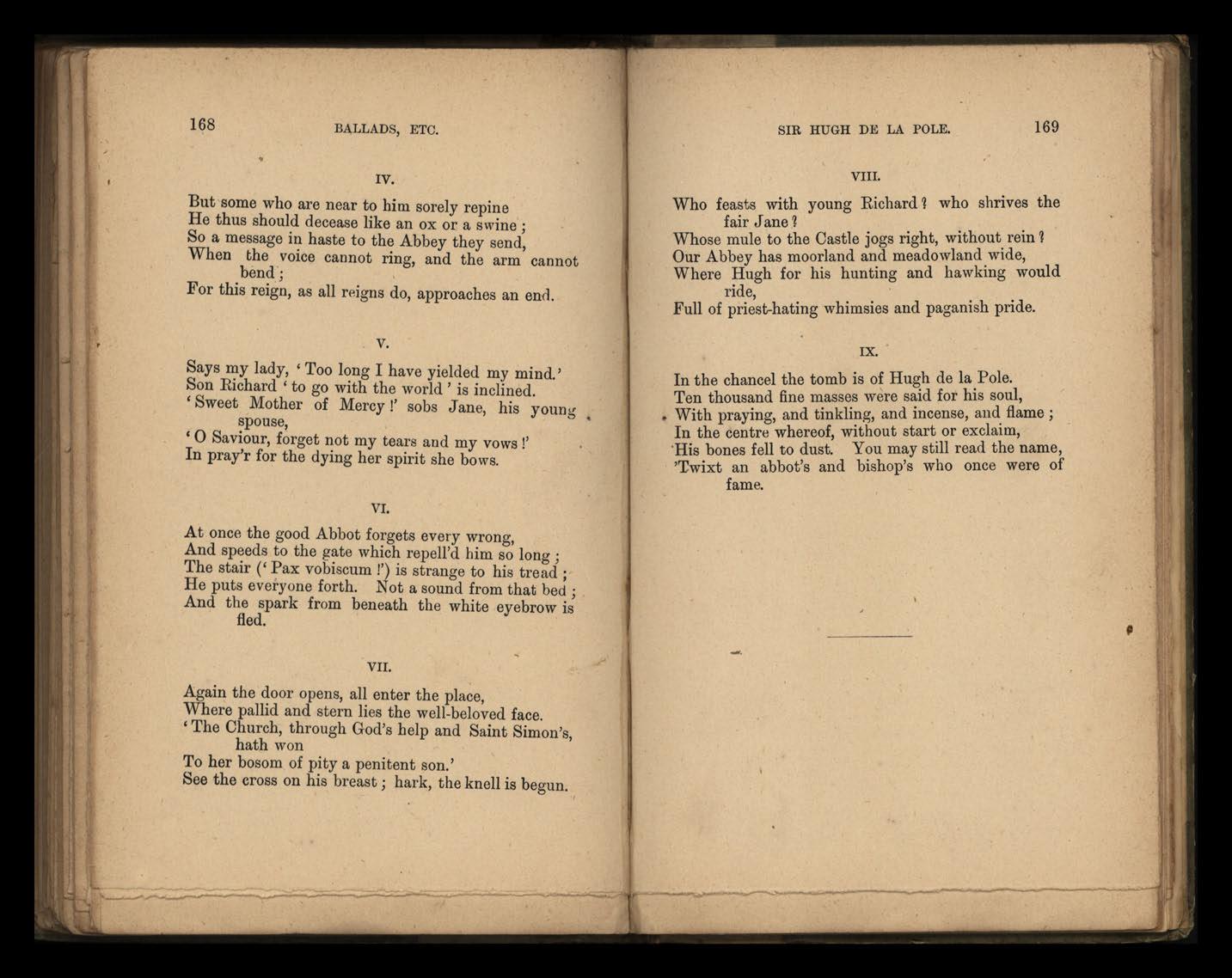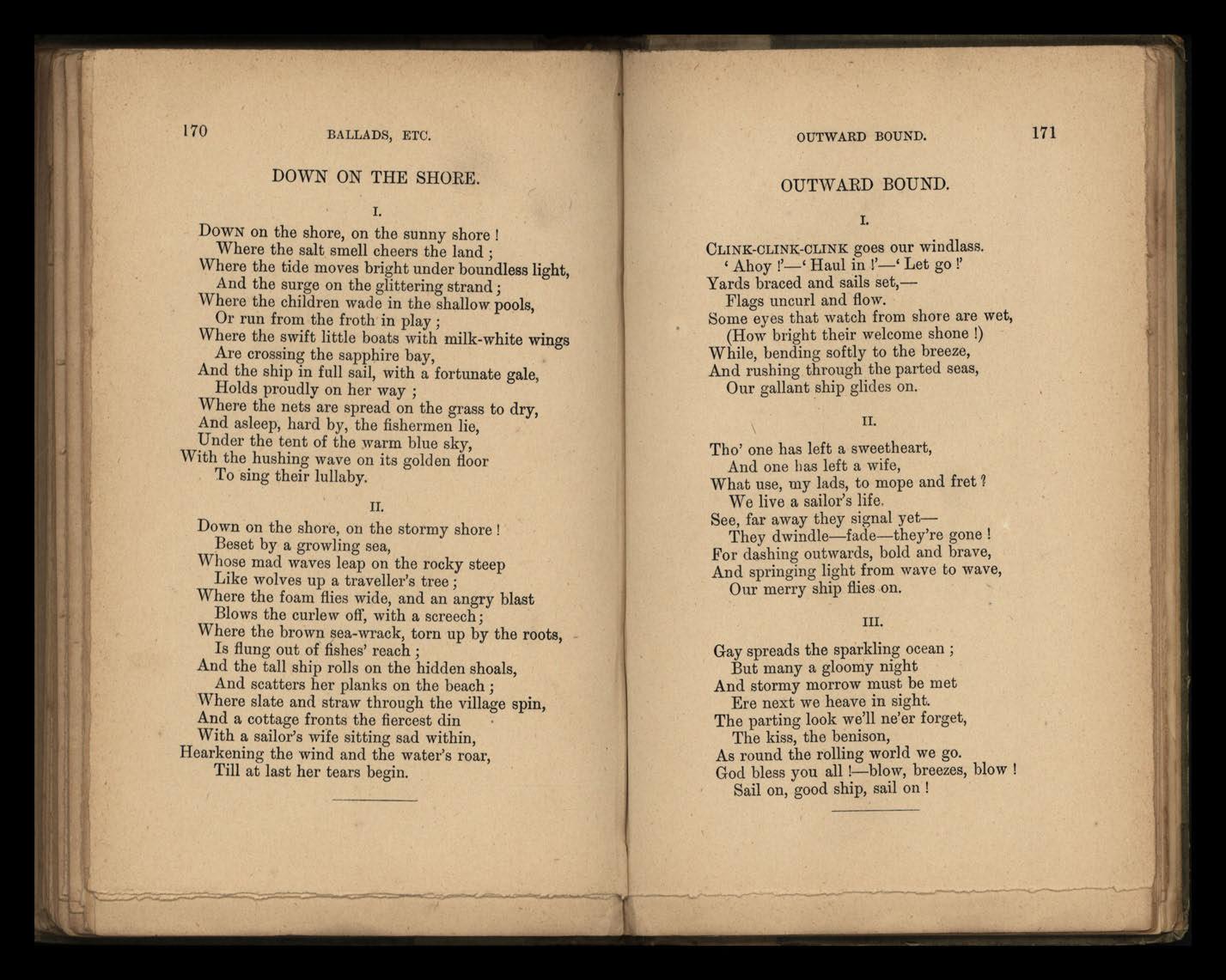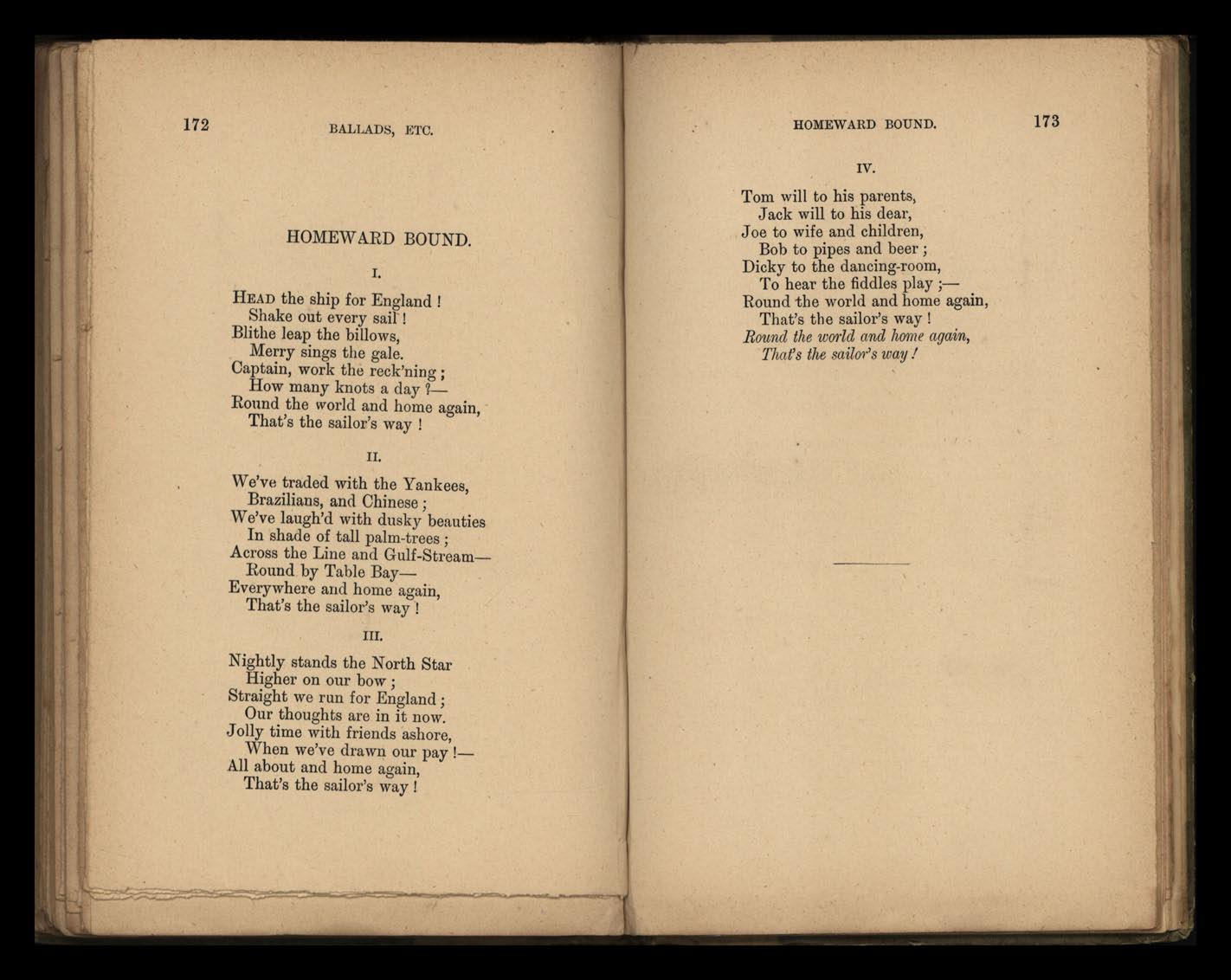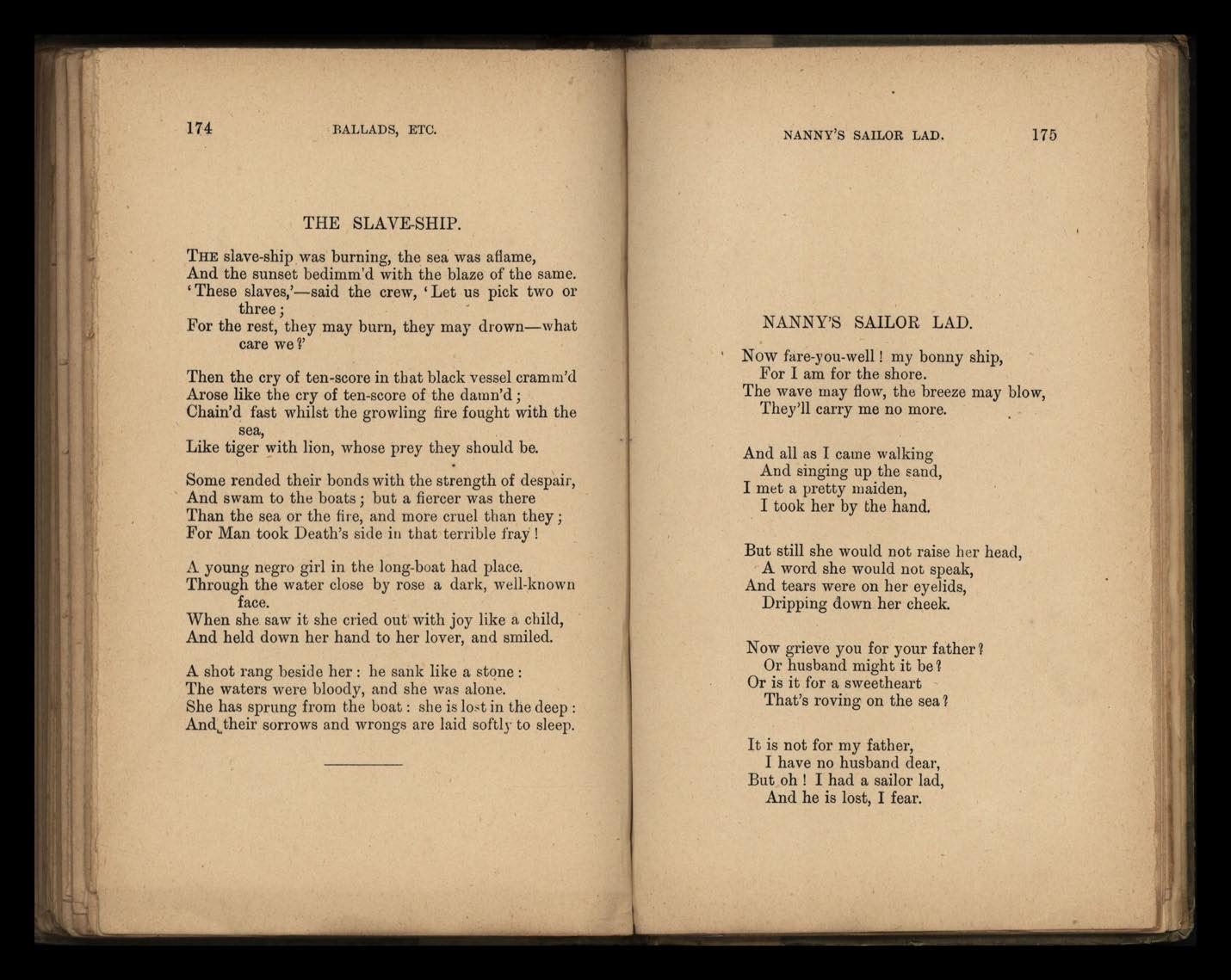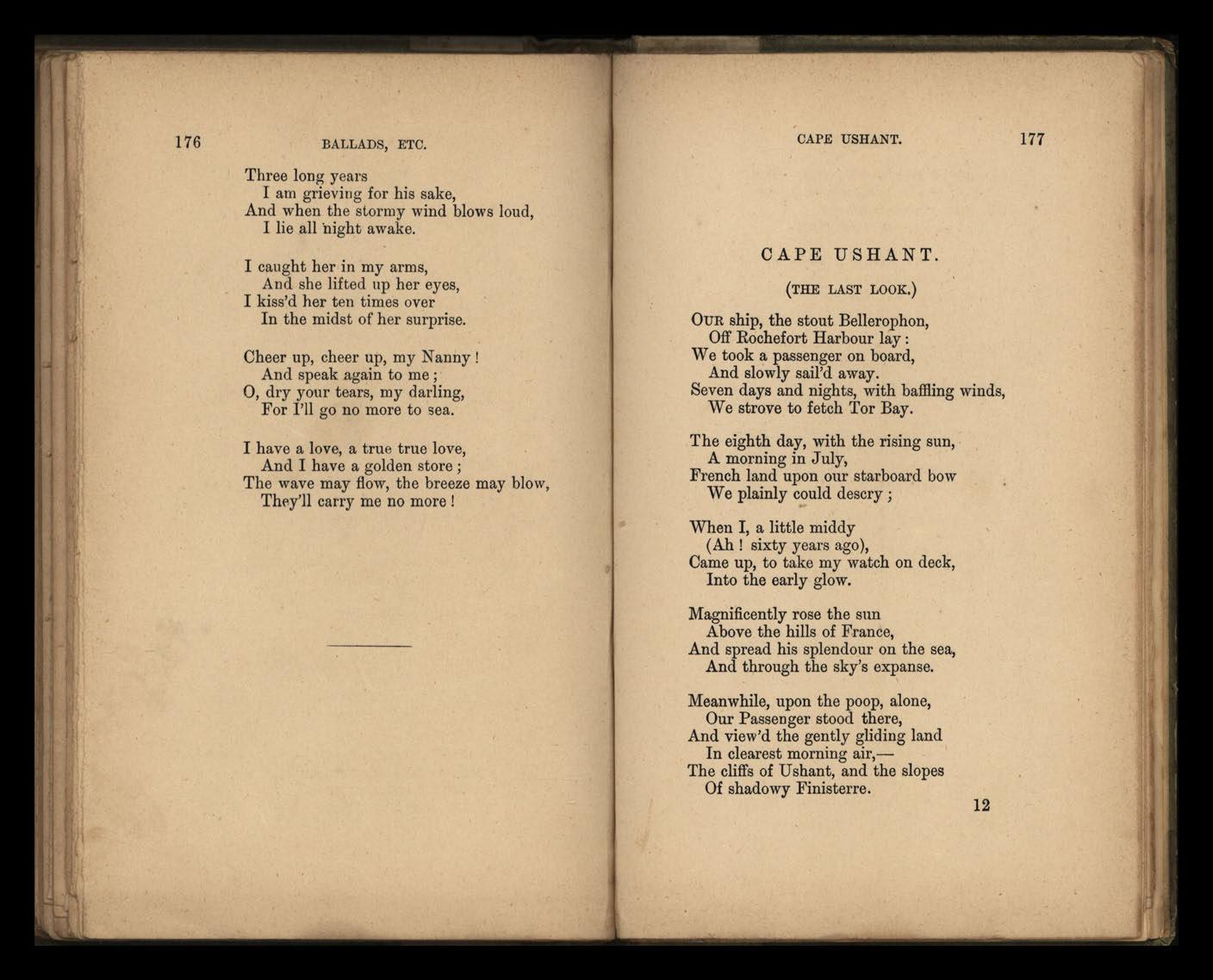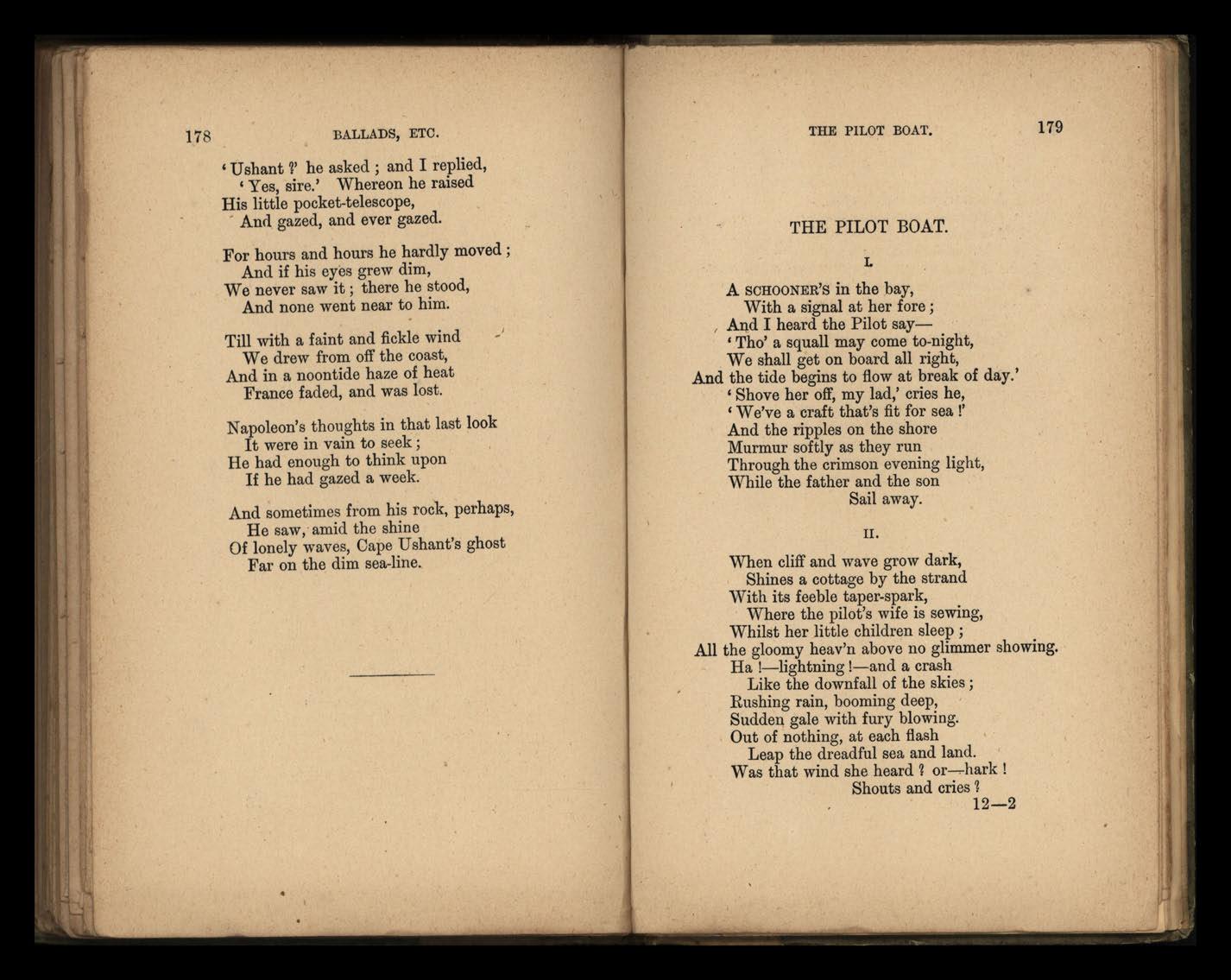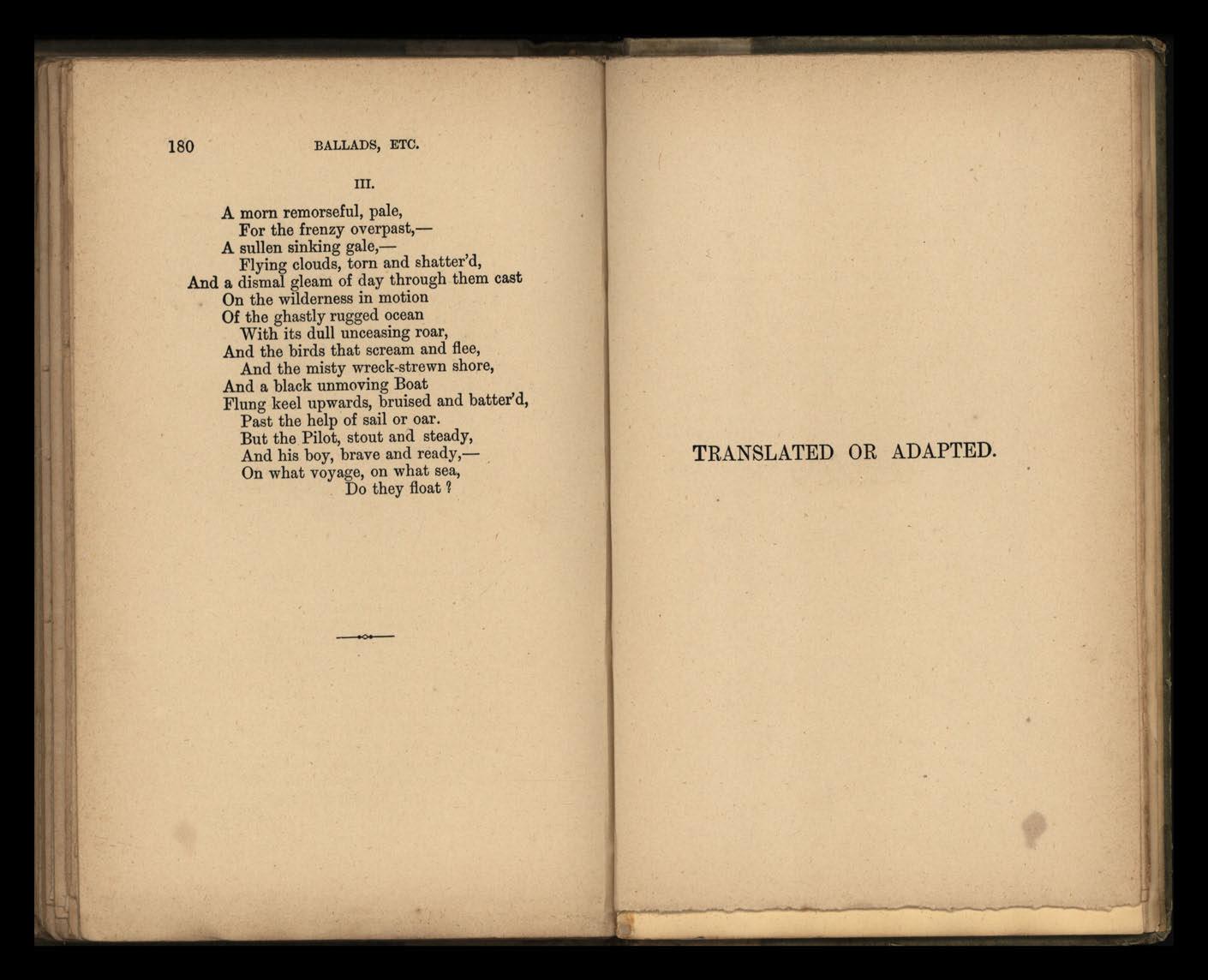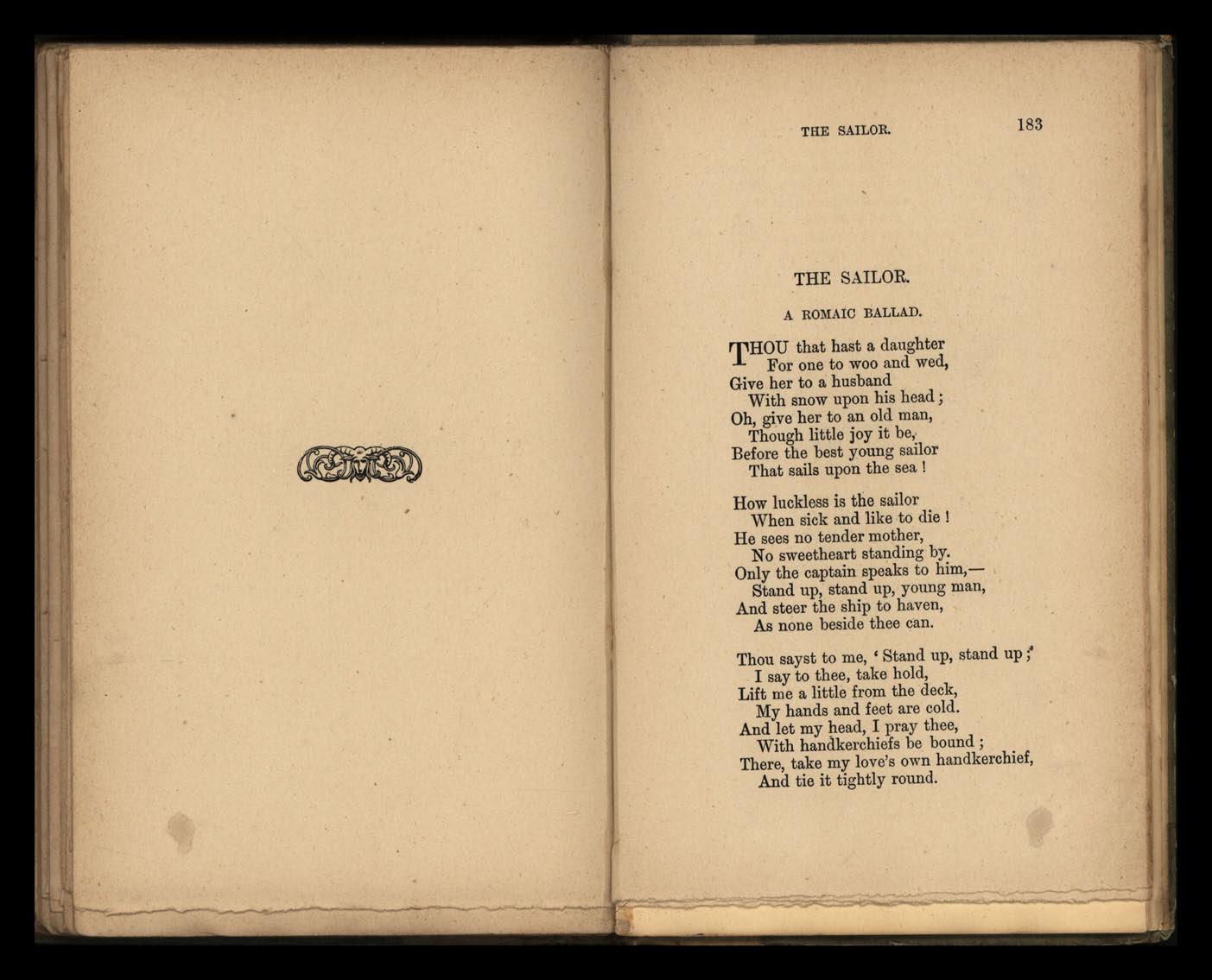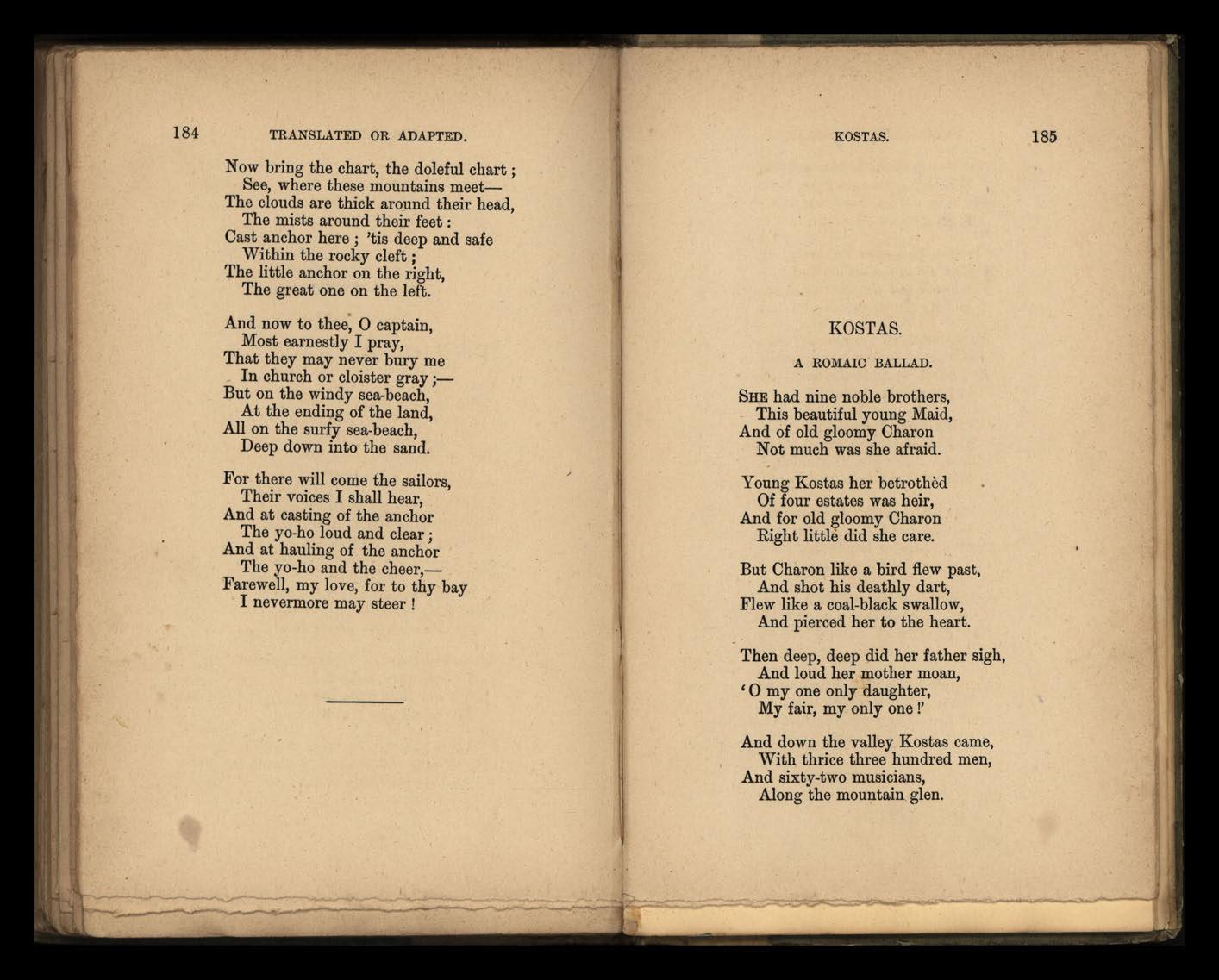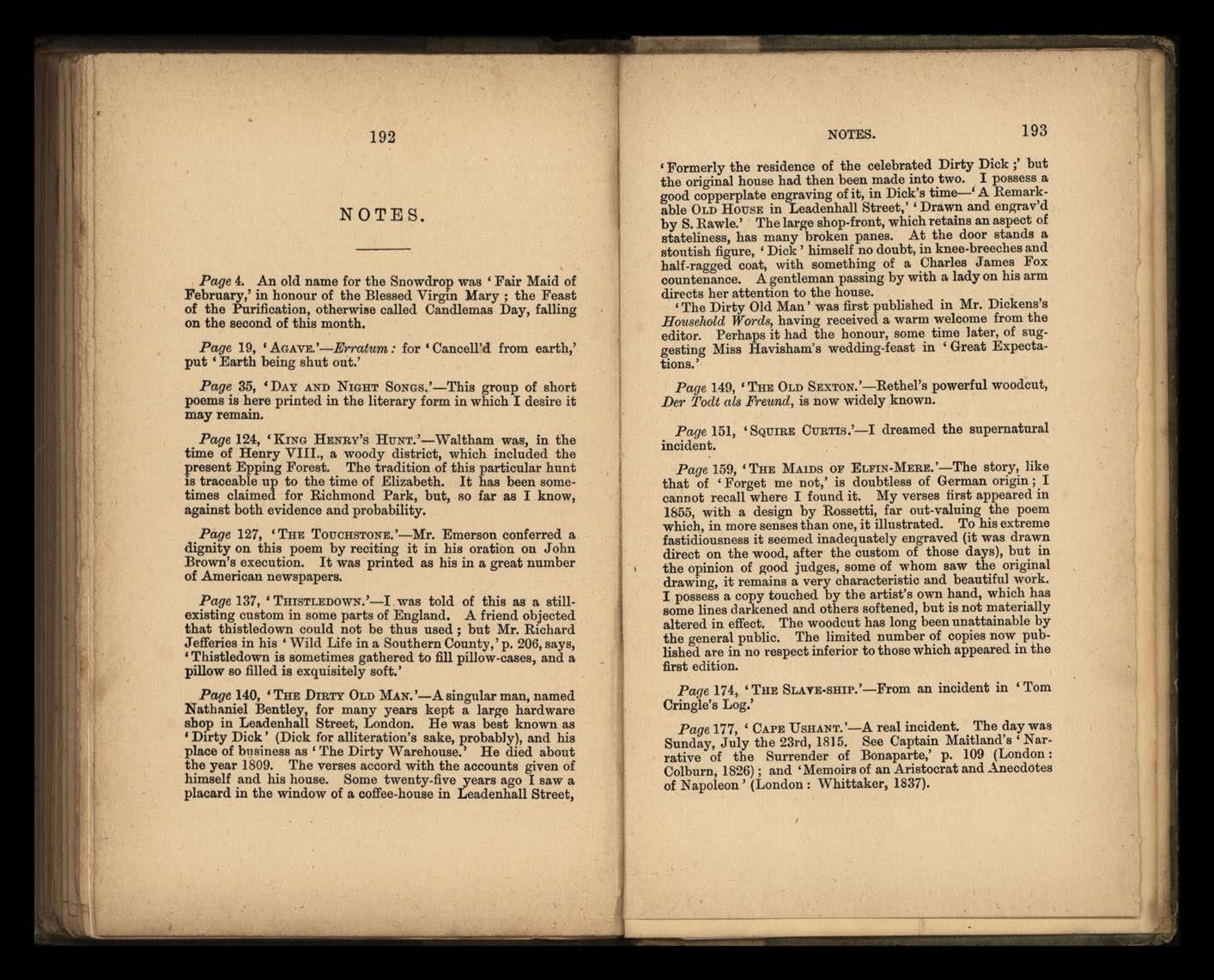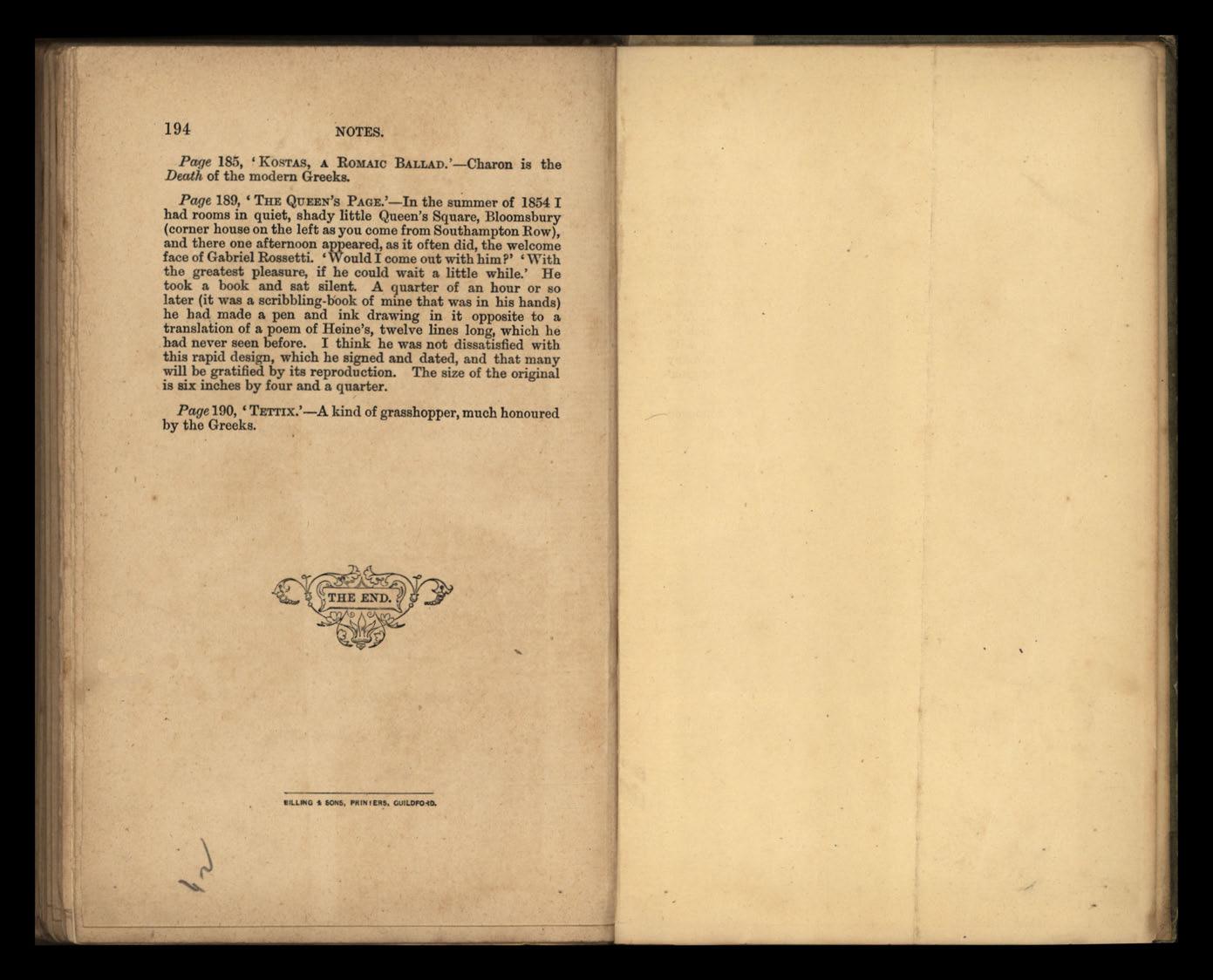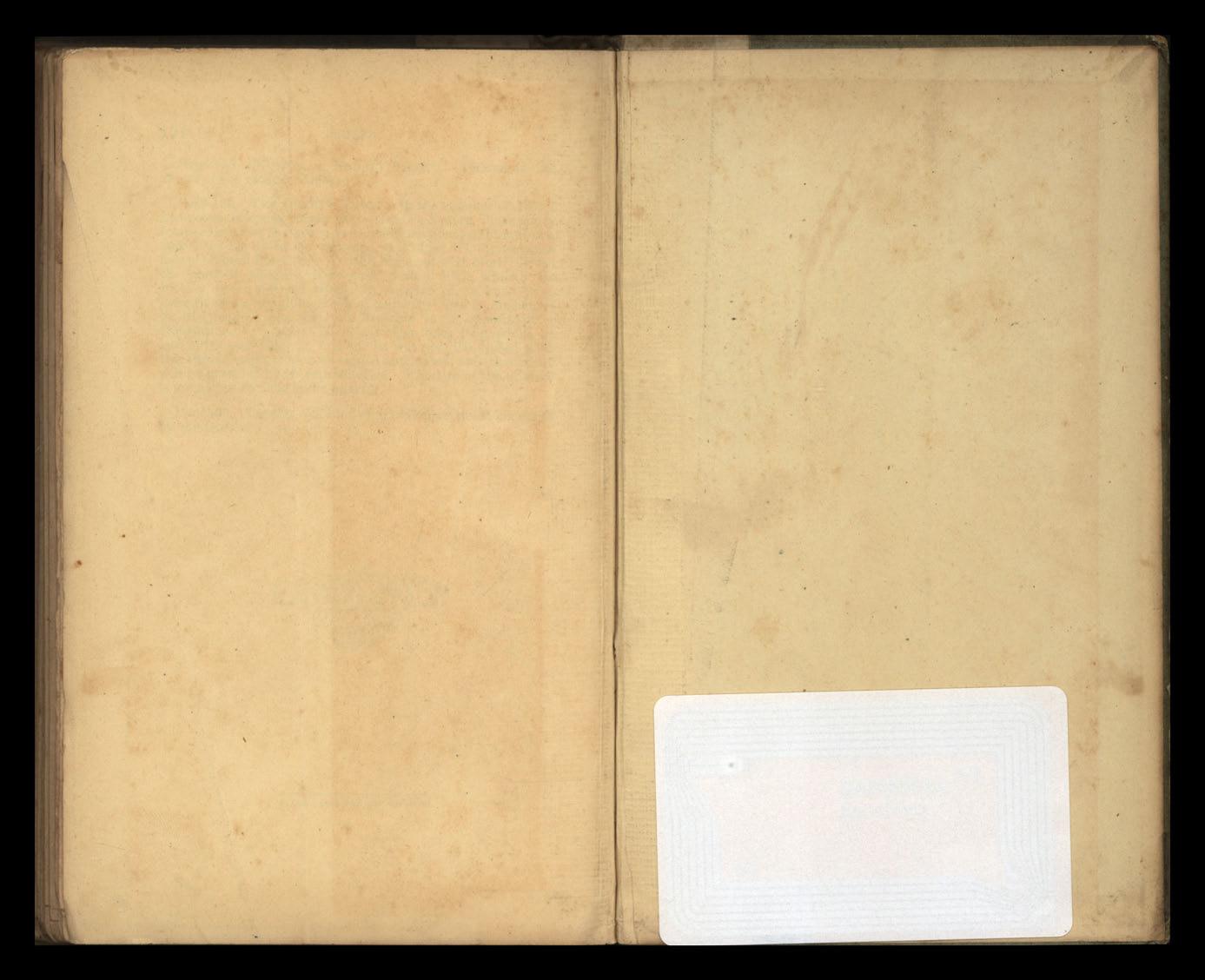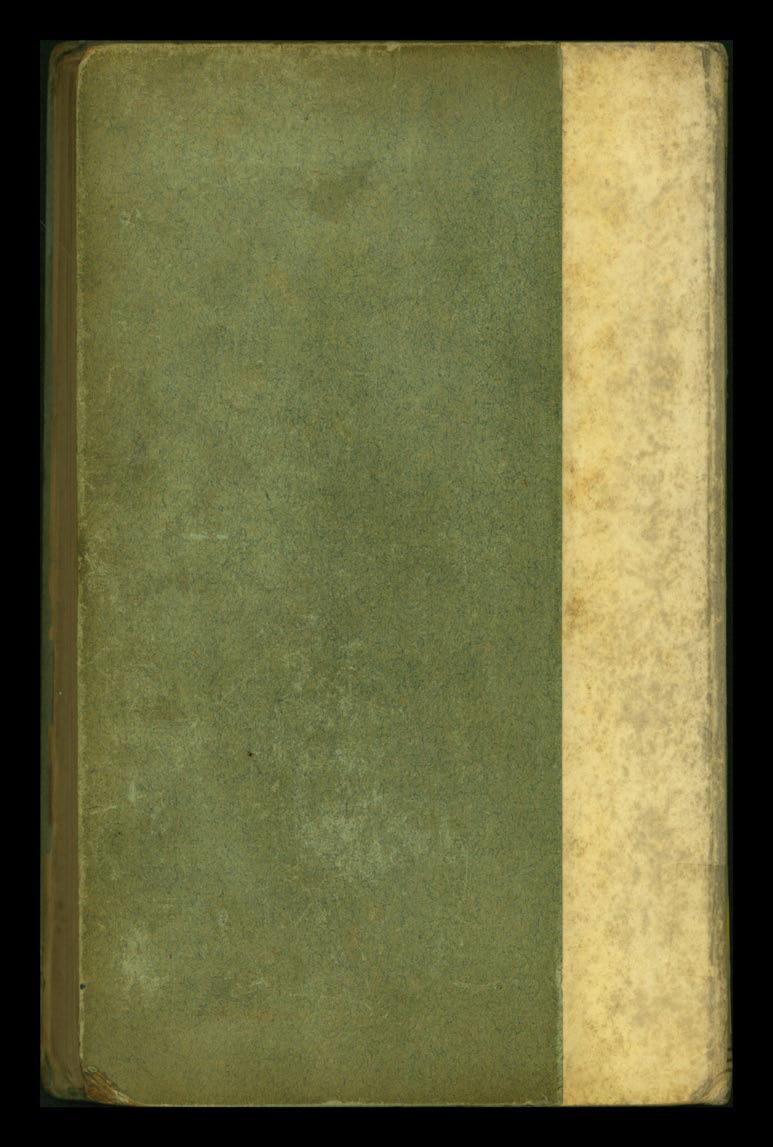FLOWER
PIECES AND OTHER POEMS
BY WILLIAl\1 ALLINGHAM
LONDON
REEVES AND TURNER, 196, STRAND 18 88
[All R ig h ts R eser?,ed ]
EGYPTIAN
viii CONTENTS.
DAY AND NIGHT SONGS.
'Tlll!:SE LITTLE SONGS'
THE LOVER AND BIRDS A HOLIDAY - IN A SPRING GROVE THE LITfLE DELLA SEED A VERNAL VOLUNTARY SPRING. BY THE MORNING SEA 'FOUR DUCKS ON A POND' WINDLASS SONG THE FIELDS IN MAY SPRING IS COME A RAINBOW ACROSS THE SEA THE ON THE SUNNY SHORE THE WAYSIDE WELL HALF-DREAMING EVEY
THE QUEEN OF THE FORES'f IN A BROKEN TOWER AFTER SUNSET IN THE DUSK
.lEOLIAN HARP: '0 PALE GREEN SEA.' ON THE TWILIGHT POND UNKNOWN BELOV'D ONE SERENADE -
AUTUMN.
AUTUMNAL SONNET
.lEOLIAN HARP: 'HEAR YOU NOW'
.lEOLLAN HARP: 'WHAT IS IT THAT IS GONE l' AWAKING -
ROBIN REDBREASTTHE SHOOTING STAR THE VALLEY STREAM SOLUS CONTENTS.
.lEOLIAN HARP: 'WHAT SAITH THE RIVER l' LATE AUTUMN TWO MOODS TWILIGHT VOlUESA GRAVESTONE ',0 HOW DIMLY' -
BARE TWIGS FOOTSTEPS -
.lEOLIAN HARP: 'IS IT ALL IN VAIN l' THE LIGHTHOUSE NIGHTWIND ANGELA ON THE LONGEST DAY THE WINTER PEAR HALF-WAKING WINTER CLOUD FROST IN THE HOLIDAYS 'THE BOY FROM HIS BEDROOM-WINDOW' OH! WERE !\IY LOVE' SONG: '0 SPffiIT OF THE RUMMERTIME !' RISING OF JUPITER WINTER VERDUREEVENING PRAYER -
BALLADS, ETC.
LADY ALICE KING HENRY'S HUNT THE TOUCHSTONETHREE FLOWERSTHE WONDROUS WELL BLACK NIGHT THE POOR LITTLE MAIDEN ST.
x
THE BUBBLE
THE DIRTY OLD MAN
VENUS OF THE NEEDLE
THE WITCH·BRIDETHE LULLABY FORGET ME NOT THE OLD REXTON SQUIRE CURTIS EMILY
THE Bl:LLCONTENTS.
THE MAIDS OF ELFIN-lIIERE lIlARY
TOWER AND FIELD
THE FAITHLESS KNIGH'f SIR HUGH DE LA POLE DOWN ON THE SHORE OUTWARD BOUNDHOMEWARD BOUND THE SLAVE SHIPNANNY'S SAILOR LAD
CAPE USHANT THE PILOT BOATTRANSLA TED OR ADAPTED.
THE SAILOR KOSTAS
THE FISHERMAN 'fHE QUEEN'S PAGE TO THE TETTIX
FLOWER PIECES. :1
FLOWERS AND MONTHS.
I. DAISY.
ODAISY-'
Day's Eye '-on this New Year's Day
Opening thy circlet on our grassy mount
To greet t.he low-arch'd Sun far south-away, As mystically perfect each small ray
As the vast billow of light and life whose fount, Glorious beyond conception, yet doth count
Only as one flow'r in God's garden,-yea, Face, little Bloom, our King-Orb, front to front.
Ye both are creatures of one substance wrought In deeps beyond our subtlest exploration, Thence into living form and due relation
Lifted by power that works in beauty: nought
So made but with its home too in Man's thought, Microcosm of the whole divine creation. 1-2
4 FLOWERS AND ?tlONTHS.
FLOWERS AND MONTHS.
5
Il. SNOWDROP.
(In Time of War.)
FAIR Maid of February-drop of snow
Enchanted to a flow'r, and therewithin
A dream of April's green-who without sin
Conceived wast, but how no man may know j
I would thou mightest, being of heavenly kin,
Pray for us all (thy are pure, altho' .
The soil be soak'd WIth tears and blood), to WIll
Some ruth for human folly, guilt and woe.
A flitting phantasy and fond conceit!
Yet mark this little white-green bell, three·cleft,
N or say of miracles the Earth's bereft.
Lo for our comfort, here is one complete :
And after this the whole new spring-time left, And all the roses that make summer sweet.
Ill. DAFFODIL.
GOLD tassel upon March's bugle-horn,. . Whose blithe reveille blows from hIll to hIll
And every valley rings-O Daffodil!
What promise for the season newly born
Shall wave on wave of flow'rs, full tide of corn, O'erflow the world, then fruited Autumn fill Hedgerow and garth Shall tempest, blight, or chill
Turn all felicity to scathe and scorn
Tantarrara! the joyous Book of Lies open, writ in blossoms j not a bud
Of evil augury is seen or heard :, .
Come now, like Pan's old crew we 11 dance and smg, Or Oberon's; for hill and valley ring
To March's bugle-horn,-Earth's blood is stirr'd.
6 FLOWERS AND MONTHS.
IV. PRIMROSE.
THE rancour of the East Wind quell'd, a thrush Joyfully talking on through glittering rain, o see the yellow tufts along the lane, Crowding the copse round every budded bush, Dotting the dingle by its brooklet's gush, And elm path's mossy border,-who not fain To drink their tender sweetness, cool and fr esh, The very breath of Spring, return'd again
The Child's Flow'r, in the childhood of the year: Our slopes and woods but yesterday were drear, Now all the country breaks into a smile Of Primroses, and Youth is full of cheer; This fragrant vernal breeze in some, the whil e, Waking old thoughts, unutterably dear.
FLOWERS AND MONTHS.
V. HAWTHORN.
A GREEN world, prankt with flow'rs, and fill'd with songs; And if our woodlands have their own May-Queen, Surely to thee, fair May, this crown belongs, With cluster'd pearls upon thy robe of green, And broideries of white bloom; or all one sheen Thou and thy maidens, worshipp'd by the throngs In various verdure-tho' sad Yew is seen Still with the black cloak round his ancient wrongs.
Soft winds o'er sunlit grass bear news of thee. Blue, darkening, feels the moonrise. Then, elate, Thy coaxing Nightingales whose love is great For thee, sweet Thorn, not Rharp as feign'd to be, Call hearts and lips-how loth to separate !Into the shadow of the trysting-tree.
8 ]'WWEnS AND MONTHS,
VI. WILD ROSE.
SOME innocent girlish Kisses by a charm
Changed to a flight of small pink Butterflies, To waver under June's delicious skies
Acros.s.gold-sprinkled meads-the merry swarm
A smIlmg powerful word did next transform
To little Roses mesh'd in green, allies
Of earth and air, and everything we prize
For mirthful, gentle, delicate, and warm.
See, Rosie! sure thy sister-fiow'r it is Sylvestris ?ne h.ath named thee well) ; Mptbmks I could Imagme gloomy Dis
Whirling you, with a wildrose wreath to-dwell In Hades. Only one thing sweet as One thing-come closer-nay, I'll tell !
FLOWERS AND MONTHS.
VII. HONEYSUCKLE.
FIRST a cloud of fragrance. Then one sees Coronets of ivory, coral, and gold, Full of luscious treasure for the bees, In their hedgerow-wreath age manifold
Clustering, or outswinging at their ease, Watching in the hayfield those who hold Scythe and rake, or overpeering bold
Dusty wayfarers 'twixt roadside trees.
Honeysuckle-scented Summer Night!
Leaves above and dewy woods around, Save the purring nightjar not a sound, Save the tender glowing stars no light,Thou haRt hid thy lovers out of sight, Bower'd, or wandering through enchanted ground.
10 FLOWERS AND MONTHS.
VIII.
MEADOWSWEET.
THROUGH grass, through amber'd cornfields, our slow Strealli-
Fringed with its flags and reeds and rushes tall, And Meadowsweet, the chosen from them all By wandering children, yellow as the cream
Of those great cows-winds on as in a dream By mill and footbridge, hamlet old and small (Red roofs, gray tower), and sees the sunset gleam On mullion'd windows of an ivied Hall.
There, once upon a time, the heavy King
Trod out its perfume from the Meadowsweet, Strown like a woman's love beneath his feet, In stately dance or jovial banqueting, When all was new; and in its wayfaring Our Stream let curved, as now, through grass and wheat.
FLOWERS AND l'tIONTHS.
IX.
HEATHER.
VAST barren hills and moors, cliffs over lakes, Great headlands by the sea-a lonely land! With Fishers' huts beside a yellow strand
Where wave on wave in foam and thunder breaks, Or else a tranquil blue horizon takes .
Sunlight and shadow. Few can
The poor folk's ancient tongue, sweet, sImple, grand, Wherein a dreamy old-world half awakes.
And on these hills a thousand years ago
Their fathers wander'd, sun and stars for clock, With minds to wing above and creep below; Heard what we hear, the ocean's solemn shock,Saw what we see, this Heather-flow'r aglow, Empurpling league-long slope and crested rock.
12 FLOWERS AND MONTHS. X. IVY.
GREEN leaves, green flow'rs, green berries, gothic fret
Of woven from year to century,-
On ground, wall, wayside, mountain-crag, old tree, In town or wilderness, the living net Of Ivy richly clothes bare poverty, Adds to the stateliest house a beauty yet, Pathos to ruin'd arch and parapet, With cottage, tomb, can well agree.
No luck misfits thee, Ivy, great or mean, Mirthful or solemn; right for Pluto's bower, Bacchus's jolly garland. Now, serene, You welcome winter, choose for time to flower The month when most things crouch and cower.
Green is Youth's colour. Hail, Prince Evergreen!
FLOWERS AND MONTHS .
XI. CHRYSANTHEMUM.
THE rustic family of Oxeyes claim A royal Cousin, clad in purple and gold, Pearl, ruby, fleecy colours such as fold
The couching sun, and with a lofty name, Chrysanthemum-appearing bright and bold
To startle poor November with a flame Of sumptuous flowerage, making summer tamt', And flush with Eastern pomp the dark and cold.
Voyager from Japan and broad Cathay,
The slant-eyed Yellow People love thee much (All Humans love a flow'r), and know the way To fix their garden favourite with fine touch
In shapes of art: how joyful we to clutch
Their gifts-but shall we clasp their hands one day
14 FLOWERS AND MONTHS.
XII. GORSE.
BLOOM of the Common, common bloom, gold honey, Sweet like a healthy life in every season, Nature still grows thee, Gorse, regales her bees on Stretches of English land, wide, windy, sunny, Free from the fetters of that monster, Money, Big with delusive promise full of treason; Harbours the wren, the furzeling, and the coney, Feeds goose and ass there,-Soul too, lord of reason.
Wild wealth of merry May, of dim December!
Swedish Linnreus fell upon his knees
To thank with joy the Everliving Power (No scraps of lore forbade him to remember)
Giving such wondrous beauty to a Flower, To Man the beauty-loving eye that sees.
FLOWERS AND POETS.
LOKG years ago these Flowers were cull'd, Entwining gentle Names: By younger hands be others pull'd To garland other fames.
16 FLOWERS AND POETS.
PRELUDE.
LIKENESS, ofter found than sought
Or by wit's exertion wrought, Here'tween two delights exprest, In the various tinge is drest Playing on it from affection's Sympathizing recollections. When you find the fancy just, Wreathe the Blossom round the Bust.
N or of Fancy's birth may be Every correspondency.
Say that matter's but expansion
Of that force whose central mansion
Is the soul that each man shares, And so each like Atlas bears on's shoulders-in his head, Here involved, what's there outspread j I
Thus each modal element
A faculty doth represent, And the beauty creamed in Flowers
Mind's distinct poetic powersPoured in both from one completeness Into various moulds of sweetness j
Say that we, in scanning over Do not fancy, but discover Where the Inner's like the Outer j Then, whoe'er will be a doubter, Let him prove it is not so.
I meantime my guesses show, And my fellow-children bid Search where mother's hand hath hid.
FLOWERS AND POETS.
ONE summer noon, all carelessly dispread 17
WALLFLOWER
THIS dark-red Wallflower seemeth well to me
DAN CHAUCER'S emblem meetest for to be :
So rich it is, yet sturdy in its hue j
So sweet in scent, yet very wholesome too j
So freshly thriving in a homely place,
Yet in the rarest knots a welcome grace.
HONEYSUCKLE.
Where lush green trails a thickest bower did form I gazed on trumpet-blossoms overhead '
D:opping with honey sweetness, amber-warm, Tlll sleep came softly. Oh, what maiden charm
Flush'd dainty-bright that bower, in vision seen! noble .knighthood there did swiftly arm
For hlgh empflSes of the Faery Queen!
Murmuring a word, I woke-'twas SPENSER'S name I ween. ' 2
18
FLOWERS AND POETS.
RQSES.
ALL Roses be the crown for SHAKESPEARE'S head,
The half-green buddings and the bossy blooms, Virginal white and tender maiden-blush,
Nor that rejected where a canker's hid
To move us more than beauty, rival flow'rs
Embracing here of York and Lancaster,
Shy wildin gs from the forest, proud ones woo'd
By nightingales in gardens of the South,
Or worn by Cleopatra,-rose on rose, Roses from every region of the world!
Vicegerent to Queen Flora, free thou giv'st
Thy royalty the air, thy favours fling
To cottage threshold or a palace-hall, Or delicately wreathe the wayside hedge;
All zones are native to thee; never sun
Can scorch the whiteness of thy pearly brow,
Or wan the flushing of thy ch erub cheek;
Unsickly is thy spirit, and breathes out
Exhilaration, buoyancy and triumph, Wedded to richness without parag on;
That even thy ca s t-off leaves are precious things, And thy nice essence of a dearer rate
Than the oft-furnaced gold,-O rarest thou And commonest, most cheap, most prizable,
Of all the Flowers in garden or in field,
Of all that earth from ea st to west can yield!
FLOWERS AND POETS. AGAVE.
AMID a space of garden ground,
Proud of Its old ancestral seat in ken
Of Andes or of Appalachian hills,
The AGAVE towers, and step by step is built
Above its weighty leaves the mass of bloom pyramid, with which compared, Flowers at Its base appear like shepherds' huts those Nilotic structures that beheld
ISIS and .O,rus and the Memphian Gods, LOJ?g rum d, they still firm.
For whom but thee
(Although .of foreign stock its piled wealth), ° BlInd Man of England, to whose sight, Cancell d from earth, unroll'd the Wars of Heaven And sweetness of the primal Paradise,-
For whom but thee, this mighty Agave blows? HYACINTH.
FOR KEATS, ° Hyacinthus, thus dost show
Thy curling bells of crisped snow, Ingramed pure as snow's first featherinoOr dyed like the richness of Night's Or sapphire morn, or roseate even-bloom ' And loaden with luscious perfume.'
Were but thme old inscription legible 'Twould suit our modern loss too sadly well. 2-2
20 FLOWERS AND POETS.
EGYPTIAN LOTOS.
A MIGHTY stream from undiscover'd fountains
Pours through an ancient and deserted land,
With cities of the dead along its mountains, Tombs of forgotten kings amid its sand, And shatter'd temples, where the priestly band
With all their gods have moulder'd ;-on its tide
This necromantic Lily doth expand,
Unveiling like a pale and queenly bride, And float-as loved to float ALASTOR dreamy-eyed.
SWEETBRIAR.
LEIGH HUNT, the bloom I name for thine
Is pretty, pointed Eglantine:
Flusht with the gentlest garden hue,
Yet with a wilding freshness too;
"With fragrant breath in fine flower-lips, And fragrance to green finger-tips;
And all its sweetness sweeter yet, With dews or showery droppings wet.
For not in blossom books alone
Thy Poetry and Love are shown; And tearful trials of this earth
But draw their richest essence forth.
FLOWERti AND POETS.
BLUEBELL OF SCOTLAND.
OF all that bloom in field or fell, o SCOTT of Scots, how passing well
The Scottish flow'r, the wild Bluebell, May be assign'd to you.
On breezy heath it nods to greet
The happy rover's bounding feet,
Whose eye with welcome laughs to meet
The glance of kindly blue;
Or on some mouldering donjon tow'r
Waves in the wind its slender flow'r
Where 'scutcheon'd banners flew-
A bright existence, springing gay
From time's despoil and power's decay.
JASMIN.
THE colour'd sunset's waning glow,
The coy sparks trem bling forth on high, The summer moon, alifting slow
Amid the purple "summer sky, Melt through these dim and fragil bars
Our dream-enfolding J asmin weaves; While scarce its own white scented stars
Divide their shadowy heav'n of leaves.
What dreams are in the dusk afloat 1-
A ruin'd 'Dragon on the Heath,'
Mount Ida, Locksley, Camelot;
A Poet with a Jasmin wreath.
22 FLOWERS AND POETS.
TIGER-LILY.
THIS is an Indian sun, well-nigh,
And the hour in a deep green shade to lie.
But strolling off from your palanquin
As though in your English barouche you'd been, If there should ray through the forest-gloom edge,
Under the jungle-grass's white plumage,
Two sudden stars of fierce red fire
Just in front, and nigher and nigher
Crawling, you saw-and those eyes unwinking
Tied you from running, upheld you from sinking,
Till the claw'd yellow Strength all swarthy barr'd,
With that serpenting tail stretched stiff and hard
Should crash--
Our gentle garden-border,
Can it feed us with fancies of murder
Lily that set us off on such freaks
Rich with dark splendid spots and streaks,
A crown on a sceptre-blame you or else us
Surely not him I-but see' Paracelsus.'
FLOWERS AND POETS.
GARLANDS.
IN idle shade to mark them one by one
We may not loiter, for the waning hours
Through garden, field, and woodland haste us on,
To match no meaner flowers.
This Passion-Flow'r, the delicate and strange
And dim, as though half-faded into air
By enchantment, or awaiting some high change, Let none but COLERIDGE wear.
Midst quaintly crumpled leaves the Violet Hides close and warm its tufts of sweetness blue, For HOOD i-and if his flower be softly wet,Say, is it more than due
Aspiring, shrinking, Lily of the Vale,
The word' ELIZABETH' is faintly toll'd
From all thine arching chime of silver pale
In dark green turret-fold.
Run, children! run away to MARY HOWITT
With early Primrose-bunches and a song. To BARNES (true poet, if not many know it) Let Apple-bloom belong.
'The milk-white Thorn' where ploughmen at midday
And lovers in the friendly gloaming sit, And every wild-bird brings its sweetest lay, For whom but BURNS is fit 1
Geranium, thou, methinks, for E:r.IERSON ; The choice and home-familiar, featly blent, Mystical naivety, fresh antiqueness, run
Through shape, fine hues, and scent,
24
FLOWERS AND POETS.
And THOMAS CARLYLE-think you he being named Among the Muse's children, 'twould offend her 1 Or Queen of Flow'rs refuse the Cactus claim'd For ruggedness and splendour 1
The shadows fall: so, quickly as we may, We touch for HERRICK, never sad or cold, This Meadowsweet that borders fields of hay ; For CHAPMAN, Marygold :
The flaming Peony with MARLOWE mate; The Rhododendron give to DRYDEN'S charge; To BEN the Dahlia, burly-elaborate, Iris to holy GEORGE.
Lavender, QUARLES; Sweet-William's honest face, MARVEL; JOHN l!'LETCHER must Convolvulus get; POPE the Camellia, nursed for lamplight grace; GOLDSMITH the Mignonette.
The dark sward's 'spirts of early Crocus-flame, Purpure, and Or, and Argent, do thou take, Boy CHATrERTON; and 'crown'd with a golden dream,' This angel Lily, BLAKE.
ELLIOTr'S, a Foxglove from the Yorkshire fells; This double Cowslip must be COWPER'S right; HEMANs's Gillyflower; and L. E. L.'s, Anemone, the white.
Rich Pansy, gravely 'freakt,' to W ORDSWORTH goes; To BYRON, Sunflower; MOORE, the gay Sweet-Pea, Flower-butterfly; where SOUTHEY'S blazon grows In Garden Poppy see.
FLOWERS AND POETS. 25
Give HOGG the Wild Thyme from a fairy knowe ; And RAMSAY, Broom; and ALLAN CUNNINGHAM Scotch Whin; and CLARE the Buttercup. Allow For Daisy, BLOOMFIELD'S claim.
May LANDOR not disdain thee, Asphodel ! Ah, EnGAR POE, the Dwale, the thine own. Methinks the wholesome Heather SUIts thee well, Brave Irish FERGUSON.
CAMPBELL, the choice Auricula is thine, Cultured, compact; the Hollyhock's firm pride MACAULAY'S; Double Rocket, hearty and fine, :For CLOUGH we lay aside.
Light melts from heav'n. Our curfew be the same As folds the latest of these happy clans. New bridals may another day proclaim, And none forbid the banns!
POSTSCRIPT.
ONCE (oh, not immodest deem Your friend, if he relate his dream)
Fast asleep as I was laid In translucent summer shade, FLORA came, and stooping down, Bless'd me also with a crown, For adding, over all her dowers, One new sweetness to the Flowers.
Woven of what bloom or leaf
N ever knew I: to my grief, When I lifted hand to head Swift th' unreal honour fled.
26 FLOWER PIECES. TO EARINE.
, Earine,
Who had her very being, and her name, With the first knots or buddings of the Spring.' BEN JONSOK.
SAINT VALENTINE kindles the crocus, Saint Valentine wakens the birds; I would that his power could evoke us In tender and musical words!
I mean, us unconfident lovers, Whose doubtful or stammering tongue
No help save in rhyming discovers; Since what can't be said may be sung.
So, Fairest and Sweetest, your pardon (If no better welcome) I pray!
There's spring-time in grove and in garden; Perchance it may breathe in my lay.
I think and I dream (did you know it 1)
Of somebody's eyes, her soft hair, The neck bending whitely below it, The dress that she chances to wear.
Each tone of her voice I remember, Each turn of her head, of her arm; Methinks, had she faults out of number, Being hers, they were certain to charm.
From her every distance I measure; Each mile of a. journey, I saye I'm so much the nea.rer my treasure,' Or e so much the farther away.'
FLOWER PIECES.
And love writes my almanac also; The good days and bad days occur, The fasts and the festivals fall so, By seeing or not seeing her.
Who know her, they're happy, they only; Whatever she looks on turns bright; Wherever she is not, is lonely; Wherever she is, is delight.
So friendly her face that I tremble, On friendship so sweet having ruth : But why should I longer dissemble 1 Or will you not guess at the truth 1
And that is-dear Maiden, I love you! You sweetest and brightest and best !-
Good luck to the roof-tree above you, The floor where your footstep is press'd!
May some new deliciousness meet you
On every new day of the Spring; Each flow'r in its turn bloom to greet you, Lark, mavis, and nightingale sing!
May kind vernal powers in your bosom Their tenderest influence shed!
May I when the Rose is in blossom Enweave you a crown, white and red!
WAYSIDE FLOWERS.
PLUCK not the wayside-flower,
It is the traveller's dower;
A thousand passers-by Its beauties may espy, May win a touch of blessing
From Nature's mild caressing.
The sad of heart perceives
A violet under leaves
Like some fresh-budding hope; The primrose on the slope
A spot of sunshine dwells, And cheerful message tells Of kind renewing power;
The nodding bluebell's dye
Is drawn from happy sky.
Then spare the wayside-flower!
It is the traveller's dower.
FLOWER PIECES. THE CHOICE.
Now let me choose a native blossom, Ere I quit the sunny fields, Fittest for my Lucy's bosom, Hill, or brake, or meadow yields.
Flag or Poppy I'll not gather, Briony or Pimpernel; Scented Thyme or sprouting Heather, Though they please me both so well.
Purpling Vetches, crimson Clover, Pea-bloom winglets, pied and faint, Bluebell, Windflow'r, pass them over; Sober Mallow, Orchis quaint.
Striped Convolvulus in hedges, Columbine, and Mountain-Pink; Lilies, floating seen through sedges, Violets nestling by the brink;
Creamy Elder, blue Germander, Betony that seeks the shade; Nor where Honeysuckles wander May that luscious balm persuade.
Sad Forget-me-not'll a token Full of partings and mishaps; Leave the Foxglove spire unbroken, Lest the Fairies want for caps.
Crimson Loose-strife, Crowfoot, Pansy, Golden Gorse, or golden Broom, Eyebright cannot fix my fancy, N or the Meadowsweet's perfume.
30 FLOWER PIECES.
Azure, scarlet, pink or pearly, Rustic friends in field or grove, Each of you I prize full dearly, None of you is for my Love.
Wild-Rose! delicately flushing
All the border of the dale-
Art thou like a pale cheek blushing, Or a red cheek turning pale 1
Is it sorrow 1 is it gladness 1
Lover's hopes, or lover's fears 1
Or a most delicious sadness, Mingled up of smiles and tears 1
Come I-no silky leaflet shaken-
To a breast as pure and fair; Come! and thoughts more tender waken Than thy fragrant spirit there.
FLOWER PIECES.
IN A GARDEN.
BETWIXT our apple-boughs, how clear
The violet western hills appear,
As calmly ends another day
Of Earth's long history,-from the ray
She with slow majestic motion
Wheeling continent and ocean
Into her own dim shade, wherethrough
The Outer Heavens come into view,
Deep beyond deep.
In thought conceive
This rolling Globe whereon we live
(For in the mind, and there alone
A picture of the world is shown), How hug e it is, how full of things, As round the royal SUN it swings, In one of many subject ringsCarrying our Cottage with the rest, Its rose-lawn and its martin's nest.
But, number every grain of sand
Wherever salt wave touches land; Num bel' in single drops the sea; Number the leaves on every tree; Number Earth's living creatures, all That run, that fly, that swim, that crawl; Of sands, drops, leaves, and lives, the count
Add up into one vast amount;
And then, for every separate one
Of all those, let a flaming SUN
Whirl in the boundless skies, with each Its massy planets, to outreach
All sight, all thought: for all we see, Encircled with Infinity, Is but an island.
32 FLOWER PIECES.
Look aloft,
The stars are gathering. Cool and soft
The twilight in our garden.croft
Purples the crimson·folded rose, (0 tell me how so sweet it grows)
Makes gleam like stars the cluster'd white; And Beauty too is infinite.
AT A WINDOW.
To----
SEARCH the round Earth, and Heavens afar,
Man is the highest thing you find:
Yet all the powers of all mankind
Drawn to a point, could never make
One scented little Jasmin-Star
Of these that by our window shake
As stirs the fitful evening wind, Showing, in purpl.e depth "?etween The frondage, Sinus glancmg keen.
Look back into the twilight room, And see amid the tender gloom
Our favourite Picture glimmering rich,
Our dear Greek Goddess in ber niche,
Our fifty priceless And Music where she mIldly waIts
To open with a touch Heaven's gates.
Say hath not Art, man's proper power, Its world of miracles to show
The boundless world of star and flower, All that exists, above, below,
FLOWER PIECES.
Is chaos, blind and deaf and dumb
Until within the Soul it come ' (That essence of its gross), perceive Itself at last, and instant weave
A Universe of Beauty, wrought Of interflow, within, without,Soul's joy: which in its own fine ways Art expresses and conveys.
How Nature hides her music·tones !
More deeply than her precious stones.
How. we have found and set them! Nay, To-n!ght, L?ve, do not sing or play, But ImprovIse-A Starry Night,
A nd Beauty too is infinite:
Its source the Loving Soul, a Face
Like yours its choicest dwelling-place.
THESE little Songs, Found here and there, Floating in air
By forest and lea, Or hill-side heather, In houses and throngs, Or down by the seaHave come together, How, I can't tell :
But I know full well
No witty goose-wing On an inkstand begot 'em j
Remember each place And moment of grace, In summer or spring, Winter or autumn, By sun, moon, stars, Or a coal in the bars, In market or church, Graveyard or dance, When they came without search, Were found as by chance.
A word, a line, You may say are mine j
But the best in the songs, Whatever it be, To you, and to me, And to no one belongs.
DAY AND NIGHT SONGS.
37
SPRING.
THE
LOVER AND BIRDS.
VTITHIN a budding grove, if In April's ear sang every bird his best, But not a song to pleasure my unrest, Or touch the tears unwept of bitter love.
Some spake, me thought, with pity, some as if in jest.
To every word
Of every bird I listen'd, and replied as it behove.
Scream'd Ohaffinch, 'Sweet, sweet, sweet! Pretty lovey, come and meet me here !' 'Ohaffinch,' quoth I, 'be dumb awhile, in fear Thy darling prove no better than a cheat, And never come, or fly when wintry days appear.'
Yet from a twig
With voice so big, The little fowl his utterance did repeat.
Then I, 'The man forlorn Hears Earth send up a foolish noise aloft.'
, And what'll he do 1 what'll he do r scoff'd
The Blackbird, standing in an ancient thorn, Then spread his sooty wings and flitted to the croft
With cackling laugh:
Whom I, being half Enraged, call'd after, giving back his soorn.
38 SPRING.
Worse mock'd the Thrush, 'Die! die!
Oh, could he do it 1 could he do it 1 Nay! . Be quick! be quick! Here, here, here !' (went his lay)
'Take heed! take heed!' then, 'Why 1 why 1 why 1 why 1 why1
See-ee now! see-ee now!' (he drawl'd). 'Back! back! back! R-r-r-run away!'
o Thrush, be still !
Or, at thy will,
Seek some less sad interpreter than 1.
'Air, air! blue air and white!
Whither I flee, whither, 0 whither, 0 whither I flee !'
(Thus the Lark hurried, mounting from the lea)
, Hills, countries, many waters glittering bright,
Whither I see, whither I see! deeper, deeper, deeper, whither I see, see, see !'
, Gay Lark,' I said,
, The song that's bred
In happy nest may well to heaven make flight.'
'There's something, something sad, I half remember '-piped a broken strain.
Well sung, sweet Robin! Robin sung again, , Spring's opening cheerily, cheerily! be we glad!'
Which moved, I wist not why, me melancholy mad, Till now, grown meek, With wetted cheek, Most comforting and gentle thoughts I had.
SPRING.
A HOLIDAY.
OUT of the city, far away
With Spring to-day!
Where copses tufted with primrose
Give me repose, Wood-sorrel and wild violet
Soothe my soul's fret,
The pure delicious vernal air
Blows away care,
The birds' reiterated songs Heal fancied wrongs.
Down the rejoicing brook my grief
Drifts like a leaf,
And on its gently murmuring flow
Doth glide and go ;
The bud-besprinkled boughs and hedges, The sprouting sedges
Waving beside the water's brink,
Come like cool drink
To fever'd lips, like fresh soft mead
To kine that feed.
Much happier than the kine, I bed
My dreaming head
In grass; I see far mountains blue, Like heaven in view, Green world and sunny sky above
Alive with love;
All, all, however came they there, Divinely fair.
40 SPRING.
Is this the better oracle,
Or what streets tell 1 o base confusion, falsehood, strife, Man puts in life!
Sink, thou Life-Measurer !-I can say , I've lived a day j' And Memory holds it now in keeping, Awake or sleeping.
IN A SPRING GROVE.
HERE the white-r&y'd anemone is born, Wood-sorrel, and the varnish'd buttercup j
primrose in its purfled green swathed up, PallId and sweet every buddiIlg thorn, Gray ash, and beech wIth rusty leaves outworn.
Here, too, the darting linnet has her nest
In the blue-lustred holly, never shorn,
. 'Yhose partner cheers her little brooding breast, PIpmg from some near bough. 0 simple song! o cistern deep of that harmonious rillet,
And these fair juicy stems that climb and throng
The vernal world, unexhausted seas
Of flowing life, and soul that asks to fill it,
Each and all these,-and more, and more than these!
SPRING.
THE LITTLE DELL.
DOLEFUL was the land, Dull on every side,
Neither soft nor grand, Barren, bleak, and wide j
Nothing look'd with love; All was dingy brown; The very skies above Seem'd to sulk and frown.
Plodding sick and sad, Weary day on day; Searching, never glad, Many a miry way; Poor existence lagg'd In this barren place; While the seasons dragg'd . Slowly o'er its face.
Spring, to sky and ground, Came before I guess'd:
Then one day I found
A valley, like a nest!
Guarded with a spell
Sure it must have been, This little fairy dell
Which I had never seen.
42 SPRING.
Open to the blue, Green banks hemm 'd it round; A rillet wander'd through
With a tinkling sound j Briars among the rocks
Tangled arbours made j Primroses in flocks
Grew beneath their shade.
Merry birds a few, Creatures wildly tame, Perch'd and sung and flew j Timid field ·mice came j
Beetles in the moss
J ourney'd here and there j
Butterflies across Danced through sunlit air.
There I often redd, Sung alone, or dream'd j Blossoms overhead,
Where the west wind stream'd j
Small horizon-line, Smoothly lifted up, Held this world of mine
In a grassy cup.
The barren land to-day
Hears my last adieu: Not an hour I stay j Earth is wide and new. Yet, farewell, farewell ! May the sun and show'rs Bless that Little Dell
Of safe and tranquil hours !
RPRING.
A SEED.
SEE how a Seed, which Autumn flung down, And through the Winter neglected lay, Uncoils two little green leaves and two brown, With tiny root taking hold on the clay,
As, lifting and strengthening day by day, It pushes red branchlets, sprouts new leaves, And cell after cell the Power in it weaves
Out of the storehouse of soil and clime, To fashion a Tree in due course of time j Tree with rough bark and boughs' expansion, Where the Crow can build his mansion, Or a Man, in some new May, Lie under whispering leaves and say, , Are the ills of one's life so very bad
When a Green Tree makes me deliciously glad l' As I do now. But where shall I be When this little Seed is a tall green Tree 1
44
SPRING.
A VERNAL VOLUNTARY.
COME again, delightful Spring, Hasten, if you love us ; Let your woodbine-garland swing, Vault the blue above us ! Nay, already she is here: Stealthy laughters quiver Through the ground, the atmosphere, Wood, and bubbling river.
Sweet the herald west wind blows, Green peeps out from melting snows; Snowdrop·flow'r, and crocus, dawn With daffodil around the lawn; Their bushy rods the sallows gild; The clamorous rooks begin to build, Watch the farmer dig and sow In his miry fields below, Gravely follow in the furrows
Picking where his plough unburrows. Pearl-white lambkins frisk and bleat Or kheeling tug the kindly teat; The roguish rat is creeping nigh His darksome cavern; low and high, Through sun-gleam or soft rainy gloom, Like children coursing every room Of a new house, the swallows glance, Wafted over Spain and France
From the sultry solemn Nile's Mysterious lakes of crocodiles, And the desert-lion's roar, To a greener gentler shore. Native lark from stair to stair Of brilliant cloud and azure air
SPRING.
Mounts to the morning's top, and sings
His merry hymns on trembling wings, !
Tireless, till the cressets high
Twinkle down from cooler sky. What beholds he on this earth
A rising tide of love and mirth.
-And was it I who lately said,
'Mirth is fled, and Love is dead,'
For chill and darkness on the day, As on my weak and weary spirit lay
Welcome, every breeze and show'r;
Sun that courts the blossom; Every new delicious flow'r
Heap'd for Maia's bosom!
Every bird !-no bird alone, Always two together; Spring inspiring every tone, Flushing every feather.
Verdure's tufted on the briar
Like crockets of a minster-spire ; Free sprouts the youngling corn; a light Is on the hills; dim nooks grow bright
In blossom; now with scent and sight
And song, the childhood of the year
Renews our own; we see and hear, We drink the fragrance, as of yore,-
A gleam, a thrill, a breath, no more.
Away, dull musing! who are these
Under the fresh-leaved linden trees
Three favourite Children of the Spring, Who lightly run, as half on wing, Dorothy, Alicia, Mary; Over moorlands wide and airy,
SPRING.
Deep in dells of early flow'rs, They have been abroad for hours, Flow'rs themselves, and fairer yet
. Than primrose, windfiow'r, ·violet, Or even June's wild-rose to come.
Frost never touch their opening bloom
The tender fearless life to check!
-Alicia's hat is on her neck, With flying curls and glowing face
And ringing laugh, she wins the race ;
Her eyes were made for sorrow's cure, And doubts of Heav'n to reassure.
Veils of fresh and fragrant rain
Sinking over the green plain, Founts of sunny beams that lie
Scatter'd through the vernal sky, The million-fold expanding woods, Are less delightful than these children's moods.
'Tis not life, to pine and cloy; Sickness utters treason; Best they live, who best enjoy
Every good in season.
Glad, with moisten'd eyes, I learn April's own caressing:
Ohildren, every month in turn
Bring you three a blessing!
BY THE MORNING SEA.
THE wind shakes up the sleepy clouds
To kiss the ruddied Morn, And from their awful misty shrouds
The Mountains are new-born :
The Sea lies fresh with open eyes; Night-fears and moaning dreams
Brooding like clouds on nether skies, Have sunk below, and beams
Dance on the floor like golden flies,
Or strike with joyful gleams
Some white-wing'd ship, a wandering star
Of Ocean, piloting afar.
In brakes, in woods, in cottage eaves,
The early birds a?e rife,
Quick voices thrill the sprinkled leaves
In ecstasy of life;
With silent gratitude of flow'rs
The morning's breath is sweet, And cool with dew, that freshly show'rs
Round wild things' hasty feet;
But heavenly gu ests of tranquil hours
To inner skies retreat,
From human thoughts of lower birth
That stir upon the waking earth.
48 SPRING.
Across a thousand leagues of land
The mighty Sun looks free, And in their fringe of rock and sand
A thousand leagues of sea.
Lo! I, in this majestic room,
Real as the mighty Sun, Inherit this day and its doom
Eternally begun.
A world of men the rays illume, God's men, and I am one.
But life that is not pure and bold
Doth tarnish every morning's gold.
FOUR ducks on a pond,
A grass-bank beyond,
A blue sky of spring, White clouds on the wing; What a little thing
To remember for years-
To remember with tears!
SPRING.
WINDLASS SONG.
HEAVE at the windlass !-Heave 0, cheerly, men!
Heave all at once, with a will !
The tide quickly making, Our cordage a-creaking, The water has put on a frill, Heave O! -409
Fare you well, sweethearts !-Heave 0, cheerly, men!
Fare you well, frolic and sport!
The good ship all ready, Each dog-vane is steady, The wind blowing dead out of port, Heave O!
Once in blue water-Heave 0, cheerly, men!
Blow it from north or from south; She'll stand to it tightly, And curtsey politely, And carry a bone in her mouth, Heave O!
Short cruise or long cruise-Heave 0, cheerly, men!
Jolly Jack Tar thinks it one. No latitude dreads he Of White, Black, or Red Sea, Great icebergs, or tropical sun, Heave O!
One other turn, and Heave 0, cheerly, men! Heave, and good-bye to the shore!
Our money, how went it 1
We shared it and spent it ; Next year we'll come back with some more, Heave O!
4
50 SPRING.
THE FIELDS IN MAY.
WHAT can better please,
When your mind is well at ease, Than a walk among the green fields in May 1
To see the verdure new, And to hear the loud cuckoo, While sunshine makes the whole world gay:
When the butterfly so brightly
On his journey dances lightly,
And the bee goes by with business-like hum; When the fragrant breeze and soft
Stirs the shining clouds aloft, And the children's hair, as laughingly they come:
When the grass is full of flowers, And the hedge is full of bowers, And the finch and the linnet piping clear, Where the branches throw their shadows
On a footway through the meadows, With a brook among the cresses winding near.
Any pair of lovers walking
On this footway in sweet talking, Sweeter silence, often linger and delay, For the path, not very wide, Brings them closer, side by side, Moving gently through the happy fields of May:
SPRING.
Till they rest themselves awhile
At the elm-o'ershaded stile,
When stars begin to tremble in the blue, Just to hear a nightingale,
Near our village in· the vale, To his sweetheart singing carols fond and true:
Evening wind, and brooklet's flow, Softly whisper as they go, Every star throbs with tenderness above; Tender lips are sure to meet, Heart to heart must warmly beat, When the earth is full and heaven is full of love.
Oh, I would the song I sing
Might to me a sweetheart bring, For companion through the green fields of May I She should nestle in my heart, And we never more should part, While the summers and the winters roll'd away.
52 SPRING.
SPRING IS COME.
YE coax the timid verdure, Along the hills of Spring, Blue skies and gentle breezes, And soft clouds wandering!
The quire of birds on budding spray, Loud larks in ether sing; A fresher pulse, a wider day, Give joy to everything.
The gay translucent morning Lies glittering on the sea, The noonday sprinkles shadows Athwart the daisied lea; The round sun's falling scarlet rim In vapour hideth he; . The darkling hours are cool and dIm, As vernal night should be.
Our Earth has not grown aged, With all her countless years; She works, and never wearies, Is glad, and nothing fears: The glow of air, broad land and wave, In season re-appears; And shall, when vanish in the grave
These human smiles and tears.
SPRING.
Oh, rich in songs and colours, Thou joy-reviving Spring!
Some hopes are chill'd with winter
Whose term thou canst not bring, Some voices answer not thy call
When sky and woodland ring, Some faces come not back at all
With primrose-blossoming.
The distant-flying swallow,
The upward-yearning seed, Find Nature's promise faithful, Attain their humble meed.
Great Parent! Thou hast also form'd
These hearts which throb and bleed; With love, truth, hope, their life hast warm'd, And what is best, decreed.
54 SPRING.
A RAINBOW.
CLOUD rolls up from the west, Blotting the sun in the sky; Rain pours down from its breast, Stone nor leaf is dry.
Cloud rolls off to the east, Sun shines out afresh; All things, greatest and least, Laugh in a diamond mesh.
Vast arch springs from the plain, Lovely, of seven·fold hue, Built by the sun and rain ; Melting swiftly from view.
Sol, that painter of pow'r, Shows on his palette there The colours of every flow'r, Of earth, of sea, and of air.
It is not seen of the birds
That hop and flutter and trill, Or the placidly grazing herds, Or the flock of sheep on the hill.
SPRING.
Storm, shadow, and ray Triumph and disappear; Hour melts into day, Day melts into year.
Force changes and flows; Nothing is lost or spilt.
SOUL, who art watching these shows, Rate thyself as thou wilt,
Curve and colours are thine, Thine are the eyes to see: Natural, human, divine, This is of Heaven and of Thee.
56 SPRING.
ACROSS THE SEA.
I WALK'D in the louesome evening, And who so sad as I, When I saw the young men and maidens Merrily passing by.
To thee, my Love, to thee-
So fain would I come to thee I
While the ripples fold upon sands of gold, And I look across the sea.
I stretch out my hands; who will clasp them I call,-thou repliest no word:
Oh, why should heart-longing be weaker
Than the waving wings of a bird!
To thee, my Love, to thee-
So fain would I come to thee!
For tide's at rest from east to west, And I look across the sea.
There's joy in the hopeful morning,
There's peace in the parting day, There's sorrow with every lover Whose true-love is far away.
To thee, my Love, to thee-
So fain would I come to thee 1
And the water's bright in a still moonlight, As I look across the sea.
DAY AND NIGHT SONGS.
SUMMER.
THE MOWERS.
WHERE mountains round a lonely dale
Our cottage-roof enclose, Come night or morn, the hissing pail With fragrant cream o'erflows ; Anrl roused at break of day from sleep, And cheerly trudging hither,A scythe-sweep, and a scythe-sweep, 'Ye mow the grass together.
The fog drawn up the mountain-side And scatter'd flake by flake, The chasm of blue above grows wide, And richer blue the lake; Gay sunlights o'er the hillocks creep, And join for golden weather,A scythe-sweep, and a scythe-sweep, We mow the dale together.
The goodwife stirs at five, we know, The master soon comes round, And many swaths must lie a-row Ere breakfast-horn shall sound; Sweet vernal-grass, and foxtail deep, The spike or silvery feather,A'scythe-sweep and a scythe-sweep, . We mow them down together.
58 Sm.WER.
The noon-tide brings its welcome rest
Our t?il-wet brows to dry;
Anew With merry stave and jest shrieking hone we ply.
WhIte falls the brook from steep to steep
Among the rocks and heather -
A scythe-sweep and a
We mow the dale together.
For dial, see, our shadows turn .
Low lies the stately mead: )
A scythe, an hour-glass, and an urn -
All flesh is grass, we read.
To-morrow's sky may lauO'h or weep
T H ' <> , o eav n we leave it whether:
A scythe-sweep, and a scythe-sweep
ON THE SUNNY SHORE.
CHECQUER'D with woven shadows as I lay
Among the grass, blinking the watery gleam,-
I saw an Echo.Spirit in his bay,
Most idly floating in the noontide beam.
We've done our task ' SUlIllllER. 59
Slow heaved his filmy skiff, and fell, with sway
Of ocean's giant pulsing, and the Dream,
Buoy'd like the young moon on a level stream
Of greenish vapour at decline of day, Swam airiIy,-watching the distant flocks
Of sea-gulls, whilst a foot in careless sweep
Touch'd the clear-trembling cool with tiny shocks, Faint-circling; till at last he dropt asleep, Lull'd by the hush-song of the glittering deep Lap-lapping drowsily the heated rocks.
SUM1tIER.
THE WAYSIDE WELL.
GREET thee kindly, Wayside Well, In thy hedge of roses!
"Vhither drawn by soothing spell, Weary foot reposes.
With a welcome fresh and green
Wave thy border grasses, By the dusty traveller seen, Sighing as he passes.
Cup of no Circean bliss, Charity of summer, Making happy with a kiss Every meanest corner!
Morning, too, and eventide, Without stint or measure, Cottage households near and wide
Share thy liquid treasure.
Fair the greeting face ascends, Like a naiad's daughter, To the peasant lass that bends To thy trembling water.
When a lad has brought her pail
Down the twilight meadow, Tender falls the whisper'd tale, Soft the double shadow.
SUMMER.
Clear as childhood's is thy look, Nature seems to pet thee, Fierce July that drains the brook Hath no power to fret thee.
SheIter'd cool and free from smirch In thy cavelet shady, O'er thee in a silver birch Stoops a forest lady.
Mirror to the Star of Eve, Maiden shy and slender, Matron Moon thy depths receive, Globed in mellow splendour.
Bounteous Spring! for ever olvn Undi sturb'd thy station; Not to thirsty lips alone Serving mild donation.
Never come the newt or frog, Pebble thrown in malice, Mud or wither'd leaves, to clog Or defile thy chalice.
Heaven be still within thy ken, Through the veil thou. wearest,Glimpsing clearest, as WIth men, When the boughs are barest.
SUMMER.
HALF-DREAMING.
IN morning mist and dream I lay, And saw, methought, two Babes at play, In a green garden, girl and boy; With Lucy painting in her chair, The sunshine catching golden hair
At moments when she lifts her head
To look at these, and share their joy. Kind happy Dream !-Ah, sting of woe! This used to be, long time ago.
The Mother and the Babes are dead, And I am old and lonely: fled Life's pleasure now, itself a dream.
How long a dream lasts, who can say, Or how it drifts and intershifts
I woke, I saw the sunny beam, I heard the shrieking of the swifts, Then flung my curtain back. Below, Two merry faces all aglow Look up, 'Good morning, dear Papa! Mamma is coming home to-day.'
Grant us to taste, Ye Mystic Powers, Our happy hours,o how they haste!
EVEY.
BUD and leaflet, opening slowly, W oo'd with tears by winds of Spring Now, of June persuaded wholly, Perfumes, flow'rs, and shadows bring.
Evey, in the linden alley, All alone I met to-day, Tripping to the sunny valley Spread across with new-mown hay.
Brown her soft curls, sunbeam-sainted, Golden in the wavering flush; Darker brown her eyes are, painted Eye and fringe with one soft brush.
Through the leaves a careless comer, N ever nymph of fount or tree Could have press'd the floor of summer With a lighter foot than she.
Can this broad hat, fasten'd under With a bright blue ribbon's flow, Change my pet so much, I wonder, Of a month or two ago
Half too changed to speak I thought her, Till the pictured silence broke, Sweet and clear as dropping water, In to words she sung or spoke.
64 SUMMER.
Few her words; yet, like a sister, Trustfully she look'd and smiled ; 'Twas but in my soul I kiss'd her, As I used to kiss the child.
Shadows, which are not of sadness, Touch her eye s, and brow above.
As pale wild ro ses dream of redness, Dreams her innocent heart of love.
AN EVENING.
A SUNSET'S mounded cloud; A diamond evening-star; Sad blue hills afar; Love in his shroud .
Scarcely a tear to shed; Hardly a word to say; The end of a summer day; Sweet Love dead.
THE QUEEN OF THE FOREST.
BEAUTIFUL, beautiful Queen of the Forest, How art thou hidden so wondrous deep 1 Bird never sung there, fay never morriced, All the trees are asleep.
Nigh the drizzling waterfall
Plumed ferns wave and wither j Voices from the woodlands call, , Hither, 0 hither !'
Calling all the summer day, Through the woodlands, far away.
Who by the rivulet loiters and lingers, Tranced by a mirror, a murmur, a freak ; Thrown where the grass's cool fin e fingers
Play with his dreamful cheek?
Cautious creatures gliding by, Mystic sounds fill his pleasure, Tangled roof inlaid with sky, Flowers, heaps of treasure : Wandering slowly all the day, Through the woodlands, far away. ;) 65
66 SUMMER.
Late last night, betwixt moonlight and morning, Came She, unthought-of, and stood by his bed:
A kiss for love, and a kiss for warning,
A kiss for trouble and dread. Now her flitting fading gleam Haunts the woodlands wide and lonely; Now, a half-remember'd dream For his comrade only, He shall stray the livelong day Through the forest, far away.
Dare not the hiding Enchantress to follow I Hearken the yew, he hath secrets of hers.
The gray owl stirs in an oaktree's hollow, The wind in the gloomy firs. Down among those dells of green, Glimpses, whispers, run to wile thee; Waking eyes have nowhere seen Her that would beguile theeDraw thee on, till death of day, Through the dusk woods, far away.
SUMMER.
IN A BROKEN TOWER.
THE tangling wealth by June amass'd
Left rock and ruin vaguely seen; Thick ivy-cables held them fast, Light boughs descended, floating green.
Slow turn'd the stair, a breathless height, And far above it set me free, When all the golden fan of light Was closing down into the sea.
A window half-way up the wall . It led to; and so high was that, The tallest trees were not so tall That they could reach to where I sat.
Aloft within the moulder'd Tower
Dark ivy fringed its round of sky, Where slowly, in the deepening hour, The first faint stars unveil'd on high.
The rustling of the foliage dim, The murmur of the cool gray tide, With tears that trembled on the brim, An echo sad to these I sigh'd. 5-2
68 sur.mER.
o Sea, thy ripple's mournful tune !-
The cloud along the sunset sleeps, The phantom of the golden moon Is kindled in thy quivering deeps,
Oh, mournfully !-and I to fill,
Fix'd in a ruin-window strange, Some countless period, watching still
A moon, a sea, that never change!
The guided orb is mounting slow;
The duteous wave is ebbing fast; And now, as from the niche I go,
A shadow joins the shadowy past.
Farewell, dim Ruins, tower and life, Sadly enrich the distant view!
And. welcome, scenes of toil and strife;
To-morrow's sun arises new.
SUMMER.
AFTER SUNSET.
THE vast and solemn company of clouds
Around the Sun's death, lit, incarnadined,
Cool into ashy wan; as Night enshrouds
The level pasture, creeping dp behind
Through voiceless vales, o'er lawn and purpled hill
And hazed mead, her mystery to fulfil.
Cows low from far-off farms; the loitering wind
Sighs in the hedge, you hear it if you will,-
I Tho' all the wood, alive atop with wings
Lifting and sinking through the leafy nooks,
Seethes with the clamour of a thousand rooks.
Now every sound at length is hush'd away.
These few are sacred moments. One more Day
Drops in the shadowy gulf of bygone things. '
70 SUMMER.
71
IN THE DUSK.
WELCOME, friendly stars, one by one, two by two!
Voices of the waterfall toning in the air; And the wavy landscape-outlines blurr'd with falling dew,
As my rapture is with sadness, because I may not share,
And double it by sharing it with thee.
-Cloudy fire dies away on the sea.
Calm shadowy Earth! she lies musing like a saint;
Wearing for a halo the pure circlet of the moon; From the mountain breathes the night-wind, steadily, tho ' faint;
As I am breathing softly, ' Ab! might some heav'nly boon
Bestow thee, my Belov'd One, to my side !'
-Like a full, happy heart flows the tide.
A:OLIAN HARP.
o PALE green sea, With long pale purple clouds aboveWhat lies in me like weight of love
What dies in me .
With utter grief, because there comes no .
Through the sun-raying West, or on the dIm sea-hne
o salted air, Blown round the rocky headlands chillWhat calls me there from cove and hill
What falls me fair
From Thee, the first-born of the youthful night. t. Or in the waves is coming through the dusk twilIght
o yellow Star, .., Quivering upon the npphng tldeSendest so far to one that sigh'd Bendest thou, Star, Above where shadows of the dead have rest And constant silence, with a message from the blest 1
SUMllIER.
SUMMER.
ON THE TWILIGHT POND.
A SHADOWY fringe the fir-trees make) Where- sunset light hath been; The liquid thrills to one gold flake, And Hesperus is seen; Our boat and we, not half awake, Go drifting down the pond, While slowly calls the rail, 'Crake-crake,' From meadow-flats beyond.
This happy, circling, bounded view Embraces us with home;
To far worlds, kindling in the blue, Our upward thoughts may roam; Whence, with the veil of scented dew
That makes the earth so sweet, A touch of astral brightness too, A peace-which is complete. SUl\ll\IER.
UNKNOWN BELOV'D ONE.
o UNKNOWN Belov'd One! to the perfect season Branches in the lawn make drooping bow'rs; Vase and plot burn scarlet, gold, and azure; Honeysuckles wind the tall gray turret, And pale passion-flow'rs.
Come thou, come thou to my lonely thought, o Unknown Belov'd One.
Now, at evening twilight, dusky dew down-wavers, Soft stars crown the grove-encircled hill; . Breathe the new-mown meadows, broad and misty; Through the heavy grass the rail is talking; All beside is still.
Trace with me the wandering avenue, Thou Unknown Belov'd One.
In the mystic realm, and in the time of visions, I thy lover have no need to woo; There I hold thy hand in mine, thou dearest, And thy soul in mine, and feel its throbbing, Tender, deep, and true; Then my tears are love, and thine are love, Thou Unknown Belov'd One 1
Is thy voice a wavelet on the listening darkness 1 Are thine eyes unfolding from their veil 1
Wilt thou come before the signs of winterDays that shred the bough with trembling fingers, Nights that weep and wail 1
Art thou Love indeed, or art thou Death, o Unknown Belov'd One 1
SUMr.mR.
SERENADE.:
OH, hearing sleep, and sleeping hear
The while we dare to call thee dear, '
So may thy dreams be good altho'
The loving power thou dost' not know.
As music parts "the silence,-lo!
Through heaven the stars begin to peep,
To comfort us that darkling pine
Because those fairer lights of thine
Have set into the Sea of Sleep.
Yet closed still thine eyelids keep .
And may our voices through the sphere
Of Dreamland all as softly rise
As through these shadowy rural dells,
Where bashful Echo somewhere dwells,
And touch thy spirit to as soft replies.
May peace from gentle guardian skies
Till watches of the dark are worn, '
Surround thy bed, and joyous morn
, all the chamber rosy bright!
Good-mght !-From far-off fields is borne
The drowsy. Echo's faint' Good-night,'Good-mght! Good-night!
AUTUMN.
AUTUMNAL SONNET.
N0W Autumn's fire burns slowly along the woods, And day by day the dead leaves fall and melt,
And night by night the monitory blast
Wails in the key-hole, telling how it pass'd
O'er empty fields, or upland solitudes,
Or grim wide wave; and now the power is felt
Of melancholy, tenderer in its moods
Than any joy indulgent Summer dealt.
Dear friends, together in the glimmering eve,
Pensive and glad, with tones that recognise
The soft invisible dew in each one's eyes,
It may be, somewhat thus we shall have leave
To walk with memory, when distant lies
Poor Earth, where we were wont to live and grieve.
AWLIAN HARP.
HEAR you now a throbbing wind that calls
Over ridge of cloud and purple flake 1
Sad the sunset's ruin'd palace-walls,
Dim the line of mist along the lake,-
Even as the mist of Memory.
o the summer-nights that used to be !
An evening rises from the dead
Of long-ago (ah me, how long !)
Like a story, like a song, Told; and sung, and pass'd away.
Love was there, that since hath fled, Hope, whose locks are turn'd to gray, Friendship, with a tongue of truth
And a beating heart of youth, Winged Joy, too, just alighted, Ever-welcome, uninvited; Love and Friendship, Hope and Joy, With arms about each other twined, Merrily watching a crescent moon, Slung to its gold nail of a star, Over the fading crimson bar,
Like a. hunter's horn: the happy wind
Breathed to itself some twilight tune, And bliss had no alloy.
Against the colours of the west
Trees were standing tall and black, The voices of the day at rest, Night rose around, a solemn flood,. With fleets of worlds: and our delIghtful mood
Rippled in music to the rock and wood; Music with echoes, never to come back. The touch upon my hand is this alone-
A heavy tear-drop of my own.
Listen to the breeze: '0 loitering Time !U nresting Time !-O viewless rush of Time !'
Thus it calls and swells and falls,
From Sunset's wasted palace-walls, And ghostly mists that climb.
JEOLIAN HARP.
WHAT is it that is gone, we fancied ours 1
o what is lost that never may be told 1-
We stray all afternoon, and we may grieve
Until the perfect closing of the night.
Listen to us, thou gray Autumnal Eve,
Whose part is silence. At thy verge the clouds
Are broken into melancholy gold;
The waifs of Autumn and the feeble flow'rs
Glimmer along our woodlands in wet light;
Within thy shadow thou dost weave the shrouds
Of joy and great adventure, waxing cold,
Which once, or so it seem'd, were full of might.
Some power it was, that lives not with us now,
A thought we had, but could not, could not hold.
o sweetly, swiftly pass'd I-air sings and murmurs·
Green leaves are gathering on the dewy bough: '
o sadly, swiftly pass'd I-air sighs and mutters;
Red leaves are dropping on the rainy mould.
Then comes the snow, unfeatured, vast, and white.
o what is gone from us, we fancied ours 1
AUTUMN. AWAKING.
A GOLDEN pen I mean to take,
A book of ivory white,
And in the mornings when I wake
The fair dream-thoughts to write,
Which out of heav'n to love are giv'n,
Like dews that fall at night.
For soon the delicate gifts decay
As stirs the miry, smoky day.
'Sleep is like death,' and after sleep
The world seems new begun,
Its quiet purpose clear and deep, Its long-sought meaning won;
White thoughts stand luminous and firm
Like statues in the sun;
Refresh'd from supersensuous founts
The soul to blotless vision mounts.
, Sleep is like death.' Is death like sleep 1
A waftage through still time 1
And when its dreams of dawn shall peep
What strange or alter'd clime
Will they foreshow1 No man may know;
Though some few souls may climb
So far as faintly to surmise
The master-secret of the skies.
80 AUTUMN.
AN AUTUMN EVENING.
Now is Queen Autumn's progress through the land
H er busy, sun brown subjects all astir, Preparing loyally on every hand
A golden triumph. Earth is glad of her.
The regal curtainingI'! of clouds on high, And shifting splendours of the vaulted air, Express a jubilation in the sky, That nobly in the festival doth share.
With arching garlands of unfinger'd green, And knots of fruit, a bower each highway shows; Loud busy Joy is herald on the scene
To Gratitude, Contentment, and Repose.
Lately, when this good time was at its best,
One evening found me, with half-wearied pace, Mounting a hill against the lighted West,
A cool air softly flowing Oll my face.
The vast and gorgeous pomp of silent sky
Embathed a harvest realm in double gold; Sheaf-tented fields of bloodless victory; Stackyards, and cottages in leafy fold,
Whence climb'd the blue smoke-pillars. Grassy hill
And furrow'd land their graver colourings lent; And some few rows of corn, ungarner'd still, Like aged men to earth, their cradle, bent.
While reapers, gleaners, and full carts of grain, With undisturbing motion and faint sound Fed the rich calm o' er all the sumptuous plain: Mountains, imbued with violet, were its bound.
AUTUMN. 81
Among the sheaves and hedges of the slope, And harvest-people, I descended slowly, Field after field, and reach'd a pleasant group
On their own land, that were not strangers wholly ,
Here stood the Farmer, sturdy man though gray, In sober parley with a stalwart son, Who had been reaping in the rank Itll day, And now put on his coat, for work was done.
Two girls, like half-blown roses twin, that breathed
The joy of youth untroubled with a care, Laugh'd to their fi\'e-year nephew, as he wreathed Red poppies through his younger sister's hair.
Their homestead bounds received me with the rest; The cheerful mother waiting at the door Had smiles for all, and welcome for the guest, And bustling sought the choicest of her store.
o gentle rustic roof, and dainty board!
Kind eyes, frank voices, mirth and sense were there;
Love that went deep, and piety that soar'd ;
The children's kisses and the evening pray'r.
Earth's common pleasures, near the ground like grass, Are best of all; nor die although they fad e :
Dear, simple household joys, that straightw!\y pass
The precinct of devotion, undismay'd.
Returning hO!p.eward, soften'd, raised, and still'd; Celestial peace, that rare, transcendent boon, Fill'd all my soul, as heav'n and earth were fill'd With perfection of the Harvest Moon. 6
82 AUTUMN.
ROBIN REDBREAST.
(A Child's Song.)
GOOD -BYE, good-bye to Summer! For Summer's nearly done; The garden smiling faintly, Cool breezes in the sun; Our Thrushes now are silent, Our Swallows flown away,-
But Robin's here, in coat of brown, With ruddy breast-knot gay.
Robin, Robin Redbreast, o Robin dear!
Robin singing sweetly In the falling of the year.
Bright yellow, red, and orange, The leaves come down in hosts; The trees are Indian Princes, But soon they'll turn to Ghosts; The scanty pears and apples
Hang russet on the bough, It's Autumn, Autumn, Autumn late, 'Twill soon be Winter now.
Robin, Robin Redbreast, o Robin dear!
And welaway! my Robin, For pinching times are near.
The fireside for the Cricket, The wheatstack for the Mouse, When trembling night-winds whistle And moan all round the house; The frosty ways like iron, The branches plumed with snoW',Alas! in Winter, dead and dark, Where can poor Robin go 1 Robin, Robin Redbreast, o Robin dear!
And a crumb of bread for Robin, His little heart to cheer.
84 AUTrllIN.
AUTUMN.
THE SHOOTING STAR.
AUTUl\lNAL night's deep azure dome
Darken'd the lawn and terrace high, Where groups had left their music·room
For starry hush and open sky, To watch the meteors, how they went Across the stately firmament.
As WaIter paced with Josephine,
The loveliest maid of all he knew,
Touch'd by the vast and shadowy scene, Their friendly spirits closer drew, Beneath the dim·lit hollow night, And those strange signals moving bright.
, A wish,' said Walter,-' have you heardWish'd in the shooting of a star, Fulfils , Prepare your word,' Said Josephine; 'there's nought to mar The shining chance.' ' And may I tell r , 0 no ! for that would break the spell.'
But now a splendid meteor flew,
And ere it died the wish was made, And won: for in a flash they knew
The happy truth, so long delay'd, Which months and years had never brought,From this bright fleeting moment caught.
85
THE VALLEY STREAM.
STREAM flowing swiftly, wh'at music is thine!
The breezy rock-pass, and the storm-wooing pine, Have taught thee their murmurs, Their wild mountain·murmurs, Subdued in thy liquid response to a sound
Which aids the repose of this pastoral ground, Where mingles our valley an awe with the love
It smiles to the sheltering bastions above:
Thy cloud-haunted birthplace, o Stream, flowing swiftly!
Encircle our meadows with bounty and grace, Then move on thy journey with tranquiller pace,
To find the great waters,
The great ocean-waters, Blue, wonderful, boundless to vision or thought;Thence, thence, might thy musical tidings be brought!
One waft of the tones of the infinite Sea!
Our gain is but songs of the mountain from thee, o Child of the Mountain!
o Stream of our Valley!
And have we divined what is thunder'd and hiss'd Where the lofty ledge glimmers through screens of gray mist,
And raves forth its secrets, The heart of its secrets
Or learnt what is hid in thy whispering note
Mysteriously gather'd from fountains remote
To the peak and the fell 0 what music is thine, Thou swift-flowing River, if soul's ear be fine, Far-wafted, prophetic,
Thou Stream of our Valley!
SOLUS.
AUTUMN and sunset now have double-dyed
The foliage and the fern of this deep wood,
The sky above it melting placidly
All crimsonings to gray. No sound is heard.
The Spirit of the Place, like mine, seems lull'd
In pensive retrospection. One more Spring,
And one more Summer past, and one more Year. Anon the distant bell begins to chime,
And calls me homeward, calls me to a home
As lonely as the Forest, peopled but With memories, and fantasies, and shadows.
These wait for me this evening. What beyond 1 .
The silent sunset of a lonely life 1
N orley Wood.
AUTUMN.
AWLIAN HARP.
WHAT saith the river to the rushes gray, Rushes sadly bending, River slowly wending 1
Who can tell the whisper'd ther say?
Youth, and prime, and hfe, and tIme, For ever, ever fled away!
Drop your wither'd garlands in the stream,
Low autumnal branches, Round the skiff that launches
Wavering downward through the lands of dream. Ever, ever fled away!
This the burden, this the theme.
V\'hat saith the river to the rushes gray, Rushes sadly bending, River slowly wending 1 It is near the closing of day
Near the night. LIfe and hght }<'or ever, ever fled away!
Draw him tideward down; but not in haste.
Mouldering daylight lingers; Night with her cold fingers
Sprinkles moonbeams on the dim sea-waste. Ever ever fled away!
Vainiy cherish'd ! vainly chased!
88 AUTUlIIN.
What saith the river to the rushes gray
R?-shes sadly bending, ' slowly wending 1
Where In darkest glooms his bed we lay Up the cave moans the wave ' For ever, ever, ever fled away! AUTUlIIN.
LATE AUTUMN.
OCTOBER-and the skies are cool and gray
O'er stubbles emptied of their latest sheaf, Bare meadow, and the slowly falling leaf.
The dignity of woods in rich decay
Accords full well with this majestic grief
That clothes our solemn purple hills to-day, Whose afternoon is hush'd, and wintry brief.
Only a robin sings from any spray. '
And night sends up her pale cold moon, and spills
White mist around the hollows of the hills,
89 Phantoms of firth or lake; the peasant sees His cot and stackyard, with the homestead trees, Islanded; but no foolish terror thrills
His perfect harvesting; he sleeps at ease.
TWO MOODS.
SLOW drags this dreary season;
The earth a lump of lead;
The vacant skies, blue skies or brown
Bereft of joy and hope. '
I cannot find a reason
To wish I were not dead,-
Unfasten'd and let glide, gone down
A dumb and dusky slope.
I recognise the look of care
In every face; for now I share
What makes a forehead wrinkles wear,
And sets a mouth to mope.
A sombre, languid yearnino-
For silence and the darko:
Shall wish, or fear, or wisest word,
Arouse me any more 1
What profits bookleaf-turning 1
Or prudent care and cark 1
Or Folly's drama, seen and heard
And acted as before 1
No comfort for the dismal Day; It cannot work, or think, or pray .
A shivering pauper, sad and gray,'
With no good thing in store.
91
AUTUMN. H.
What lifts me and lightens 1
Enriches and brightens
The day the mere day, the most marvellous day 1 , 0 pleasure divine!
An invisible wine
Pours quick through my being; broad Heaven IS benign,
And the Earth full of wonders, and both of them mine,-
What first shall I do, shall I say 1
See the bareheaded frolicsome babes as they run
Go skipping from right foot to foot in fun,-
Tis the pleasure of hVlOg ;
Too long I've o'erlook'd it,
In sulk and misgiving,
And lunatic fret;
But it wakes in me yet,
Though the world has rebuked it :
o city and country! 0 landscape and sun!
Air cloudy or breezy,
And stars, everyone!
Gay voices of children!
All duties grown easy,
All truths unbewild'ring,
Since Life, Life immortal, is clearly begun !
TWILIGHT VOICES.
Now, at the hour when ignorant mortals
Drowse in the shade of their whirling sphere, Heaven and Hell from invisible portals
Breathing comfort and ghastly fear, Voices I hear; I hear strange voices, flitting, calling, Wavering by on the dusky blast,-
, Come, let us go, for the night is falling, Come, let us go, for the day is past !'
Troops of joys are they, now departed Winged hopes that no longer stay 1
Guardian spirits grown weary-hearted Powers that have linger'd their latest day 1
What do they say 1
What do they sing 1 I hear them calling, Whispering, gathering, flying fast,-·
'Come, come, for the night is falling; Come, come, for the day is past !'
Sing they to me 1-' Thy taper's wasted; , Mortal, thy sands of life run low;
Thine hours like a flock of birds have hasted . Time is ending ;-we go ! we go !' '
Sing they so 1
Mystical voices, floating, calling; Dim farewells-the last, the last 1-'Come, come away, the night is falling; Come, come away, the day is past !'
See I am ready, Twilight Voices; Child of the spirit-world am I ; ..
How should I fear you q my soul reJOIces.
o speak plainer! 0 draw nigh!
Fain would I fly ! .
Tell me your message, Ye who are callmg Out of the dimness 1-
Lift me, take me,-the mght :s ;
Quick, let us go,-the day IS past.
A GRAVESTONE.
FAR from the churchyard dig his grave,
On some green mound beside the wave j
To westward, sea and sky alone, And sunsets. Put a massy stone, With mortal name and date, a harp
And bunch of wild flowers, carven sharp j
Then leave it free to winds that blow, And patient mosses creeping slow, And wandering wings, and footstep rare Of human creature pausing there.
o HOW dimly walks the wisest
On his journey to the grave, Till Thou, Lamp of Souls, arisest, Beaming over land and wave!
Blind and weak behold him wander, Full of doubt and full of dread j Till the dark is rent asunder, And the gulf of light is spread.
Shadows were the gyves that bound him j Now his soul is light in light j Heav'n within him, Heav'n around him, Pure, eternal, infinite.
96 DAY AND NIGHT SONGS.
WINTER.
vVINTER.
BARE twigs in April enhance our pleasure; We know the good time is yet to come; With leaves and flow 'rs to fill Summer's measure, And countless songs ere the birds be dumb.
Bare twigs in Autumn are signs for sadness; We feel the good time is well-nigh past; The glow subdued, and the voice of gladness, And frosty whispers in every blast.
For perfect garlands just now we waited; Already, garlands are turning sere ; And Time, old traveller, like one belated, Hurries on to fulfil the year.
Ab, Spring's defects, and October's lo sses!
Fair hope, sad memory I-but grieve not thou: In leafless dells, look, v l'at emerald mosses; Nay, secret buds on wintry bough.
FOOTSTEPS.
SOUND of feet
In the lonely street, Coming to-night,-coming to me 1
Perhaps (why not 1 it well may be)
My dear old friend
From the world's end, At last.
How we shall meet, And shout and greet, (0 hearty voice that memory knows !)
Till the first gush and rush be past, And smoother now the current flows; Plenty on either side to tell, Sharing joy, and soothing pain As friendship's tongue can do so well Hush! hark!
I hear, in the darkOnly the footsteps of the rain. n.
Stay! stay!
Coming this way
Through the dull night-perhaps to meComing, coming, coming fast, (And wby may not such things be 1)
A messenger's feet
In the lonely street, With some good news to say At last.
7
98 WINTER.
A word has been spoken,
A bad spell broken, Men see aright, All faces are bright, For the world to-morrow begins anew; There's much to plan, and plenty to do; Away! search, sift the country through, And say at once to a certain few: 'Oome, for our gain, We know you, and now we have work for you.'
Hush! hark!
I hear, in the dark-
Only the footsteps of the rain.
Close, close,
Outside the house,
Steps approaching I-are these for me 1
Ooming gently, coming fast,
(And 0, if this can be !)-
Out of the strife
Of selfish life
My Love has fled of a sudden,-'tis She, At last!
Here she stands, Eyes and mouth and tender form
True and warm; My dream of many a lonely year; Stretches her handsNo doubt or fear, See, my Love, 'tis all in vain
To keep true lovers parted, If they b e faithful-hearted \'
Hush! hark!
I hear, in the darkOnly the footsteps of the rain.
WINTER.
99
JEOLIAN HARP .
Is it all in vain 1
Strangely throbbing pain, Trembling joy of memory!
Bygone things, how shadowy
Within their graves they lie!
Shall I sit then by their graves, Listening to the melan choly waves 1 I would fain.
But even these in vapours die: For nothing may remain.
One survivor in a boat
On the wide dim deep afloat, When the sunken ship is gone, Lit by late stars before the dawn.
The sea rolls vaguely, and the stars are dumb. The ship is sunk full many a year . Dream no more of loss or gain.
A ship was never here.
A dawn will never, never come . -Is it all in vain 1
100 WINTER.
WINTER.
Three faithful men have set themselves to stand Against all storms that from the sky can blow, Where peril must expect no aiding hand, And tedium no relief may hope to know.
101
N or shout they, passing brothers to inform What weariness they feel, or what affright; But tranquilly in solitude and storm Abide from month to month, and show their light.
THE LIGHTHOUSE.
THE plunging storm flies fierce against the pane, And thrills our cottage with redoubled shocks; The chimney mutters and the rafters strain; Without, the breakers roar along the rocks.
See, from our fire and taper-lighted room, How savage, pitiless, and uncontroll'd
The grim horizon shows its tossing gloom
Of waves from unknown angry gulfs uproll'd ;
"Vhere, underneath that black portentous lid,
A long pale space between the night and sea Gleams awful; while in deepest darlmess hid
All other things in our despair agree .
.But lo! what star amid the thickest dark
A soft and unexpected dawn has made o welcome Lighthouse, thy unrufRed spark, Piercing the turmoil and the deathly shade!
By such a glimpse o'er the distracted wave
Full many a soul to-night is re-possest
Of courage and of order, strong to save; And like effect it works within my breast.
NIGHTWIND.
MOANING blast,
The summer is past.
And time and life are speeding fast .
Wintry wind,
Oh, where to find
The hopes we have left so far behind!
cold,
To thee have they told Secrets the years may yet unfold T
Sorrow of night, Is love so light
As to come and go like a breeze's flight 1
Opiate balm, Is death so calm
As to faint in one's ear like a distant psalm 1
AFTER the long bitter days, and nights weigh'd down with my sadness,
I lay without stir or sound in my lonely room in a twilight. .
Stilly She glided in, and tenderly came she beside me,
Putting her arm round my head, heavy and weary with aching;
Whispering low, in a voice that trembl ed with love and with pity,
, Knowest thou not that I love thee 1-am I not one in thy sorrow 1
Maze not thy soul in dark windings, joy that our Father excels us,
Since with His power extends the High One's care and compassion.
Fear not the losing of love ; love is the surest of all things,
Heaven the birth-place and home of everything holy and lovely.
Go thou cautiously, fearlessly, on in the way thou hast chosen;
Pits and crags that seem, thou wilt find are mostly but shadows.
Take thou care of the present, thy future will build itself for thee.
104 WINTER.
Life in the body is full of entanglements, harsh:contradictions ;
Keep but the soul-realities, all will unwind itselflduly. Think of me, pray for me, love me-I cease not to love thee, my dearest.'
So it withdrew and died. The heart, too joyful, too tender,
Felt a new fear of its pain, and its want, and the desolate evening, Sunken, and dull, and cold. But quickly a kind overflowing
Soothed my feverish eyelids: my spirit grew calmer and calmer:
Noting, at length, how the gloom acknowledged a subtle suffusion,
Veiling with earnest peace the stars looking in through the window,
Where, at the time appointed from numberless millions of ages,
Slowly, up eastern night, like a pale smoke mounted the moon-dawn.
WINTER.
ON the Longest Day, Heav'n was gay, Roses and sunshine along the . way. I loiter'd and stood, In listless mood, With many a sigh, I knew not why: Nothing pleasant; nothing good.
On the Shortest Day, Heav'n was gray, Coldness and -mire along the way. How or where Had I cast off care 1 For light and strong, With a snatch of song, I stept through the mud and biting air.
Moods, that drift, Or creep and shift, Or change, not a windy cloud more swift, No fetter found To hold you bound,Can I dare to go
To the depth below
Whence ye rise, overspreading air and ground' Donegal County Library Service
106 WINTER.
There in the gulf
Of my deep deep self, Stranger than land of dragon and elf, Acts and schemes, Hopes and dreams, Loves and praises, Follies, disgraces, . Swarm, and each moment therewIth teem s.
They rise like breath Of coming death,Of flow'rs that the soul remembereth, -
The Present, who se pl ace Is a foot-sole space, Being then as nought.
But the Present hath wrought All this; and our Will is King, by God's grace.
THE WINTER PEAR.
Is always Age severe 1 Is never youth austere 1 Spring-fruits are sour to eat ; Autumn's the mellow time. Nay, very late in th' year, Short day and frosty rime, Thought, like a winter pear, Stone-cold in summer's lJrime, May turn from harsh to sweet.
WINTER.
HALF-WAKING.
I THOUGHT it was the little bed I sl ept in long ago; A straight white curtain at the head, And two smooth knobs below.
I thought I saw the nursery fire, And in a chair well-known M y mother sat, and did not tire With reading all alone.
If I should make the slightest sound
To show that I'm awake, She'd rise, and lap th e bl ank et s round, My pillow softly shake;
Kiss me, and turn my fac e to see The shadows on the wall, And then sing Rousse au's Dream to me, Till fast asleep I fall.
But this is not my little bed; That time is far away; With str angers now I live instead, From dreary day to day. .
108 WINTER.
WINTER CLOUD.
o NAMELESS Fear, which I would fain contemn!
The swarthy wood-marge, skeleton'd with snow Driv'n by a sharp north-east on bough and stem'
The broad white moor, and sable stream
Blurr'd with great smoke-wreaths wandering to and fro;
That cloud pressing the night on them, Cloud wIthout shape or colour, drooping slow Down all the sky, and chill sleet for its hem ._
Such face of earth and time have I not watch'd other why now my spirit sinks, LIke captIve who should hear, in helpless links, Some gate of horror stealthily unlatch'd, Who shows me 1 but Calamity methinks Is creeping nigh, her cruel plot being hatch'd.
WINTER.
109
FROST IN THE HOLIDAYS. ,
THE time of Frost is the time for me ! When the gay blood spins through the heart with glee, When the voice leaps out with a chiming sound, And the footstep rings on the musical ground; When earth is white, and air is bright, And every breath a new delight!
While Yesterday sank, full soon, to rest, What a glorious sky I-through the level west Pink clouds in a delicate greenish haze, Which deepen'd up into purple grays, With stars aloft as the light decreas'd, Till the great Moon rose in the rich blue east.
And Morning I-each pane a garden of frost, Of delicate flow'ring, as quickly lost; For the stalks are fed by the moon's cold beams, And the leaves are woven like woof of dreams By Night's keen breath, and a glance of the Sun Like dreams will scatter them everyone.
Hurra! the lake is a league of glass!
Buckle and strap on the stiff white grass. Off we shoot, and poise and wheel, And swiftly turn upon scoring heel; And our flying sandals chirp and sing Like a flock of swallows fresh on t.he wing.
Away from the crowd with the wind we drift, No vessel's motion so smoothly swift; Fainter and fainter the tumult grows, And the gradual stillness and wide repose Touch with a hue more soft and grave The lapse of joy's declining wave.
llO WINTER.
Pure is the ice; our glance may sound
Deep through an awful, dim profound, To the water dungeons where snake-weeds hide, Over which, as self-upborne, we glide, Like wizards on dark adventure bent, The masters of every element.
Homeward-and how the shimmering snow
Kisses our hot cheeks as we go I Wavering down the feeble wind, Like myriad thoughts in a Poet's mind, Till the earth, and trees, and icy lakes, Are slowly clothed with the countless flakes.
But our Village street-the stir and noise !
The long black slides running mad with boys!
The pie is kept /wt, in sequence due, Aristocrat now the hobnail shoe; And the quaint white bullets fly here and thel·e With laugh and shout in the wintry air.
In the clasp of Home, by the ruddy fire, Ranged in a ring to our heart's desire, Now, who will tell some wondrous tale, Almost to turn the warm cheeks pale, Set chin on hands, make grave eyes stare, Draw slowly nearer each stool and chair 7
The one low voice goes wandering on In a mystic world, whither all are gone; The shadows dance; little Caroline Has stolen her fingers up into mine. But the night outside is very chill, flnd the Frost hums loud at the window-sill.
WINTER.
THE Boy from his bedroom-window
Look'd over the little town, And away to the bleak black upland Under a clouded moon.
The moon came forth from her cavern
He saw the sudden gleam Of a tarn in the swarthy moorland; Or perhaps the whole was a dream.
:For I never could find that water
In all my walks and rides: Far-off, in the Land of Memory, That midnight pool abides.
Many fine things had I glimpse of, And said, 'I shall find them one day.' Whether within or without me They were, I cannot say.
112 WINTER.
OH! WERE MY LOVE.
OH ! were my Love a country lass, That I might see her every day, And sit with her on hedgerow grass Beneath a bough of may; And find her cattle when astray, Or help to drive them to the field, And linger on our homeward way, And woo her lips to yield A twilight kiss before we parted, Full of love, yet easy-hearted.
Oh! were my Love a cottage maid, To spin through many 11 winter night, Where ingle-corner lends its shade From fir-wood blazing bright. Beside her wheel what dear delight To watch the blushes go and come With tender words, that took no fright Beneath the friendly hum; Or rising smile, or tear-dl'l?p swelling, At a fire-side legend's telling.
Oh ! were my Love a peasant girl, That never saw the wicked town; Was never dight with silk or pearl, But graced a homely gown. How little force in fashion's frown To vex our unambitious lot, How rich were love and peace to cro\vn Our green secluded cot, Where Age would come serene and shining, Like an autumn day's declining !
WINTER.
SONG.
o SPIItIT of the Summertime!
Bring back the roses to the dells; The swallow from her distant clime, The honey-bee from drowsy cells.
Bring back the friendship of the sun; The gilded evenings, calm and late, When merry childr en homeward rnn, And peeping stars bid lovers wait.
Bring back the singing; and the scent Of meadowlands at dewy prime ;Oh, bring again my heart's content, Thou Spirit of the Summertime!
114 WINTER.
RISING OF JUPITER.
SPLENDlDLY Jupiter's planet rises over the river, Jupiter, fabulous god of vanish'd mortals and years; Silence and dusk diffused far and wide on the landscape,
Solemn, shadowy world, past and present in one.
Many a glimmering light is aloft, but grandest to vision
Now, as noblest in rank of our Sun's astonishing brood,
Over dim waters and wolds and hills, in the clear dark night-sky, Jupiter hangs like a royal diamond, throbbing with flame.
Still in our starry heav'n the Pagan Gods have their station;
Only, in sooth, as words: what were they ever but words
Lo, mankind hath fashion'd its thoughts, its hopes, and its drcamings,
Fashion'd and named them thus and thus, by the bardic voice,
Fashion'd them better or worse, from a shallower insight or deeper,
Names to abide for a term, in many mouths or a few;
WINTER. 115
Each and all in turn to give place, be it sooner or later.
What is ten thousand years on the mighty Dial of Heav'n
Nothing is fix'd. All moves. 0 Star! thou hast look'd upon changes
Here on this Planet of Man. Changes unguess'tl are to come.
The New Time forgetteth the Old,-remembereth somewhat, a little,
A scheme, a fancy, a form, a word of the poet, a name.
Still, when a deeper thought, a loftier, wider and truer,
Springs in the soul and flows 'into life, it cannot be lost.
That which is gain'd for man is gain'd as we trust for ever. "
That is gain'd is gain'd. We ascend, however It be.
Blaze, pure Jewel! Shine, 0 Witness, pulsing to mortals
Over the gulf of space a message in echoes of light.
Dead generations beheld thee, men unborn shall behold thee,
Multitudes, foolish or wise, call thee by other words.
What was thy title of old, a beacon to wandering shepherds,
Lifted in black-blue vault o'er the wide Chaldrean C. ""'". plain
What is it now, Bright Star, at the wiawams out on the prairie 1 0
What between two pagodas at eve in the Flowery Land 1
8-2
116 WINTER.
Roll up the sky, vast Globe! whereunt6 this other, our dwelling, •
Is but the cat to the lion, the stalk of grass to the palm.
Certain to eye and thought,-but a very dream cannot reach thee,
Glimpsing what larger lives may dwell in thy spacious year.
Heed they at all, for their part, our little one -moon ' d planet 1
Of China, India, or Hellas, or England, what do they know 1
How have they named it, the spark our Earth, that we think so much of,
One faint spark among many, with moon too sm:.tll to be seen 1
o great Space-great Spheres I-great Thoughts in the Mind I-what are ye 1
o little lives of men upon earth !-O Planets and Moons!
WheeI'd and whirI'd in the sweep of your measured and marvellous motion,
Smoothly, resistlessly, swung round the strength of the central Orb,
Terrible furnace of fire-one lamp of the ancient abysses,
An Infinite Universe lighted with millions of burning suns,
Boundlessly flll'd with electrical palpitant world· forming ether,
Endlessly everywhere moving, conc entrating, welling-forth pow'r,
Life into countless shapes drawn upward, mystical spirit
Born, that man-even we-may commune with God Most High.
WINTER.
WINTER VERDURE.
I SAT at home, and thought there lived no green
Because the time is winter; but, to· day . '
Entering a park a mile or two away, '
Smooth laurels tower'd as if no cold had been'
The tangled ivy, holly sharp and sheen, J
Hung over nested ferns, and craglets gray
Broider'd with moss; high firs, a drooping screen
Guarded their turfy lawn in close array. '
Soon shall the hopeful woodbine-garland swing, And countless buds the misty branch impearl ;
My little Portress, fair come Spring to youLife's the year's-flower-cheek'd and sparkling girl!
Or are child, the Spirit of the Spring, Safe ill these warmer groves the winter through
County Library Service
EVENING PRAYER.
GOOD LORD, to thee I bow my head; Protect me helpless in my bed; May no ill dream disturb the night, N or sinful thought my soul affright! And sacred s"leep enfold me round, .As with a guardian-angel's wings, From every earthly sight and sound; While tranquil influence, like the dew Upon thine outer world of things, Prepares a morning fresh and new.
BALLADS, ETC
.
Donegal
County Library Service
N
OW what doth Lady Alice so late on the turret 1 t . s aIr, .
Without a lamp to light her, but the diamond in her hair,
When every arching passage overflows with I:!hallow gloom,
And dreams float through the castle, into every silent room 1
She trembles at her footsteps, altho' they fall so light;
Through the turret loopholes she sees the wild midnight;
Broken vapours streaming across the stormy sky; Down the empty corridors the blast doth moan and cry.
She steals along a gallery; she pauses by a door; And fast her tears are dropping down upon the oaken floor;
And thrice she seems returning-but thrice she turns again :-
How heavy lies the cloud of sleep on that old father's brain I
LADY ALIOE.
122 BALLADS, ETC.
Oh, well it were that never shouldst thou waken from thy sleep!
For wherefore should they waken, who waken but to weep 1
No more, no more beside thy bed doth Peace a vigil keep,
But Woe,-a lion that awaits thy rousing for its leap. n.
An afternoon of April, no sun appears on high,
But a moist and yellow lustre fills the deepness of the sky:
And through the castle-gateway, left empty and forlorn,
Along the leafless avenue an honour'd bier is borne.
They stop. The long line closes up like som e gigantic worm;
A Shape is standing in the path, a wan and ghost-like form,
Which gazes fixedly; nor moves, nor utters any sound;
Then, like a statue built of snow, sinks noiseless to the ground.
And tho' her clothes are ragged, and tho' her feet are bare,
And tho' all wild and tangled falls her heavy silkbrown hair;
Tho' from her eyes the brightness, from her cheeks the bloom is fled,
They know their Lady Alice, the darling of the dead.
LADY A LICE.
123
With silence in her own old room the fainting form they lay,
Where all things stand unalter'd since the night she fled away:
But who-but who-shall bring to life her father from the clay 1
But who shall give her back again her heart of a former day 1 Donegal County Library Service
KING HENRY'S HUNT.
KING HENRY stood in Waltham Wood, One morn in merry May-time; Years fifteen hundred thirty-six, From Ohrist, had roll'd away time. -,
King Henry stood in W altham Wood, All young green, sunny-shady. He would not mount his pawing horse, Tho' men and dogs were ready.
, Whnt ails his Highness Up and down In moody sort he paceth ; He is not wont to be so slack, Whatever game he chaseth.'
He paced and stopp'd j he paced and turn'd ; At times he inly mutter'd j I He pull'd hi s girdle, twitch'd his beard; But not one word he utter'd.
The hounds in couples nosed about, Or on the flward lay idle; The huntsmen stole a fearful glance, While fingering girth or bridle.
Among themselves, but not too loud, The young lords laugh'd and chatter'd Or broke a branch of hawthorn-bloom, As tho' it nothing matter'd.
KING HENRY'S HUNT.
King Henry sat on a fell'd oak, With gloomier eyes and stranger; His brows were knit, his lip he bit; To look that way was danger.
Mused he on Pope and Emperor Denied them and defied them 7 Or traitors in his very realm Oomplotting betide them!
Suddenly on the southern breeze, Distinct though distant, sounded
A cannon shot,-and to his feet
The King of England bounded.
'My horse " he shouts,-' Uncouple now l' And all were quickly mounted. A hind was found; man, h orse, and hound Like furions demons hunted.
Fast fled the deer by grove and glade, The chase did faster follow j And every wild-wood alley rang With hunter's horn and hollo.
Away together stream'd the hounds j Forward press'd every rider. You're free to slay a hind in May, If there's no fawn beside her.
King Harry rode a mighty horse, His Grace being broad and heaYy, And like a stormy wind he crash'd Through copse and thicket l,-:wy.
He rode so hard, and roar'd so lond, All men his course avoided; The fiery steed , long held on fret, With many a snort enjoy'd it.
126 BALLADS, ETC.
The hind was kill'd, and down they sat To tankard and to pasty.
'Ha, by Saint George, a noble Prince! Tho' hot, by times, and hasty.'
Lord Norfolk knew, and other few, Wherefore that chase began on
The signal of a gun far off, One growl of distant cannon,-
And why so jovial grew his Grace, That erst was sad and sullen.
With that boom from the Tower, had faWn The head of fair Anne Bullen.
Her neck, which Henry used to kiss, The bloorl y axe did seve(; Their little child, Elizabeth, She'll see no more for ever.
Gaily the King rides west away; Each moment makes his glee more; To-morrow brings his wedding-day With beautiful J ane Seymour.
The sunshine falls, the wild-bird calls, Across the slopes of Epping ; From grove to glade, through light and shade, The troops of deer are stepping.
THE TOUCHSTONE.
THE TOUCHSTONE.
A MAN there came, whence none could tell, Bearing a Touchstone in his hand; And tested all things in the land By its unerring spell.
Quick birth of transmutation smote
The fail' to foul, the foul to fair; Purple nor ermine did he spare, Nor scorn the dusty coat.
Of heirloom jewels, prized so much, Were many changed to chips and clods, And even statues of the Gods Crumbled beneath its touch.
Then angrily the people cried, 'The loss outweighs the profit far; Our goods suffice us as they are; We will not have them tried . '
And since they could not so prevail
To check his unrelenting quest, They seized him, saying-' Let him t es t How real it is, our jail !'
But, tho' they slew him with the sword, And in a fire his Touchstone burn'd, Its doings could not be o'erturn'd , Its undoings restored.
Donegal CountyLibrary Service
THREE FLOWERS
128 BALLADS, ETC.
And when, to stop all future harm, They strew'd its ashes on the breeze; They little guess'd each grain of the,e Convey'd the perfect charm.
North, south, in rings and amulets, Throughout the crowded world 'tis borne; Which, as a fashion long outworn, Its ancient mind forgets.
THREE FLOWERS.
A PILGRIM light for travel bound
Trips through a gay parterre, The cool fresh dewdrops on the ground The lark's song in the air.
One Bud, where free of cloud or mist
Heav'n's colour doth unfold, He claims with joy, hath fondly kiss'd, And next his heart will hold,-
How happy 1 might the tender thing, The blue delightful blossom, But keep the sweetness of its Spring, Nor wither in his bosom.
He strides along through cultured fields By manly contest won, Enjoys the sylvan bow'r that shields l!""'rom rage of noontide sun; But see the rich red Bloom I-for this, Come good or evil hap, He climbs the slippery precipice, To set it in his cap; Then forward, forward, proudly flies, Too swift and proud for heeding How leaf by leaf his vaunted prize Is scatter'd in the speeding.
130 BALLADS, ETC.
On moorland now he wends his way,
The heather far and near Steep'd in the solemn sinking day
And the sad waning year. His bent regard descries a Flow'r, White as a hill of snow, . Whose subtle fragrancy hath pow'r
To bring him kneeling low. He takes the Flow'r. He drops asleep, The dropping sun to face him.
Roll on above, thou starry deep !.
Night-shadow doth embrace hIm.
THE WONDROUS WEL4
THE WONDROUS WELL.
FRO?I north and south and east and west,
Four Pilgrims gain'd a mountain crest, Each vow'd to search the wide world round, Until the Wondrous Well be found j
For in this place, as old songs tell, Shine sun and moon on that pure Well j
And now, the lonely crag their seat, The water rises at their feet.
Said One, ' This Well is small and mean, Too petty for a village-green.'
Another said, 'So smooth and dumb-
From earth's deep centre call it come l'
The Third, 'This water's nothing rare, Hueless and savourless as air.'
The Fourth 'A Fane I look'd to see: , b ' Where the true Well is, that must e.
They rose and left the lofty crest, "Vent north and south, and east, and west j
Through seas and They wander'd, thirsting, tIll they dIed; Because no other water can Assuaae the deepest thirst of man.
-Shepherds who by the mountain uwell, Dip their pitchers in that Well.
132 BALLADS, ETC.
BLACK NIGHT.
A WAYFARER on the wold, Black the air and the ground;
On he goes through the dark, Over marsh and mound.
Like death-bell, his heart has toll'd
One groan, no other sound:
He has fall'n from a verge,-he lies .. . stark!
And a creeping wind on the wold Whistles through pitch -black air
For Will 0' the Wisp to hold
Hi s flickering lantern there, 'Vhere the moveless Face lies bare, With sightless eyes a-stare.
But the wind is not so bold
As to touch the blood-wet hair.
Merely a fireside fancy 1-N0,
A thing that happen 'd, years ago,
On this very moor, Nigh this very door.
Draw the window curtains close, Blackest night is round the house;
The cat purrs loud, the crickets sing; sweet our tranquil ring.
The wind's in the chimney, and below T e whispering fire sheds dusky glow.
Hush I-a knock. Open and see.
Who's there 1 'A Wayfarer.' Welcome is he !
THE POOR LITTLE MAIDEN . 1.
A GENTLE face and clear blue ey es
The little maiden hath, who plies
Her needle at her cottage door, Or, with a comrade girl or mor e, At times upon the hedgerow-gra ss.
I love to find her as I pass,Humbly contented, simply gay, And singing sweetly; many a day
I've carried far along my way
From that fair infant's look and voice
A s Lrength that made my soul rejoi ce.
H.
o sad! her father died last week; Her mother knows not where to seek
Five children's food; the little m aid
Is far too young for others' aid. Willingly would she do her best
To slave at strangers' rude behest;
But she is young and weak. Her thread, From dawn till blinding rushlight sped, Could never win her single bread.
THE POOR LITTLE MAIDEN
134 BALLADS, ETC.
IlL
And must the Workhouse save alive
This Mother and her helpless five, Guardians, no Angelic band, callous eye and pinching hand, the wretched of their Cursmg the law that lets them III 1
I See her growing pale and thin, Poor Child; (the little needle-song Is ended)-and perhaps ere long Her coffin jolting in their cart
To where the paupers lie apart.
IV.
Just from that cottage-step one sees A Mansion with its lawn and trees, Where man and wife are wearing old In a wilderness of gold, Amidst all luxuries and graces, But the light of children's faces . Ah, had the little Maid forlorn In that fine house been only born, How she were tended, night and morn ! A long-tail'd pony then were hers And winter mantles edged with And servants at her least command And wealthy suitors for her hand. '
I BUILT my castle up6n the sea-side, The waves roll so gaily 0, Half on the land and half in the tide, Loue me t1'ue !
·Within was silk, without was stone, The waves roll so gaily 0, It lacks a queen, and that alone, Love me t1'1te !
The gray old harper sung to me, The waves roll so gaily 0, Beware of the Damsel of the Sea! Love me true!
Saint Margaret's Eve it did befall, The waves roll so gaily 0, The tide came creeping up the wall, Love me true!
I open'd my gate; who there should standThe waveS'1'oll so gaily 0, But a fair lady, with a cup in her hand, Love me true!
The cup was gold, and full of wine, The waves roll so gaily 0, 'Drink,' said the lady, 'and I will be thine,' Love me true !
Donegal County Library Service
MARGARET'S EVE.
SAINT MARGARET'S EVE.
136 BALLADS, ETC.
, Enter my castle, lady fair,' The u·ave s 1·oll so gaily 0,
, You shall be queen of all that's there,' Love me true !
, A gray old harper sung to me, The waves roll so gaily 0, "Beware of the Damsel of the Sea !" Love me true !
, In hall he harpeth many a year, The waves ?·oll so ga ily 0,
, And we will sit his song to hear, Love me true !
, I love thee deep, I love thee)rue,' Th e u: aves roll so gaily 0,
, But ah! I know not how to woo,' L ove m e t1"'/le /'
Down dash'd the cup, with a sudden shock, Th e waves roll so gaily 0, The wine like blood ran over the rock, Love me tru e !
She said no word, but shri ek'd aloud, The waves roll so gaily 0, And vanish'd away from where she stood, Love me tru e !
I lock'd and barr'd my castle door, Th e waves roll so gaily 0, Three summer days I grieved sore, Love me true !
For myself a day and night, Th e waves roll so gaily 0, And two to moan that lady bright, L ove me true !
THISTLEDOWN
THISTLEDOWN.
(A n English Rural Cu stom. )
LONG ago,-a little girl, Smooth of cheek and dark of curl,
Like my daughter's nearly,I gather'd for my bridal bed
Many a hoary thistle-head
Before the flying tufts were shed, And saved them up so dearly.
o th e happy days and dr eams !
Endles s Present,-lit with gleam s Of a wondrous Future!
Day, and week, and month, and year, Glide,-and what know :you, my dear 1 And what know I 0 httle sphere Of every mortal creature!
Life has pleasure, life has 11ain, Passing, not to come again, Blackest hours and brighte st. Time takes all things, all must go j Byegones vanish-is it so 1
Gone and lo st for ever 1-No !
Not the least and lightest.
Donegal County Library Service
/
138
BALLADS, ETC.
In Age, we laugh at dreams of Youth. Are Age's dreams more like the truth 1 And what is life but feeling 1
The world is something, none can doubt, But no one finds its secret out; To childhood, and to souls devout, Comes the best revealing.
Gay at heart are you, my child, Gathering downy thistles wild; Cares nor fears oppress thee; Gathering up, for joy, for moan,
When all these autumns, too, are flown, The bed that you must lie upon.
-God protect and bless thee!
THE BUBBLE.
THE BUBBLE.
SEE, the pretty Planet!
Floating sphere!
Faintest breeze will fan it Far or near;
World as light as feather; Moonshine rays, Rainbow tints together, As it plays;
Drooping, sinking, failing, Nigh to earth, Mounting, whirling, sailing, Full of mirth;
Life there, welling, flowing, Waving round; Pictures coming, going, Without sound.
Quick now, be this airy Globe repell'd!
N ever can the fairy Star be held.
Touch'd-it in a twinkle Disappears!
Leaving . but a sprinkle, As of tears.
THE DIRTY OLD MAN.
A LAY OF LEADENHALL.
IN a dirty old house lived a Dirty Old Man;
S oap, towels, or brushes were not in his plan.
For forty long years, as the neighbours declared, His house never once had been clean'd or repair'd.
'Twas a scandal and shame to the business·like street,
One terrible blot in a ledger so neat:
The shop full of hardware, but black as a hearse , And the rest of the mansion a thousand time s worse.
Outside, the old plaster, all spatter and stain,
Looked spotty in sunshine and streaky in rain;
The window·sills sprouted with mildewy grass, And the panes from being broken were knowlI to be gla ss. .
On a rickety signboard no learning could sp ell
The merchant who sold, or the goods he'd to se ll ;
But for house and for man a new title took growth, Like a fungus,-the Dirt gave a name to them both.
Within, there were carpets and cushions of du st,
The wood was half rot, and the metal half rust,
Old curtains, half cobwebs, hung grimly alo of;
'Twas a Spiders' Elysium from cellar to roof.
THE DIRT L vLD MAN.
There, king of the spiders, the Dirty Old Man
Lives busy and dirty as ever he can;
141
With dirt on his fingers and dirt on his face, For the Dirty Old Man thinks the dirt no disgrace.
From his wig to his shoes, from his coat. to his shirt, His clothes are a proverb, a marvel of dIrt;
The dirt is pervading, unfading, exce.eding- .
Yet the Dirty Old Man has both learmng and breedmg.
Fine dames from their carriages, noble and fair, Have enter'd his shop - less to buy than to stare; And have aft erwards said, though the dirt was so frightful, .
The Dirty Man's manners were truly delIghtful.
Upstairs they don't venture, in dirt and in gloom,Mayn't peep at the door of the wonderful room
Such stories are told of, not half of t.hem true; Its keyhole no mortal has ever seen through.
That room-forty ye ars since, folk settled and deck 'd it.
The luncheon's prepared, and the guests are expect ed.
The handsome young Host he is gallant and gay, For his Love and her friends will be with him to-day.
With solid and dainty the table is drest, .
The wine beams its brightest, the flowers bloom theIr b est;
Yet the host need not smile, and no guests will appear, For his Sweetheart .is dead, as he shortly shall hear.
Full forty years since, turn'd the key in that door.
'Tis a room deaf and dumb 'mid the city's uproar.
The guests, for whose joyance that table was spread, May now enter as ghosts, for they're one dead.
142 BALLADS, ETC.
Through a chink in the shutter dim lights come and go;
The seats are in order, the dishes a-row j
But the banquet was wealth to the rat and the mouse Whose descendants have long left the Dirty Old House.
Oup and platter are mask'd in thick layers of dust; The flow'rs fallen to powder, the wine swathed in crust; A nosegay was laid before one special chair, And the faded blue ribbon that bound it lies there.
The old man has played out his parts in the scene.
·Wherever he now is, I hope he's more clean.
Yet give we a thought free of scoffing or ban
To that Dirty Old House and that Dirty Old Man.
VENUS OF THE NEEDLE.
14-3
VENUS OF THE NEEDLE.
o MARYANNE, you pretty girl, Intent on silky labour, Of semstresses the pink and pearl, Excuse a peeping neighbour!
Those eyes, for ever drooping, give The long brown lashes rarely j But violets in the shadows live,For once unveil them fairly.
Hast thou not lent that flounce enough Of looks so long and earnest 1 Lo, here's more' penetrable stuff,' To which thou never turnest.
Ye graceful fingers, deftly sped! How slender, and how nimble! o might I wind their skeins of thread, Or but pick up their thimble!
How blest the youth whom love shall bring, And happy stars embolden, To change the dome into a ring, The silver into golden!
Who'll steal some morning to her side
To take her finger's measure, While Maryanne pretends to chide, And blushes deep with pleasure. Donegal County Library Service
144 BALLADS, ETC.
Who'll watch her sew her wedding-gown, Well conscious that it is hers; Who'll glean !\ tress, without a frown, With those so ready scissors 1
Who'll taste those ripenings of the south, The fragrant and deliciousDon't put the pins into your mouth, o Maryanne, my precious!
I almost wish it were my trust To teach bow shocking that is; I wish I bad not, as I must, To quit this tempting lattice.
Sure aim takes Cupid, fluttering foe, Across a street so narrow; A silken thread to string bis bow, A needle for his arrow !
THE WITCH BRIDE.
THE WITCH-BRIDE.
A FAIR crept to a young man's side, And he klss'd her and took her for bis bride.
But a Shape came in at tbe dead of night, And fill'd the room with snowy light.
And he saw how in his arms there lay A thing more frightful than mouth may say.
And he rose in haste, and follow'd the Shape Till morning crown'd an eastern cape.
And he girded himself, and follow'd still When sunset sainted the western hill.
But, mocking and thwarting, clung to his side, Weary day I-the foul Witch-Bride.
146 BALLADS, ETC.
FORGET ME NOT.
THE LULLABY.
I SEE two children hush'd to death, In lap of One with silver wings, Holding a lute, whose latest breath Low lingers on the trembling strings.
Her face is very pale and fair, Her hooded eyelids darkly shed Celestial love, and all her hair Is like a crown around her head.
Each ripple sinking in its place, Along the lute's faint-ebbing strain, Seems echo'd slowlier from her face, And echo'd back from theirs again.
Yes, now is silence. Do not weep. Her eyes are fix'd: observe them long; And spell, if thou canst pierce so deep, purpose of a nobler song.
FORGET ME NOT.
IT is a Lover and his Bride" Slowly walking side by side, Through the golden eventide, By a swift river.
Deep as love the water flows, Fresh as joy the bramble grows, Sweet as hope the west-wind blows, By the swift river.
Now a blossom's eye of blue, Laughing in the Lady's view, Praiseth she its tender hue, By the swift river.
Down the Young Man springeth gay,-':
Fatal blossom' heavy day' All at once the bank gives way, . By the swift river.
Throwing her the prize he sought With these words-" Forget me not " He falls and out of reach is caught By the swift river.
THE OLD SEXTON.
148 BALLADS, ETC.
Evermore the Flow'r for name Bears three mournful words, the same With his last fond look that came, By that swift river.
Many doleful partings be j
Joy is fled, and what have we 1
A little flow'r for memory By Time's swift river.
THE OLD SEXTON.
(INSCRIBED TO ALFRED RETH EL. )
'Tw AS nigh the hour of evening pray'r j
The Sexton climb'd his turret-stair, Wearily, being very old.
The wind of Spring blew fresh and cold, Wakening there 1Eolian thrills, And carrying fragrance from the hills.
Through a carven cleft he lean'd, Eyeing the landscape newly green'd j
The large sun, slowly moving down, Flush'd the chimneys of the town,-
The same where he was first alive
Eighty years ago and five.
Babe he sees himself, and boy j
Youth, astir with hope and joy j
Wife and wedded love he sees j
Children's children round his kllees j
Friends departing one by one j
The graveyard in the setting sun.
He seats him in a stony niche j
The bell-rope sways within his reach j
High in the rafters of the roof
The metal warder hangs aloof j
All the townslolk wait to hear
That voice they know this many a year.
150 BALLADS, ETC.
It is past the ringing hour ; There is silence in the tower; Save that on a pinnacle
A robin sits, and sings full well. Hush-at length for prayer they toll God receive the parted soul !
SQUIRE CURTIS.
SQUIRE CURTIS.
SQUIRE Curtis had a cruel mouth, Tho' honey was on his tongue; Squire Gurtis woo'd and wedded a wife, And she was fair and young.
But he said, 'She cannot love me ; She watches me early and late; She's meek and good and cold of mood.'His liking turn'd to hate. .
One autumn eve they rode through the woods, Far and far away; 'The dusk is drawing round,' she said, 'I fear we have gone astray.'
He spake no word, but lighted down, And tied his horse to a tree; Out of the pillion he lifted her; , 'Tis a lop.ely place,' said she.
Down a forest-alley he walk'd, And she walk'd by his side; 'Would Heav'n we were at home!' she said, , These woods are dark and wide !'
He spake no word, but still walk'd on; The branches shut out the sky; In the darkest place he turn'd him , 'Tis bere that you must die.'
152 BALLADS, ETC.
Once she shriek'd and never again ; He stabb'd her with his knife; Once, twice, thrice, and every blow Enough to take a life.
A grave was ready; he laid her in ; He fill'd it up with care; Under the brambles and fallen leaves Small sign of a grave was there.
He rode for an hour at a steady pace, Till back to his house came he ; On face or clothing, on foot or hand, No stain that eye could see.
He boldly call'd to his serving-man, As he lighted at the door:
, Your Mistress is gone on a sudden journey,May stay for a month or more.
, In two days I shall follow her; Let her waiting-woman know.'
'Sir,' said the serving-man, 'My Lady Came in an hour ago.'
Squire Curtis sat him down in a chair, And moved neither hand nor head. In there came the waiting-woman, , Alas the day!' she said.
, Alas! good Sir,' says the waiting-woman, 'What aileth my Mistress dear, That she sits alone without sign or word 1 There is something wrong, I fear!
, Her face was white as any corpse
As up the stair she pass'd ; She never turn'd, she never spoke; And the chamber-door is
SQUIRE CURTIS.
, She's waiting for you.' ' A lie l' he shouts, And up to his feet doth start; 'My wife is buried in Brimley Holt, With three wounds in her heart.'
They search'd the forest by lantern light, They search'd by dawn of day; , At noon they found the bramble-brake And the where her body lay.
They carried the murder'd woman home, Slow walking side by side.
Squire Curtis he swung upon gallows. tre e, But confess'd before he died.
A venerable trusty Man With hair like drifted snow, Told me this tale, as from his wife He learn'd it long ago.
, Her father, Sir, in early days, Lived close by Curtis Hall ; Many's the time he heard folk tell Of what did there befall.
_ ' The story's true from first to last; His name was Henry Dabb ; Died Christmas Eve at eighty-four,You'll read it on the slab.'
EMILY.
'GOOD evening. Why, of course it's yOU! You" half imagined,"-O I knew!
There, there, don't make a fuss, my dear, Come in and let's have supper here.
, You're married now, Frank; yes, I heard; And looking bright, upon my word.
And I 1-a little thin or so 1You can't make cottage-roses grow In London, can you 1-0 dear me !
But never mind; it's life, you see.
, Her name-don't tell me; I don't care.
Of course you make a loving pair. Your jolly healths! Why, there you sit, And never eat or drink a bit.
"How well I'm drest "-you think so, eh 1 You like my hair done up this way 1
'Oh don't go yet, Frank! stay, do stay Five minutes longer! please don't go !
I'm not fit company, I knowBut just this one time-just this last!
. 'D'ye ever think of days gone past, When you and J a-courting went, So loving, and so innocent 1
Our walks, our little messages, Our notes, our quarrels; after these,
E1.IILY.
Our makings-up-O were we not Rare fools 1 Then, of a sudden, came The desperate quarrel, and for what 1 For nothing! I was most to blame.
, What use in crying 1 Airi't it funny 1 N ay, my good sir, I don't want money.
I don't, Frank; no, I don't indeed. Why, I can lend you if you need.
Stop, I'll take this; I'll tell you why;
A little locket I shall buy, (N oW mayn't I 1) big enough to hold
A lock of hair, that you forgot, And so I kept it back.
'How cold
The night-air strikes when one's so hot! Ah, you won't kiss me now. All right, Ta, ta, Frank; ofi' you go; good-night !'
THE BULL.
Whose other strokes his shivering ear
And soothes away the rage and fear; Till-see I-with a contented moan He lays his tortured body down, And of his mountain pasture dreams, Amid the cool Sierra streams.
THE BULL.
IT'S true, a beast is but a beast: Man! be thou no less, at least.
Plaudits shake the Circus round,
No sluggard hath this Bull been found,
Three horses furiously he gores, Pushes hard the Picadors, In one mad sweep the Chulos drives
Over the barrier for their lives, And, tail outstretch'd, black head low-bow'd, Nucleus of a dusty cloud, Flies round the orbit free of check, Stung by the javelins in his neck.
What strikes the throng with such amaze 1
Why start they from their seats to gaze 1
One long low whistle hath the force
To curb the monster in his course; From the seats a rustic Stranger
Vaults into the ring of danger, Mildly calls the Bull by name, 'Soberbio !'-and never came
A lamb more meekly to a child Than comes to him the Strong and Wild.
Join'd in a gentle group they stand;
The hot Bull licks the Herdsman's hand,
The Crowd a general pity share.
That simple Herdsman could not bear
His favourite's pangs, and thus hath sought
His old friend's side, distrusting nought,
Trusting the faithful Beast aright, Whose rankling pain, tumultuous fright, Mock'd despair, revengeful rage,
One voice can with a word assuage.
Is it not so 1-Nay, fool, not so !
This is a portion of our show; Contrived a novel zest to bring
To the arena's bloody ring, For even bull-fights pall at length; And with his courage and his strength
The Brute's affection, duly paid for, Helps our pastime,-what else made for 1
Plaudits roar the Circus round.
The black Bull, startled by the sound, Remembering all the wrong and pain, Plunges to his feet again
And whirls the Herdsman over his head,-
, Madre Santa! he is dead !'
A purse out of the wretch's breast
Drops before him to the dust, And there with twisted neck he lies
Motionless upon his prize.
158 BALLADS, ETC.
Din springs up and mad commotion, As on glossy tropic ocean
Fierce tornado's flail may strike ; Brilliant Ohulos, leopardlike, Bound in to the Herdsman's aid. Too late. He now is both ways paid. May all that true affection sell Find it profit them as well !
THE MAIDS OF ELFIN-MERE.
THE MAIDS OF ELFIN-MERE.
WHEN the spinning-room was here,
Oame Three Damsels, clothed in white, With their spindles every night; One and two and three fair Maidens, Spinning to a pulsing cadence, Singing songs of Elfin-Mere; Till the eleventh hour was toll'd, Then departed through the wold. 159
Years ago, and years ago;
A nd the tall reeds sigh as the wind doth blou·.
Three white Lilies, calm and clear, And they were loved by everyone; Most of all, the Pastor's Son, Listening to their gentle singing, Felt his heart go from him, clinging To these Maids of Elfin-Mere; Sued each night to make them stay, Sadden'd when they went away.
Yeal's ago, and years ago j And the t.all1'eeds sigh as the wind doth blow.
Hands that shook with love and fear
Dared put back the village clock,Flew the spindle, turn'd the rock, Flow'd the song with subtle roundiug, Till the false ' eleven' was sounding;
160 BALLADS, ETC.
Then these Maids of Elfin-Mere Swiftly, softly left the room, Like three doves on snowy plume.
Years ago, and years ago __
And the tall reeds sigh as the wind doth blow.
One that night who wander'd near Heard lamentings by the shore, Saw at dawn three stains of gore In the waters fade and dwindle. Never more with song and spindle Saw we Maids of Elfin-Mere.
The Pastor's Son did pine and die; Because true love should never lie.
Years ago, and yea1"S ago __ .
A nd th e tall reeds sigh as the wind doth blow.
lI1ARY.
MARY.
MARY'S but a lowly maid, Very wise and gentle; Proud Lucinda's rich brocade Proves her father's rental. Where the lamps and jewels glow, Doth Lucinda bask it; Cottage roof where roses blow, You're my Mary's casket 1
See, in whim, Lucinda bright Flings her glances my way, As a travelling duchess might 'Vander down a bye-way, Love th e brook, the village inn,, Here to live and die now 1
Ah, new horses-off we spin: Little place, goodbye now l'
Nay, my lady, by your leave, Wasted fall those glances; You yourself alone deceive, Dangling toyish fancies. There, in all your cha.rms array'd, Calm I look you over; Mary's but a simple maid, I am Mary ' s lover. 11 161
TOWER AND FIELD.
162 BALLADS, ETC.
Sweeter far my Mary's smile, Tender, truthful, gracious, Than the lady's honey'd wile, Delicately mendacious.
Give me Mary's finger-tips, Robb'd of half their whiteness, Rather than Lucinda's lips, Wreath'd in languid brightness!
A thousand beauties, fair and brown, I've seen, of every station:
Like my Mary, never one; She's new as Eve's creation. And hid was this ddightful girl
Where no man could discover, Till I, happy, found the pearl,-I am Mary's lover.
Fresher far than flowery wood
When the spring awakes it, Brighter far than morning cloud
When the sunshine takes it, Mary's love-and pure as Heav'n : o thou best and dearest!
All thy love to me is given, All my soul thou cheerest.
TOWER AND FIELD.
A HERMIT sat in a lonely tower knowledge hour by ;
Searchmg through all liv es, all forces
All beginnings, and all courses· '
Tracing on, from old to new, '
How rounded worlds from chaos grew·
Sifting all matter's form and plan '
Within the utmost reach of man .'
All dependence, all relation, '
Through the system of Creation.
Of man's mind too, and i ts modes
Disentangling all the nodes, ,
To that limit where extremes
Interpenetrate like dreams,
Where the eager wings in pain
Struggle madly to sustain
The soul in void,-where rises ever
A wall of blank to man's endeavour.
One day came a Shepherd Lad
To where the Hermit plied his task:
The Hermit raised his head to ask
What knowledge was the best he had.
, A crowded, various earth is spread
Around my footsteps,' said the Youth j
'A great Heaven is above my head.
To love and hope in simple truth,
To reverence God, what e'er befali,-
This is best, this is all.'
11-2
164 BALLADS, ETC.
Then did this Hermit take the Boy, And teach him all that he could teach;
THE FAITHLESS KNIGHT.
And, after many years, he said, , All knowledge in the human reach Is thine, to use and to enjoy. What count'st thou best l' He answer made, 'Increase of knowledge is good and sweet, That the soul may shun deceit; And the best is this in soothTo love and hope in simple truth, To reverence God, whate'er befall. This is best, this is all.' THE FAITHLESS KNIGHT. 165
IT is a careless pretty may, down by yon river-side; Her face, the whole world's pleasure, she gladly hath espied;
And tossing back her golden hair, her singing echoes wide;
When gaily to the grassy shore a youthful knight doth ride.
And vaulting from his courser, that stoops the head to drink,
And greetiug well this Maiden fair, by running water's brink,
He throws about her slender neck a chain of costly link:
Too courteous he for glamourie, as any may might think.
All through the flowery meadows, III the summer evening warm,
The rippling river murmurs low, the dancing midges swarm;
But far away the pretty may, nor makes the least alarm,
Sits firm on lofty saddle-bow, within the young knight's arm.
166 BALLADS, ETC.
IV.
Now months are come, and months are gone, with sunshine, breeze, and rain;
The song on grassy river-shore you shall not hear again;
The proud knight spurs at tournament, in Germany or Spain, Or sues in silken bow'r to melt some lady's hig.h disdain.
V.
And thus in idle hour he dreams-' I've wander'd east and west; I've whispered love in many an ear, in earnest or in jest;
That summer day-that pretty may-perhaps she loved me best 1 I recollect her face, methinks, more often than the rest.'
SIR RUGR DE LA POLE was a sturdy old knight, Who in war and in peace had done every man right; Had lived wi.th his neighbours in loving accord, Save the Abbot and Monks, whom he fiercely abhorr'd,
And to their feet alone refused oak-floor and sward.
11.
With guests round his table, g.ood servants at call, His laughter made {'cho the wIde castle-hall; He whoop'd to the falcon, he hunt ed the deer; If down by the Abbey, his comrades could hear'A plague on these mummers, who mime all the year !' Ill.
And now see him stretch'd on his leave taking bed. Five minutes ago with a calm smile he said.
'I can trust my poor soul to the Lord God of Heaven,
, Tho' living unpriested and dying unshriven.
, Say all of you, friends, " May his sins be forgiven !" ,
SIR RUGH DE LA POLE. 167
SIR HUGH DE LA POLE.
168 BALLADS, ETC.
IV.
But some who are near to him sorely repine
He thus should decease like an ox or a swine; So a message in haste to the Abbey they send,
When the voice cannot ring, and the arm cannot bend;
For this reign, as all rpigns do, approaches an end.
V.
Says my lady, 'Too long I have yielded my mind.'
Son Richard' to go with the world' is inclined.
'Sweet Mother of Mercy l' sobs Jane, his young • spouse,
, 0 Saviour, forget not my tears and my vows !'
In pray'r for the dying her spirit she bows.
VI.
At once the good Abbot forgets every wrong,
And speeds to the gate which repell'd him so long;
The stair (' Pax vobiscum I') is strange to his tread;
He puts everyone forth. Not a sound from that bed;
And the spark from beneath the white eyebrow is fled.
VII.
Again the door opens, all enter the place,
Where pallid and stern lies the well-beloved face.
'The Church, through God's help and Saint Simon's, hath won
To her bosom of pity a penitent son.'
See the cross on his breast; hark, the knell is begun.
SIR HUGH DE LA POLE. 169
VIII.
Who feasts with young Richard who shrives the fair Jane .
Whose mule to the Castle jogs right, without. rem Our Abbey has moorland and meadowland.wlde, Where Hugh for his hunting and hawkmg would ride, . h 'd
Full of priest-hating whimsies and pagams prl e.
IX.
In the chancel the tomb is of Hu&h de la.Pole.
Ten thousand fine masses were saId for hIS soul,
• With praying, and tinkling, and incense, and. flame; In the centre whereof without start or exclaun,
' His bones fell to You may still read the name, ''.rwixt an abbot's and bishop's who once were of fame.
170 BALLADS, ETC.
DOWN ON THE SHORE.
DOWN on the shore, on the sunny shore'
Where the salt smell cheers the land'
Where the tide moves bright under light
And the surge on the glittering strand' '
Where the children wade in the shallow pools, Or run from the froth in play;
Where the swift little boats with milk-white wings
Are crossing the sapphire bay,
And the ship in full sail, with a fortunate gale, Holds proudly on her way;
Where the nets are spread on the grass to dry,
And asleep, hard by, the fishermen lie, ynder the of the warm blue sky, Wlth the hushmg wave on its golden floor
To sing their lullaby.
Down on the shore, on the stormy shore'
Beset by a growling sea,
Whose mad waves leap on the rocky steep
Like wolves up a traveller's tree;
Where the foam flies wide, and an angry blast
Blows the curlew off, with a screech,
Where the brown sea-wrack, torn up by the roots, Is flung out of fishes' reach;
And the tall ship rolls on the hidden shoals, And scatters her planks on the beach;
Where slate and straw through the village spin,
And a cottage fronts the fiercest din
With a sailor's wife sitting sad within
Hearkening the wind and the water's Till at last her tears begin. '
OUTWARD BOUND.
OUTWARD BOUND.
CLINK-CLINK-CLINK goes our windlass.
'Ahoy "-' Haul in 1'-' Let go!'
Yards braced and sails set,-
Flags uncurl and flow.
Some eyes that watch from shore are wet, (How bright their welcome shone I)
While, bending softly to the breeze, And rusbing through the parted seas, Our gallant ship glides on.
1I.
Tho' one has left a sweetheart, And one has left a wife,
What use, my lads, to mope and fret 1
We live a sailor's life.
See, far away they signal yetThey dwindle-fade-they're gone!
For dashing outwards, bold and brave, And springing light from wave to wave, Our merry ship flies on.
Ill.
Gay spreads the sparkling ocean; But many a gloomy night
And stormy morrow must be met
Ere next we heave in sight.
The parting look we'll ne'er forget,
The kiss, the benison,
As round the rolling world we go.
God bless you all I-blow, breezes, blow!
Sail on, good ship, sail on !
172 BALLADS, ETC.
HOMEW ARD BOUND.
I.
HEAD the ship for England!
Shake out every sail!
Blithe leap the billows,
Merry sings the gale. Captain, work the reck'ning ; How many knots a day 1Round the world and home a"ain
That's the sailor's way! ° ,
11.
We've traded with the Yankees Brazilians, and Chinese; , We've laugh'd with dusky beauties In shade tall palm-trees; Across the Lme and Gulf-StreamRound by Table BayEverywhere and home aO'ain
That's the sailor's wayo! '
HI.
Nightly stands the North Star
Higher on our bow; Straight we run for England; Our thoughts are in it now. Jolly time with friends ashore, When we've drawn our pay!All about and home again, That's the sailor's way!
HOMEWARD BOUND.
IV.
Tom will to his parents, Jack will to his dear, J oe to wife and children, Bob to pipes and beer; Dicky to the dancing-room, To hear the fiddles play ;Round the world and home again, That's the sailor's way!
Round the w01'ld and hom e again, Th at's the sailO1"s way!
174 RALLADS, ETC.
NANNY'S SAILOR LAD.
THE SLAVE-SHIP.
THE slave-ship was burning, the sea was aflame, And the sunset bedimm'd with the blaze of the same. 'These slaves,'-said the crew, 'Let us pick two or three; . For the rest, they may burn, they may drown-what care
Then the cry of ten-score in that black vessel cramm'd
Arose lik e the cry of ten-score of the damn'd; Chain'd fast whilst the growling fire fought with the sea,
Like tiger with lion, whose prey they should be.
Some rended their bonds with the strength of despair, And swam to the boats; but a fiercer was there Than the sea or the fire, and more cruel than they; For Man took Death's sille ill that terrible fray!
A young negro girl in the long-b oat had place. Through the water close by rose a dark, well-known face.
When she saw it she cried out with joy like a child, And held down her hand to her lover, and smiled.
A shot rang beside her: he sank like a stone: The waters were bloody, and she was alone . She has sprung from t,he boat: she is lo:<t in the deep: sorrows and wrongs are laid softly to sleep.
NANNY'S SAILOR LAD.
Now fare-you-well! my bonny ship, For I am for the shore.
The wave may flow, the breeze may blow They'll carry me no more. . '
And all as I came walking And singing up the sand, I met a pretty maiden, I took her by the hand.
But still she would not raise h er head, A word she would not speak, And tears were on her eyelids, Dripping down her cheek
Now grieve you for your father 1 Or husband might it be 1
Or is it for a sweetheart That's roving on the sea 1
It is not for my father, I have no husband dear,
But oh ! I had a sailor lad, And he is lost, I fear.
176 BALLADS, ETC.
Three long years
I am grievillg for his sake, And when the stormy wind blows loud, I lie all bight awake.
I caught her in my arms, And she lifted up her eyes, I kiss'd her t en times over In the midst of her surprise.
Cheer up, cheer up, my Nanny! And speak again to me ; 0, dry your tears, my darling, For I'll go no more to sea.
I have a love, a tru e true love, And I have a golden store; The wave may flow, the breeze may blow, Thf\y'll carry me no more!
(THE LAST LOOK.)
OUR ship, the stout Bellerophon, Off Rochefort Harbour lay: We took a passenger on board, And slowly sail'd away. Seven days and nights, with baffling winds, We strove to fetch Tor Bay.
The eighth day, with the rising sun, A morning in July, French land upon our starboard bow We plainly could descry;
When I, a little middy (Ab! sixty years ago), Came up, to take my watch on deck, Into the early glow.
Magnificently rose the sun
Above the hills of France, And spread his splendour on the sea, And through the sky's expanse.
Meanwhile, upon the poop, alone, Our Passenger stood there, And view'd the gently gliding land In clearest morning air,The cliffs of Ushant, and the slopes Of shadowy Finisterre. 12
CAPE USHANT.
CAPE USHANT.
178 BALLADS, ETC.
, U shant r he asked; and I replied, , Yes, sire.' Whereon he raised His little pocket-telescope, And gazed, and ever gazed.
For hours and hours he hardly moved; And if his eyes grew dim, We never saw it; there he stood, And none went near to him.
Till with a faint and fickle wind We drew from off the coast, And in a noontide haze of heat France faded, and was lost.
Napoleon's thoughts in that last look It were in vain to seek; He had enough to think upon If he had gazed a week.
And sometim es from his rock, perhaps, He saw,amid the shine Of lonely waves, Cape U shant's ghost Far on the dim sea-line.
THE
A SCHOONER'S in the bay, With a signal at her fore; I And I heard the Pilot say, Tho' a squall may come to-night, We shall get on board all right, And the tide begins to flow at break of day.' , Shove her off, my lad,' cries he, , We've a craft that's fit for sea !'
And the ripples on the shore Murmur softly as they run Through the crimson evening light, While the father and the son Sail away. II.
When cliff and wave grow dark, Shines a cottage by the strand With its feeble taper-spark,
Where the pilot's wife is sewing, Whilst her little children sleep; All the gloomy heav'n above no glimmer showing. Ha I-lightning I-and a crash Like the downfall of the skies; Rushing rain, booming deep, Sudden gale with fury blowing. Out of nothing, at each flash Leap the dreadful sea and land. Was that wind she heard 1 !
Shouts and cries 1 12-2
THE PILOT BOAT.
PILOT BOAT.
180 BALLADS, ETC. Ill.
A morn remorseful, pale, For the frenzy overpast,A sullen sinking gale,Flying clouds, torn and shatter'd, And a dismal gleam of day through them cast On the wilderness in motion
Of the ghastly rugged ocean With its dull unceasing roar, And the birds that scream and flee, And the misty wreck-strewn shore, And a black unmoving Boat Flung keel upwards, bruised and batter'd, Past the help of sail or oar.
But the Pilot, stout and steady, And his boy, brave and ready,On what voyage, on what sea, Do they float 1
TRANSLATED OR ADAPTED.
THE SAILOR.
A ROMAIC BALLAD.
THOU that hast a daughter
For one to woo and wed, Give her to a husband With Snow upon his head; Oh, give her to an old man, Though little joy it be"
Before the best young sailor That sails upon the sea!
How luckless is the sailor When sick and like to die!
He sees no tender mother, No sweetheart standing by.
Only the captain speaks to him,Stand up, stand up, young man, And steer the ship to haven, As none beside thee can.
Thou sayst to me, , Stand up, stand up ;' I say to thee, take hold, Lift me a little from the deck, My hands and feet are cold.
And let my !lead, I pray thee, With handkerchiefs be bound; There, take my love's own handkerchief, And tie it tightly round.
184 TRANSLATED OR ADAPTED.
Now bring the chart, the doleful chart; See, where these mountains meetThe clouds are thick around their head, The mists around their feet: Cast anchor here; 'tis deep and safe Within the rocky cleft; The little anchor on the right, The great one on the left.
And now to thee, 0 captain, Most earnestly I pray, That they may never bury me In church or cloister gray;But on the windy sea-beach, At the ending of the land, All on the surfy sea-beach, Deep down into the sand.
For there will come the sailors, Their voices I shall hear, And at casting of the anchor The yo-ho loud and clear; And at hauling of the anchor
The yo-ho and the cheer,Farewell, my love, for to thy bay I nevermore may steer!
KOSTAS.
KOSTAS. A ROMAIC BALLAD.
SHE had nine noble brothers, This beautiful young Maid, And of old gloomy Charon Not much was she afraid.
Young Kostas her betrothed Of four estates was heir, And for old gloomy Charon Right little did she care.
But Charon like a bird flew past, And shot his deathly dart, Flew like a coal-black swallow, And pierced her to the heart.
Then deep, deep did her father sigh, And loud her mother moan, '0 my one only daughter, My fair, my only one !'
And down the valley Kostas came, With thrice three hundred men, And sixty-two musicians, Along the mountain glen.
186 TRANSLATED OR ADAPTED.
( Oh! stop the marriage jubilee, Musicians, play no more; Oh, stop awhile, for I can see A cross upon the door.
( It may be one of her brethren Lies wounded on his bed; Perchance her old grandfather Is dying now, or dead.'
He spurreth to the churchyard
His steed so black and brave, And there he finds the sacristan Digging in a grave.
, 0 Sacristan, I greet thee!
For whom that grave he cries. , 'Tis for a fair young Maiden, Her with the beautiful eyes;
( Who had nine noble brethren
Within her father's gates, And Kostas for her bridegroom, The heir of four estates.'
( 0 Sacristan, I pray thee, Now dig the grave more wide, Now dig it wide enough for two To rest there side by side.'
He drew his golden-hilted sword, He plunged it in his breast; And there the young betrothed lie Side by side at rest.
THE FISHERMAN.
THE FISHERMAN.
FROM GOETHE.
THE water gushed, the water swell'd ; A Fisherman sat by, Gazing upon the line he held, With peaceful heart and eye; And while he watched in listless mood, A billow heaved and surged; And, rustling from the parted flood, A woman's form emerged.
She sung to him, she spake to him: 'Why lure my brood away, By human skill, and human fraud, Up to the burning day Oh, happy live the little fish! So happy-might'st thou know This moment 'twere thine only wish To come to us below.
, Finds not the Sun a resting-place; The moon, within the mere Uplifts not each a radiant face
Grown doubly bright and clear 1
Persuade thee not these heav'ns so deep 1
This moist, embracing blue 1
Thy features, 10 ! that swim and sleep
In soft eternal dew l'
188 TRANSLATED OR ADAPTED.
The water gush'd, the water swell'd, It kiss'd his naked feet; Deep longing all his heart impell'd, As when our love we meet. She spake to him, she sang to him; No help could come between; Half drew she him, half sunk he in, And never more was seen.
THE QUEEN'S PAGE.
THE QUEEN'S PAGE.
FROM HEINE.
THERE was a King, an old King, Chill his heart, and gray his head j And that poor King, that old King, A sweet young wife must wed.
There was a Page, a young Page, Light of heart, and bright of hair; And that fair Page, that young Page, The young Queen's train must bear.
But dost thou know the old song, Old story, sad to tell 1Death they found, they n eeds must die, Who loved each other well.
190 TRANSLATED OR ADAPTED.
TO THE TETTIX.
FROM MELEAGER.
o TE'ITIX I drunk with drops of dew, What magician equals you In the rural solitude 1
On a perch amidst the wood Scraping to your heart's desire Dusky sides with notchy feet, Shrilling, thrilling, fast and swe et, Like the music of a lyre.
o my Tettix! I entreat, Sing the Dryads something new; So from thick-embower 'd seat PAN himself may answer you, Till every inmo st glade rejoices With your loud alternate voices; And I listen, and forget All the thorns, the doubts and fears, Love in lover 's heart may set,Listen, and forget them all. And so, with music in mine ears, -Where the plane-tree shadows steep The ground with freshness, gently fall Into a noontide sleep.
NOTES.
Page 4. An old name for the Snowdrop was 'Fair Maid of February,' of the. Blessed Virgm lfary ; the Feast of the PurificatIOn, otherwIse called Candlemas Day falling on the second of this month. '
Page 19, 'AGAVE.'-Erratum: for' Cancell'd from earth,' put' Earth being shut out.'
35, 'DAy NIGHT SONGs .'-This group of short poems IS printed m the literary form in which I desir e it mayremam.
Page 124, 'KING HENRY'S HUNT.'-Waltham was in the tIme of VIII., a woody district, which included the present Eppmg Forest. The tradition of this particular hunt IS traceable up to the time of Elizabeth. It has been someclaimed .for Richmond Park, but, RO far as I know, agamst both eVIdence and probability.
Page 127, 'THE TOUCHSTONE.'-Mr. Emerson conferred a dignity on this poem by reciting it in his oration on John Brown's execution. It was printed as his in a great number of American newspapers.
!,ape 137, 'T:S;I STLEDOWN.'-I was told of this as a stilleXIstmg custom m some parts of England. A friend objected that thistledown could not be thus used, but Mr. Richard f in 'Wild :r-ife in a Southern p. 206, says, ThIstledown IS sometImes gathered to fill pillow-cases and a pillow so filled is exquisitely soft.' '
Page 140, 'THE DmTY OLD MAN.'-Asingularman named Nathaniel Bentley, for many years kept a large shop in Leadenhall Street, London. He was best known as • Dirty (Dick sake, probably), and his place of bus1Dess as 'The DIrty Warehouse_' He died about the year 1809. The verses accord with the accounts given of himself .and his J1ouse. Some twenty -five years ago I saw a placard III the wmdow of a coffee-house in Leadenhall Street,
NOTES
• 193
• Formerly the residence of the celebrated Dirty Dick ;' but the original house had then been made into two. I possess a good copperplate engraving of it, in Dick's time-' A Remarkable OLD HOU SE in Leadenhal1 Street,' I Drawn and engrav'd by S. Rawle.' The large shop-front, which retains an aspect of stateliness, has many broken panes. At the door stands a stoutish figure, 'Dick' himself no doubt, in knee-breeches and half-ragged coat, with something of a Charles James Fox countenance. A gentleman passing by with a lady on his arm directs h er attention to the house.
'The Dirty Old Man' was first published in Mr. Dickens's Hou sehold Word s, having received a warm welcome from the editor. Perhaps it had the honour, some time later, of suggesting Miss Havisham' s wedding-feast in 'Great Expectations.'
Pag e 149, 'THE OLD SEXTON.'-Rethel's powerful woodcut, De?' Todt als Freund, is now widely known
Pag e 151, 'SQUIRE CURTI S.'-I dreamed the supernatural incident. .
Pag e 159, 'THE MAID S OF ELFIN-MERE. '-The story, like that of 'Forget me not,' is doubtless of German origin; I cannot recall where I found it . My verses first appeared in 1855, with a design by Rossetti, far out-valuing the poem which, in more senses than one, it illustrated. To his extreme fastidiousness it seemed inadequately engraved (it was drawn direct on the wood, after the custom of those days), but in the opinion of good judges, some of whom saw the original drawing, it remains a very characteristic and beautiful work. I possess a copy touched by the artist's own hand, which has some lines darkened and others softened, but is not materially altered in effect. The woodcut has long been unattainable by the general public. The limited number of copies now published are in no respect inferior to those which appeared in the first edition.
Page 174, 'THE SLATE-SHIP.'-From an incident in 'Tom Cringle's Log.'
Page 177, 'CAPE USHANT.'-A real incident. The day was Sunday, July th e 23rd, 1815. See Captain Maitland's Narrative of the Surrender of Bonaparte,' p_ 109 (London: Colburn, 1826) ; and 'M e moirs of an Aristocrat and Anecdotes of Napoleon' (London: Whittaker, 1837).
NOTES.
Page 185, 'KO STAS, A. RoMAIC BALLAD.'-Charon is the Death of the modern Greeks.
Page 189, 'THE QUEEN'S PAGE.'-In the summer of 1854 I had rooms in quiet, shady little Queen's Square, Bloomsbury (corner house on the left as you come from Southampton Row), and there one afternoon appeared, as it often did, the welcome face of Gabriel Rossetti. 'Would I come out with himP' 'With the greatest pleasure, if he could wait a little while.' Re took a book and sat silent. A 9uarter of an hour or 8 0 later (it was a scribbling.book of mme that was in his hands) he had made a pen and ink drawing in it opposite to a translation of a poem of Reine's, twelve lines long, which he had never seen before. I think he was not dissatisfied with this rapid design, which he signed and dated, and that many will be gratified by its reproduction. The size of the original is six inches by four and a quarter.
Page 190, 'TETrlx.' -A kind of grasshopper, much honoured by the Greeks.


